It seems we can’t find what you’re looking for. Perhaps searching can help.
Sign Up for newsletter!
Subscribe to get the latest eBook!
Hotline






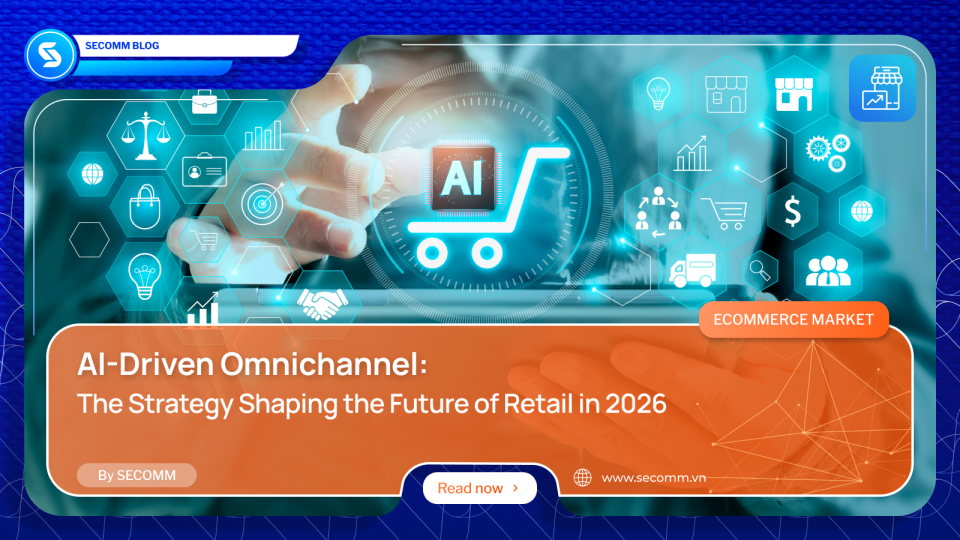
According to research from Omnisend, campaigns that use three or more channels achieve a purchase rate approximately 287% higher than single-channel campaigns. Omnichannel customers also have an average lifetime value around 30% greater than customers who shop through only one channel. In today’s highly competitive landscape, adopting AI in omnichannel retail is no longer a “nice-to-have” but a “must-have”.
This article explores how AI-driven omnichannel strategies are revolutionizing the retail landscape, offering businesses new ways to leverage technology for long-term, sustainable growth
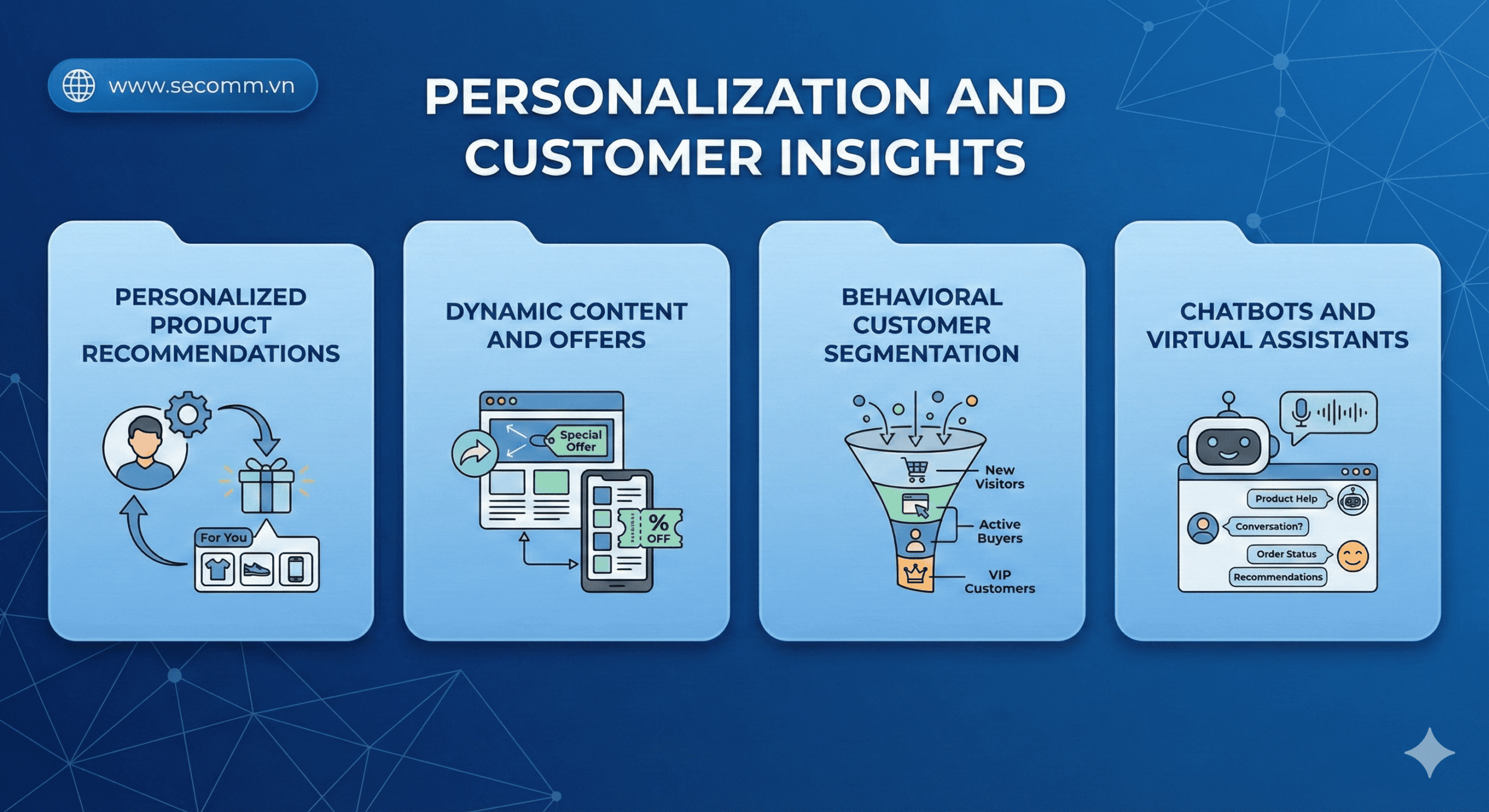
AI enables retailers to deliver personalized experiences by leveraging customer data from multiple sources. With machine learning (ML) algorithms, businesses can analyze browsing behavior, purchase history, and even social media interactions to build a comprehensive customer profile. This profile is then used to power product recommendations, services, and content tailored to each individual. Key AI applications in personalization and customer intelligence include:
AI-driven recommendation engines analyze data across all channels to suggest the most relevant products to each customer, thereby increasing conversion rates. For instance, when a shopper searches for a product on a mobile app, AI algorithms can recommend related items based on their purchase history and browsing behavior across platforms. Around 80% of consumers are willing to buy more from brands that offer a personalized experience.
With AI, retailers can trigger timely promotions for the right customer segments. If a shopper views a product on the website but leaves without purchasing, AI can automatically send a personalized discount code via email or mobile push notification to encourage them to return and complete the order. This approach boosts engagement and significantly reduces cart abandonment.
AI supports behavioral segmentation, allowing retailers to cluster customers based on how they shop and interact with the brand. Frequent shoppers can be rewarded with VIP privileges, while low-frequency customers can be targeted with limited-time offers designed to re-engage them and increase purchase frequency.
AI-powered chatbots deliver personalized support by accessing customer profiles, order history, and browsing activity. Operating 24/7, chatbots can handle FAQs, assist with product discovery, and even cross-sell or upsell complementary items to increase average order value. A survey from PwC indicates that roughly 87% of consumers believe AI has improved their shopping experience, and 73% are willing to use AI chatbots for customer service during their purchase journey.
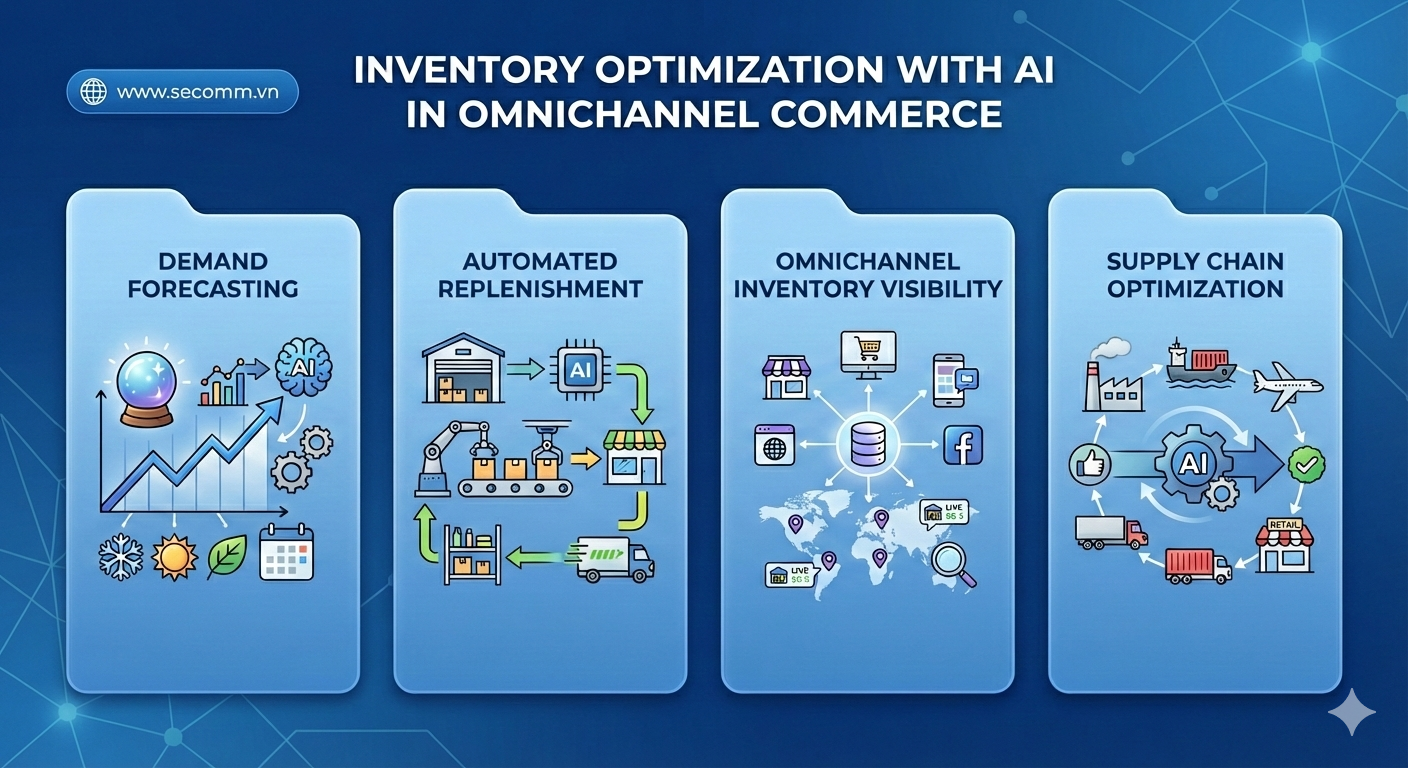
Inventory management in a traditional omnichannel environment is complex and often leads to stockouts or overstock. AI-powered inventory management systems streamline this process, enabling retailers to maintain optimal stock levels across all channels.
AI can forecast future demand by analyzing historical sales data, current trends, and external factors such as seasonality. With more accurate demand forecasting, retailers can avoid both out-of-stock situations and excess inventory, reducing markdowns and storage costs. Studies show that AI-driven demand forecasting can reduce forecast error by up to 30%.
Leveraging predictive analytics, AI can automate replenishment orders so that best-selling products are always available while minimizing the risk of dead stock. AI can also detect regional demand differences, allowing businesses to fine-tune inventory levels at each store. This creates a more responsive supply chain and can reduce stockout events by up to 40%.
AI provides real-time inventory visibility across all channels: online, in-store, and warehouse. Customers benefit from accurate stock information, while retailers can confidently implement services such as “Buy Online, Pick Up In-Store” (BOPIS) without operational friction. This level of visibility also supports more efficient inventory allocation, especially during peak demand periods.
AI-driven supply chain analytics help retailers optimize logistics and distribution. Algorithms can determine the most efficient delivery routes, streamline warehouse operations, and predict potential disruptions. This is particularly critical for retailers offering same-day or next-day delivery, where AI can identify the fastest and most cost-effective path from fulfillment centers to customers.
Read more: What is eCommerce Integration? Foundation of eCommerce Automation
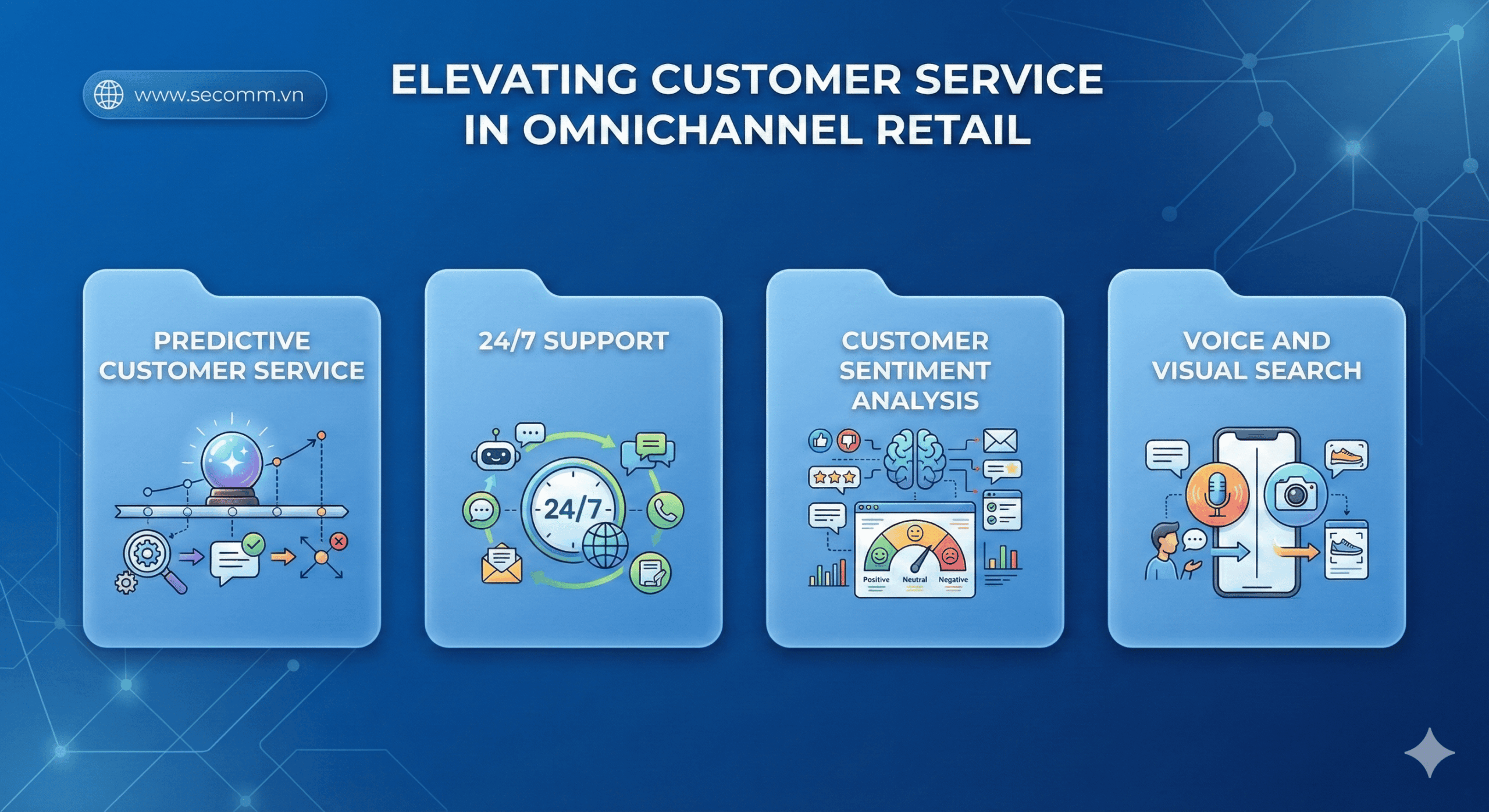
Customer service is a core component of the omnichannel experience, and AI is redefining how retailers engage with shoppers across touchpoints. From virtual assistants to AI-powered analytics, these tools ensure every interaction is more efficient and more relevant.
AI can anticipate support needs before customers submit a ticket. For example, if a customer repeatedly returns a specific product, AI can flag this pattern and alert the customer service team to proactively reach out. This level of predictive service helps reduce churn and strengthens brand loyalty.
AI-powered chatbots and virtual assistants provide round-the-clock support across all channels, reducing waiting times and enhancing customer satisfaction. These virtual agents can handle routine inquiries, track orders, and assist with returns, freeing human agents to focus on complex, high-value interactions.
AI-based sentiment analysis tools allow retailers to monitor customer satisfaction by analyzing feedback across social media, email, and support tickets. The technology can detect negative sentiment in real time, enabling teams to take immediate corrective action to protect the customer experience.
With AI, retailers can offer voice search, allowing customers to find products without typing, which is especially impactful on mobile. Visual search lets shoppers upload images to discover similar items, delivering a more intuitive and convenient product discovery experience aligned with modern consumer behavior.
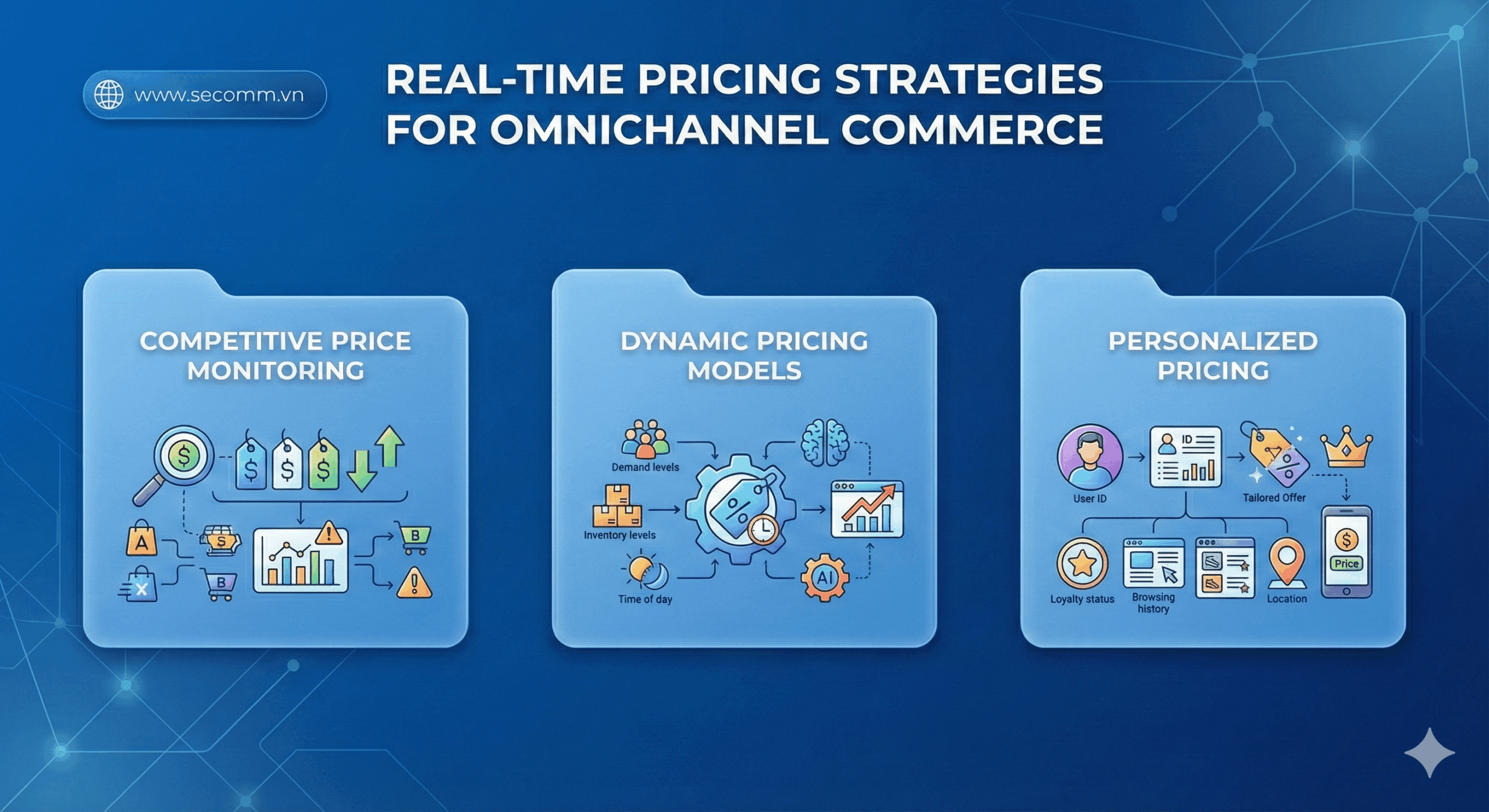
Dynamic pricing is another powerful AI use case, allowing retailers to adjust prices in real time based on demand, competition, and other market variables. This is particularly important for omnichannel retail, where price consistency and responsiveness are critical to customer trust.
AI algorithms can continuously monitor competitors’ prices and adjust a retailer’s prices accordingly, helping maintain competitiveness while protecting margins. This is essential in an environment where customers can compare prices across platforms within seconds.
By leveraging historical sales data, seasonal trends, and customer behavior, AI models can determine optimal price points to maximize both revenue and profit. For instance, AI can increase prices during peak demand periods or trigger markdowns for slow-moving inventory to accelerate sell-through.
Personalized pricing focuses on offering individual discounts or loyalty incentives based on each customer’s shopping behavior. By analyzing purchase frequency, loyalty, and spending patterns, AI can generate tailored offers that drive engagement and increase customer lifetime value.
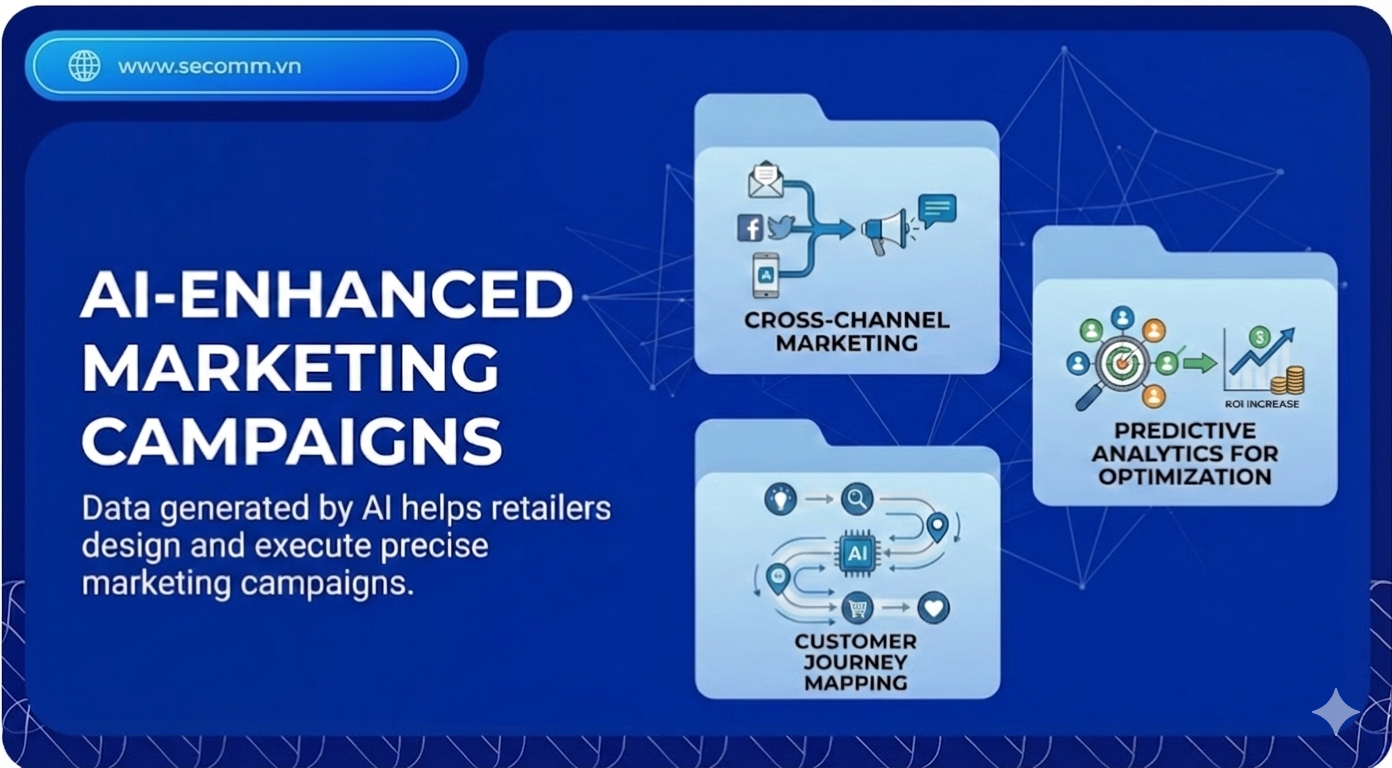
AI-generated insights empower retailers to design and execute more precise marketing campaigns, ensuring they reach the right customers at the right time. Multichannel data analysis makes marketing strategies more targeted and more efficient.
AI enables retailers to orchestrate integrated omnichannel marketing campaigns that reach customers via email, social media, mobile apps, and other digital touchpoints. This integration ensures consistent messaging, regardless of where customers interact with the brand.
Predictive analytics can identify which customer segments are most likely to respond to a given promotion, allowing marketers to optimize budget allocation. Campaigns can be adjusted in real time based on performance metrics, increasing ROI and engagement rates.
With AI, retailers can build detailed customer journey maps to understand how each touchpoint influences purchase decisions. This data supports hyper-targeted marketing at every stage-from awareness and consideration to conversion-enabling businesses to design strategies aligned with customer needs at each step.
While AI offers transformative advantages for Omnichannel retail, practical implementation remains fraught with strategic hurdles. To fully harness the potential of this technology, enterprises must identify and resolve four core challenges:
Faced with complex operational and data architecture challenges, businesses require a partner with proven technical expertise. With extensive experience in deploying complex eCommerce systems, SECOMM stands as a reliable partner, helping enterprises mitigate technical risks, optimize costs, and accelerate time-to-market.
Read more: Strategies for Applying AI in eCommerce to Enhance Operational Efficiency and Sales
AI is transforming omnichannel retail by enabling seamless integration across all customer touchpoints, from personalized recommendations to intelligent inventory management. As retailers continue to innovate, AI-driven omnichannel strategies will sit at the heart of superior shopping experiences, stronger brand loyalty, and sustainable profitability.
Are you ready for a new wave of retail transformation in 2026? With more than 10 years of experience delivering specialized eCommerce solutions for leading enterprises in Vietnam and overseas markets, SECOMM is ready to partner with you to build a secure, scalable, and high-performing omnichannel ecosystem.
Contact SECOMM today for tailored omnichannel consulting that aligns with your business model and long-term growth strategy.
 50
50
 5,729
5,729
 0
0
 20
20
Vietnam’s eCommerce market is growing rapidly, driven by the rising demand for digitalization and automation among both local and international businesses. Along with this trend, many Vietnamese eCommerce Development companies have emerged as strategic partners in eCommerce platform development, offering end-to-end solutions from consulting and system development to operations and marketing. Below is a list of the top 10 leading eCommerce solution providers in Vietnam for 2025.

SECOMM is a full-service provider of eCommerce solutions, developing bespoke suits that work in any complex system. With deep expertise across B2B and B2C sectors, SECOMM helps brands build scalable, conversion-focused platforms on Magento, Shopify, Headless Commerce, and more. Their services deliver full-circle ecommerce solutions from initial consulting to complete product deployment.
What sets SECOMM apart is their commitment to agile execution, dedicated development teams, and a strong client-centric approach. Trusted by leading enterprises like Changi Airport Group, Vinamilk, Annam Group, Landnow, Suzuverse, My Market,… which across Vietnam, Singapore, Australia, and beyond.
Key Services:

Kyanon Digital a digital transformation solution consulting and implementation company, especially solutions related to e-commerce and omnichannel experience platform. With an experienced team, Kyanon Digital is gradually becoming a reliable tech partner of many large retail corporations in the region from consulting on digital transformation models, choosing and implementing appropriate technology solutions to e-commerce logistics operations. In addition, Kyanon Digital is also chosen to be a strategic partner of many international technology companies in the same field.
Key services:

Magenest is one of Vietnam’s most recognized eCommerce solution providers, focusing on digital transformation and enterprise integration. As an official Adobe (Magento) and Odoo partner, Magenest helps global brands build scalable, secure, and data-driven eCommerce systems. Magenest stands out for its holistic approach, bridging the gap between technology, operations, and marketing for medium to large enterprises.
Key Services:

BSS Commerce is a powerhouse in the Magento ecosystem, offering a full suite of B2B extensions, custom development, and integration services. With years of experience serving international clients, BSS Commerce is known for delivering highly functional and scalable B2B commerce systems. Their B2B suite for Magento is widely adopted by enterprises seeking to enhance their online business workflows and customer experience.
Key Services:
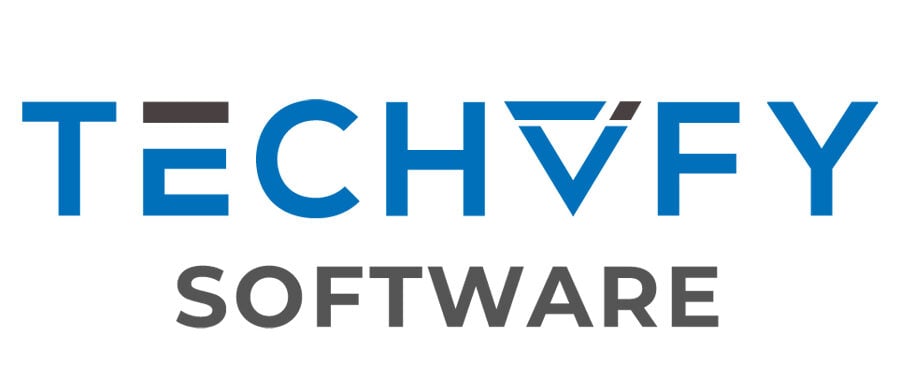
TECHVIFY Software is a rapidly growing software development company providing custom eCommerce, web, and mobile solutions for global clients. Their strength lies in combining cutting-edge technologies with an agile development approach. TECHVIFY’s solutions are tailored for scalability, enabling businesses to optimize efficiency while enhancing user engagement.
Key Services:

Part of CMC Corporation, one of Vietnam’s largest IT groups, CMC Software Solution provides enterprise-grade digital transformation and eCommerce services. Their expertise covers complex system integration and high-level cybersecurity. CMC’s ability to integrate technology into large organizations makes them a preferred partner for enterprises transitioning into digital commerce.
Key Services:

Founded in 2006, SmartOSC is an award-winning eCommerce agency with a global presence across Asia, Europe, and the U.S. They provide comprehensive digital commerce services that help brands scale internationally. SmartOSC is trusted by major global brands for its technical excellence, customer-centric approach, and strategic execution.
Key Services:

OnPoint is Vietnam’s leading eCommerce enabler, helping brands manage and grow their online presence across multiple marketplaces and platforms. Unlike pure tech developers, OnPoint provides full eCommerce operation services tailored for B2B and B2C brands. With a strong local market presence, OnPoint enables global and domestic brands to succeed in Vietnam’s fast-growing eCommerce landscape.
Key Services:
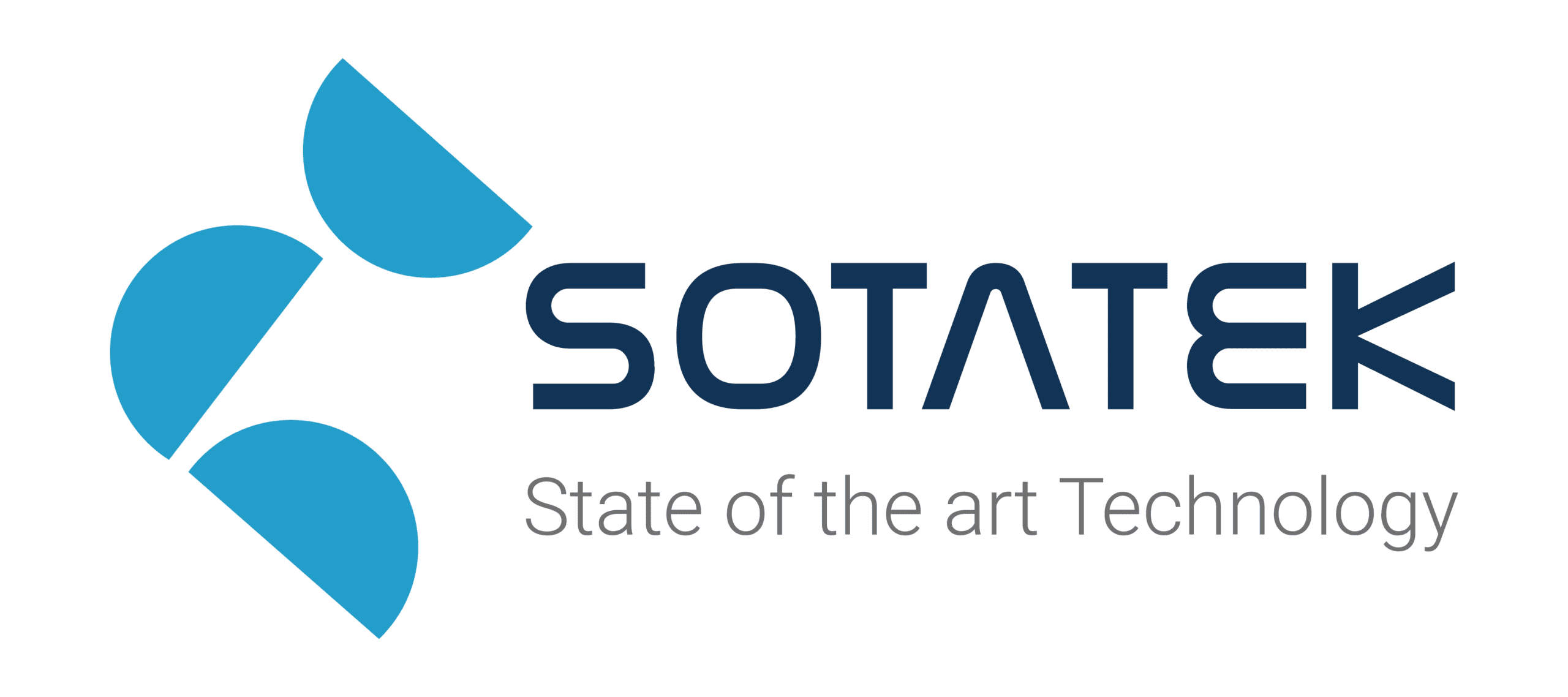
SotaTek is a global software development company offering blockchain, web, and eCommerce solutions. Their development team delivers tailored B2B commerce platforms powered by modern technologies. SotaTek’s versatility and deep tech expertise make it a solid partner for businesses looking to build advanced, future-ready eCommerce ecosystems.
Key Services:

Tigren is a specialized Magento development company with extensive experience in B2B and B2C eCommerce solutions. Known for its cost-effective and high-quality services, Tigren caters to clients worldwide. Tigren’s focus on performance and usability makes it ideal for businesses seeking reliable and affordable Magento-based eCommerce solutions.
Key Services:
Vietnam’s eCommerce industry is entering a booming phase, marked by the rise of reputable technology companies with international standards. Companies like SECOMM, SmartOSC, Magenest, BSS Commerce, TECHVIFY, and Kyanon Digital not only empower businesses to build robust eCommerce platforms but also accompany them on their journey of digital transformation, market expansion, and customer experience enhancement.
If your business is looking to develop a fully optimized eCommerce system tailored to your needs, don’t hesitate to contact SECOMM, our team is always ready to support you every step of the way.
 2
2
 1,296
1,296
 0
0
 1
1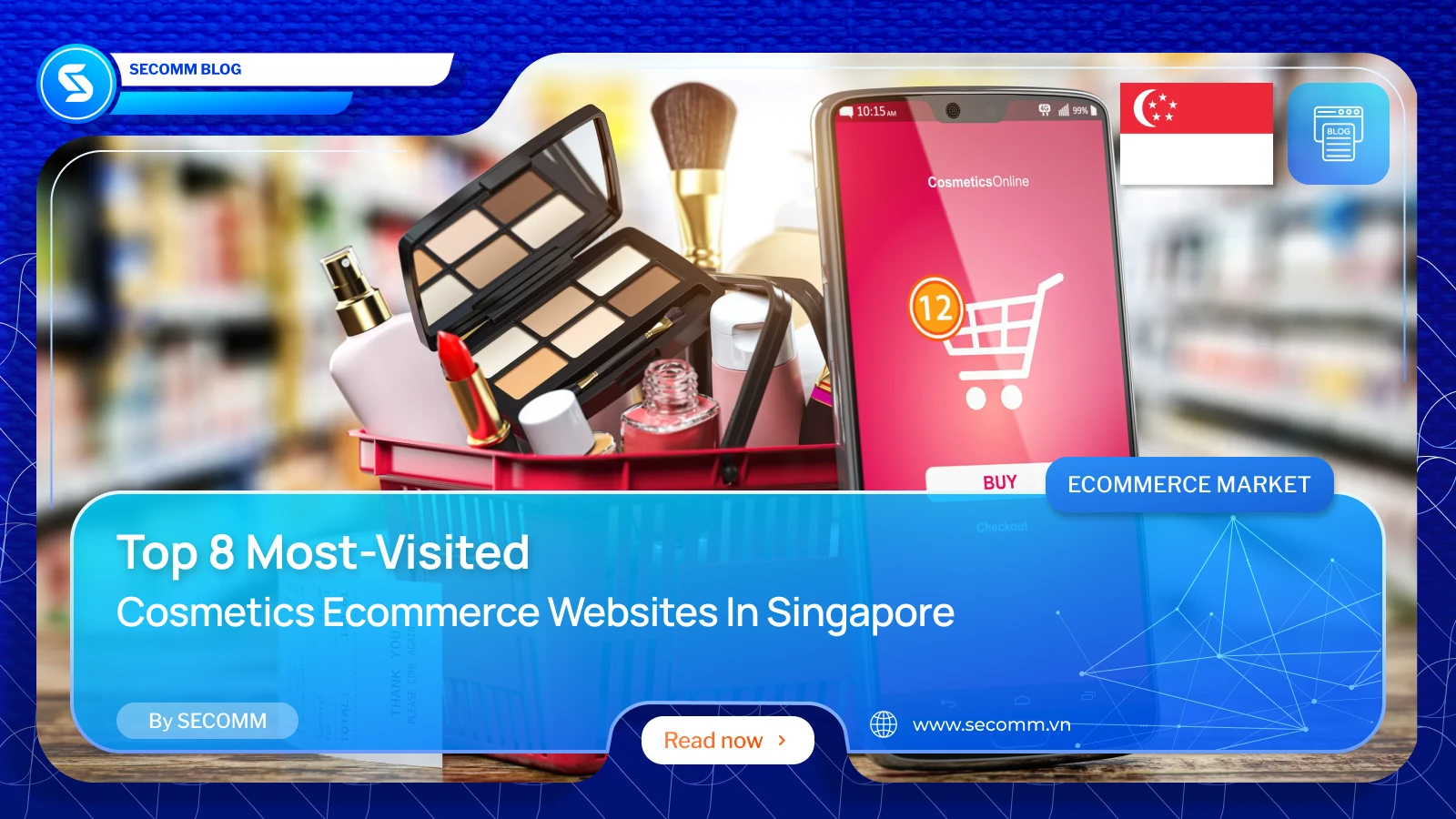
The cosmetics eCommerce industry in Singapore is witnessing explosive growth and continuous innovation, becoming one of the most promising and dynamic markets in the Southeast Asia region. With the increasing demand for beauty and personal care products from consumers, coupled with support from advanced technology and digital infrastructure, online cosmetics businesses in Singapore have been seizing opportunities to expand market share and enhance customer experiences.
Below are cosmetics 8 eCommerce websites trusted by Singaporean consumers for shopping.
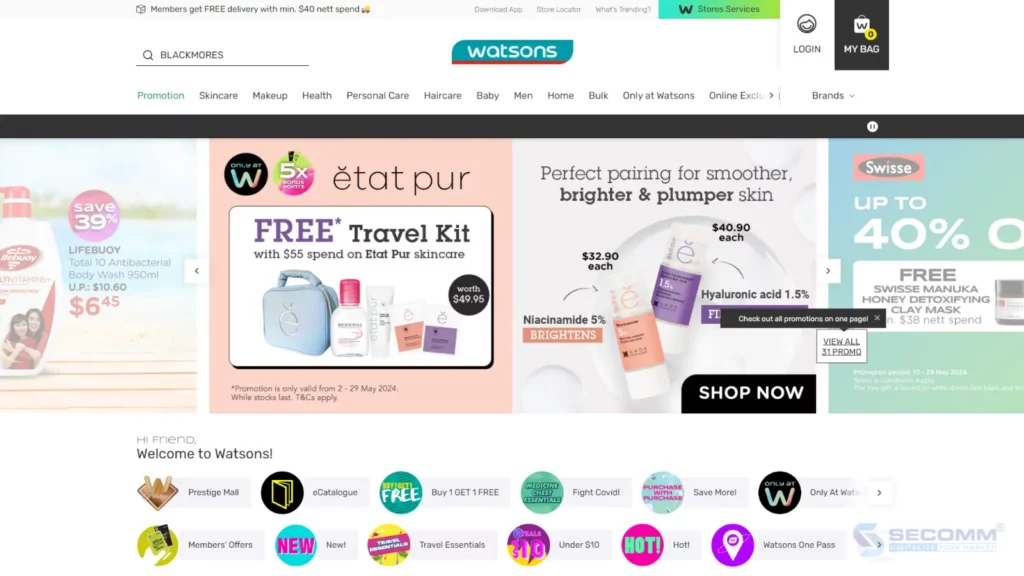
The cosmetics and healthcare retail chain Watsons has gained fame across Asia, and Singapore is no exception. As a member of the A.S. Watson Group, Watsons has solidified its position with thousands of stores worldwide and a robust eCommerce website.
Watsons Singapore is renowned for its extensive product portfolio, ranging from cosmetics and skincare to haircare and healthcare products. The eCommerce website of Watsons Singapore is built on the SAP Commerce Cloud platform, providing customers with a smooth and diverse shopping experience. Search, product filtering, and cart features are optimized and customized, while encouraging customers to create accounts to enjoy exclusive benefits. This helps track and measure customer behavior on the website, leading to the most effective sales and marketing strategies.
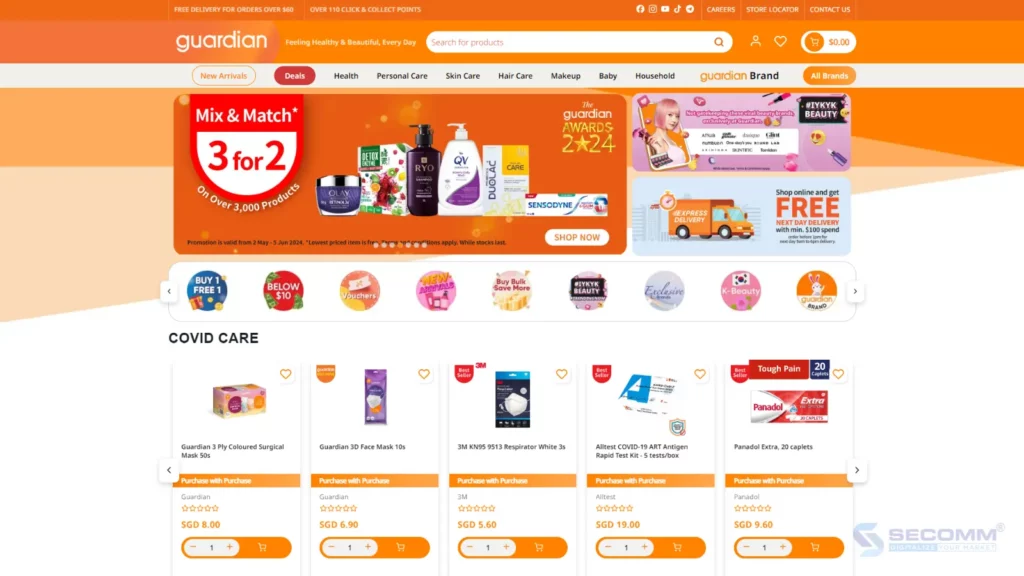
Guardian is a retail chain specializing in healthcare, cosmetics, and other consumer products. Guardian has a presence in many countries and regions worldwide, including Singapore, offering a range of products from renowned and reliable brands.
The eCommerce website of Guardian is built on the SAP Commerce Cloud platform, providing many useful features for users. Customers can easily search for and purchase products, manage their shopping carts, and make convenient payments. Additionally, the website offers promotions and online support services to help customers have a comfortable and secure online shopping experience. Furthermore, customers can also review and provide feedback on products, providing useful information for other users.
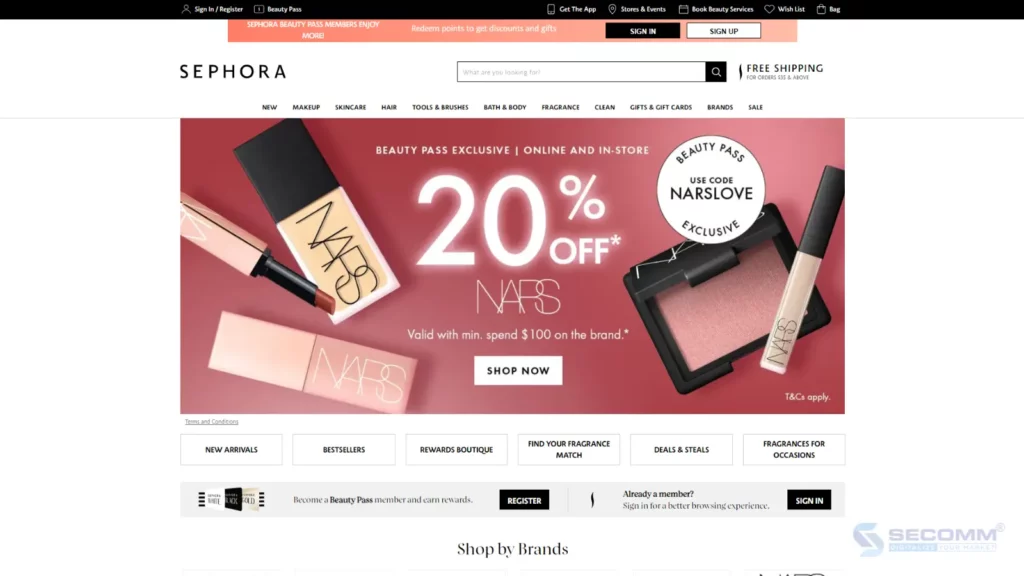
Similar to Guardian, Sephora is a global retail chain specializing in cosmetics and beauty, known for offering a variety of beauty products from leading brands worldwide. Currently, Sephora has a presence in the Singapore market with physical stores in major shopping centers and an eCommerce system, including a website and app for customers. Sephora is loved for its product diversity, customer care services, and innovation in the online cosmetics shopping experience.
Sephora’s eCommerce system in Singapore is built on Vue.js and Nuxt.js programming languages. With this system, Sephora’s customers can quickly search for and explore products through smart search bars and diverse filters. The online shopping experience is optimized with detailed product information, crisp images, and customer reviews.
The Sephora app is also highly regarded, making shopping easier for customers with features like “Virtual Artist” and receiving notifications about promotions. Overall, Sephora provides a range of features and services to meet customers’ cosmetics shopping needs, creating a professional and convenient online shopping experience.
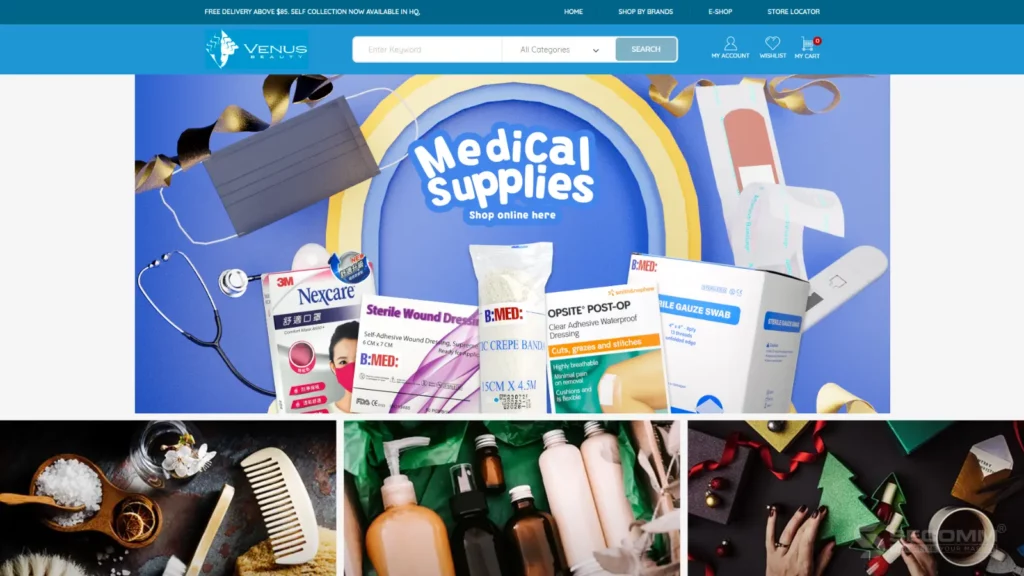
Venus Beauty is one of the retail chains for cosmetics and personal care present in most shopping centers across Singapore, beloved for its product diversity and quality. Since its establishment in 2002, Venus Beauty has continuously grown and expanded, becoming a familiar destination for many local consumers.
The eCommerce website of Venus Beauty is built and developed on the Magento platform, with superior customization and scalability. Customers can easily search for and purchase products thanks to the intuitive and user-friendly website interface. Venus Beauty also regularly offers attractive promotional programs to attract customers to shop more on the website and app.
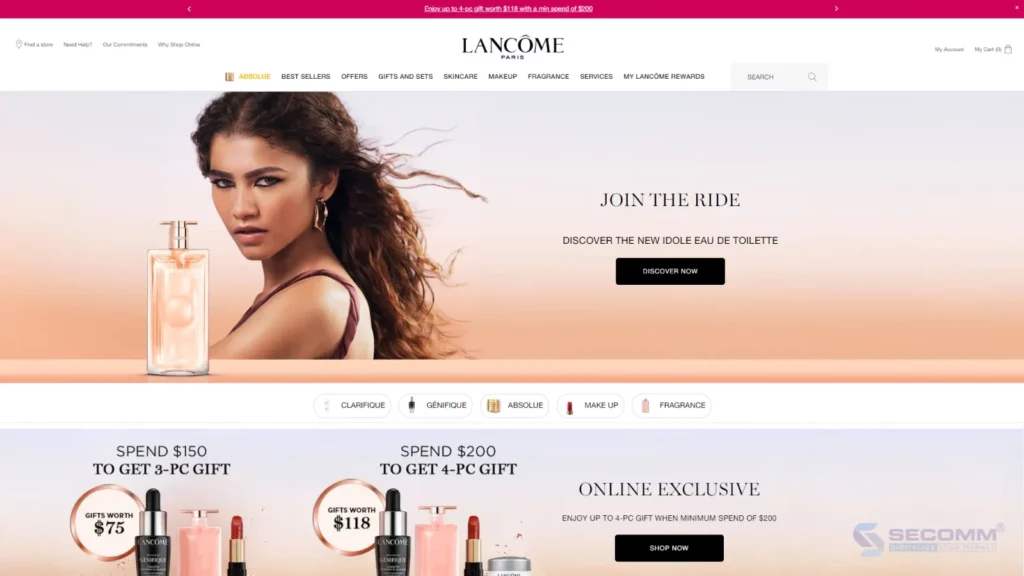
Lancôme Singapore is the branch of the renowned cosmetics brand Lancôme, part of the globally famous L’Oréal Group. Lancôme is known for its high-quality skincare products, makeup, and fragrances, always endorsed by beauty experts and celebrities. In Singapore, Lancôme not only offers premium products suitable for various skin types but also provides optimal online shopping experiences for customers.
The Lancôme website is developed on the Salesforce Commerce Cloud infrastructure with a user-friendly interface, allowing customers to browse, search, view products, and make purchases easily and quickly. The website also integrates AR technology to provide a “Virtual Try-On” experience, allowing customers to try on lipsticks, eyeshadows, and other products realistically before making purchasing decisions.

Cocomo is an eCommerce website specializing in beauty and personal care products from Korean brands. Cocomo boasts a rich product portfolio, including cosmetics, skincare products, haircare, and various other beauty items, catering to all customer beauty needs.
The Shopify website of Cocomo Singapore is designed with a clear, intuitive interface, making it easy for users to search for and select products. Product categories are organized logically, along with efficient search tools, making shopping quick and convenient. Cocomo frequently offers promotions, discounts, and special deals, helping customers save money. These promotional offers are regularly updated and can be easily found on the homepage or product category pages.

In Singapore, the skincare brand Paula’s Choice is just as renowned as in other markets. Founded by skincare expert Paula Begoun, the brand is famous for its science-backed skincare products, known to be safe and effective, free from harmful ingredients like fragrances or dyes.
Paula’s Choice eCommerce website is built on Shopify Plus. The website offers a range of skincare products, including cleansers, toners, serums, moisturizers, sunscreens, and specialized treatments like BHA, AHA, and retinol. These products cater to all skin types, from oily, dry, sensitive, acne-prone to aging skin. Each product on the website comes with detailed descriptions of ingredients, usage instructions, benefits, and supporting scientific research.
Paula’s Choice Singapore regularly runs discount programs, bundled gifts, and special offers for customers. Additionally, customers can easily access support from the customer service team via hotline, email, or live chat.
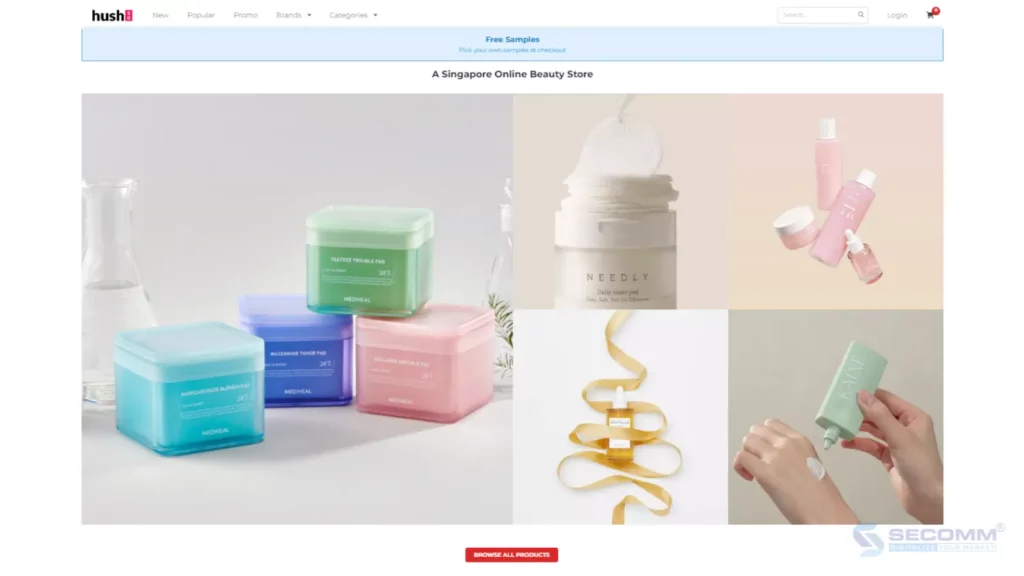
Hush is a familiar destination for Singaporean consumers when they need to shop for cosmetics online. This retail giant specializes in providing beauty and personal care products from various leading brands worldwide such as Laneige, Aveeno, Bioderma, CeraVe, and more.
The Hush website is designed to be simple, modern, and user-friendly. Customers can easily search and browse through products thanks to clear categories and efficient search tools. Additionally, customers can make payments by registering an account or as a guest. Hush also offers fast and free delivery services, allowing customers to track their orders and estimated delivery times.
Lời kết
In summary, the cosmetics eCommerce industry in Singapore has seen significant growth over the years with the presence of many reputable and well-known names. From international brands like Watsons, Lancôme, and Paula’s Choice to local eCommerce platforms like Cocomo and Hush, consumers have countless options to search for and purchase high-quality beauty and personal care products. Each website offers unique and convenient shopping experiences, catering to the increasingly diverse needs of customers.
Hopefully, the list above will help motivate many other beauty businesses to confidently build their own eCommerce websites.
Need more in-depth advice? Contact SECOMM today!
 2
2
 3,965
3,965
 0
0
 1
1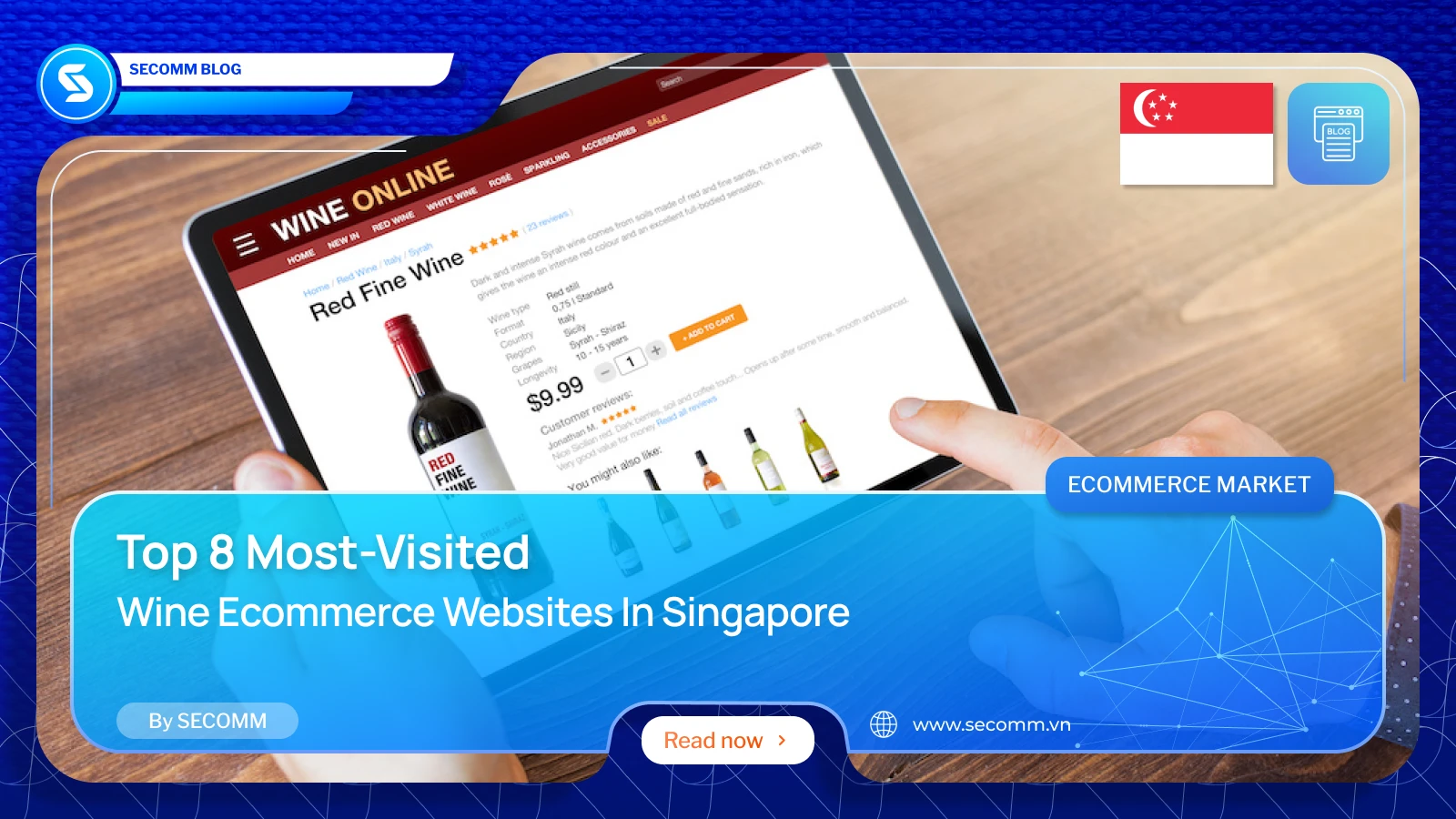
The wine eCommerce industry in Singapore is thriving, offering a wide variety of choices for consumers who appreciate fine wines and spirits from around the world. With the convenience and diversity of eCommerce websites, purchasing wine online has become easier than ever.
The following article introduces 8 leading wine eCommerce websites in Singapore, known as popular shopping destinations for modern consumers.
Paneco is one of the most beloved wine eCommerce sites in Singapore, renowned for its product quality, delivery service, and customer care. Established with the aim of providing a convenient and reliable online shopping experience, Paneco offers a rich catalog ranging from wines and spirits to specialty beers and sake.
Focusing on customer experience, Paneco chose the Spree Open Source platform to build its eCommerce website, allowing for customization and scalability. Features such as inventory display, product variations, combo purchases, and bulk buying have been optimized for customization. Paneco also implemented a loyalty program, enabling customers to register as members, earn points from purchases, and enjoy exclusive prices.
Cellarbration is an ideal destination in Singapore for wine and alcohol enthusiasts. This brand boasts an extensive collection of wines and alcoholic beverages from a wide variety of leading global brands.
Shopping on Cellarbration’s eCommerce website is highly optimized through the power of the Magento platform. Every aspect, from search functions and product browsing to checkout, is deeply customized to ensure an engaging shopping experience for customers.
Cellarbration is distinguished not only by its wide range of products but also by its professional and dedicated customer service. The brand is committed to customer satisfaction by offering personalized support and a variety of payment and delivery options.
The Liquor Shop is one of the prominent brands in the wine ommerce sector in Singapore, known for its richness and variety of high-quality imported liquors. With a mission to bring customers the finest liquor products from around the world, The Liquor Shop offers a range of options, from wines, whiskies, rums, and tequilas to unique beers and sojus.
This retailer’s liquor website is built on the infrastructure of Shopify Plus, allowing for easy customization of many features such as age verification, quick purchase, product search suggestions, and upselling prompts. Additionally, Shopify Plus’ flexible system enables integration with a range of popular payment methods such as Apple Pay, Google Pay, PayPal, Visa/MasterCard.
In Singapore, the Wine Connection brand is a favorite destination for wine enthusiasts looking to explore premium wines from the most famous wine regions worldwide. Wine Connection also offers customers a rich and diverse collection of wines.
Wine Connection’s Magento website is optimized for an enhanced experience, allowing customers to search for wines by origin, grape variety, and explore special collections, as well as choose preferred payment and delivery methods.
Not only does Wine Connection provide a modern and engaging online shopping space, but it also serves as a source of wine knowledge. Customers can find articles and detailed guides on selecting and enjoying wines to better understand the art and science behind the exquisite flavors.
Founded in 1983, Millesima is a reputable brand in the global retail wine industry, particularly renowned for its specialization in premium wines. Originating from France, Millesima has expanded its operations to many countries, including Singapore, to provide consumers with the opportunity to experience high-quality wines from renowned vineyards worldwide.
Millesima’s strength lies in its meticulous selection of wine products, ensuring high quality and clear origins. The product portfolio of Millesima includes wines from Bordeaux, Burgundy, Champagne, and many other famous wine-producing regions. Customers can find classic wines, limited editions, and even internationally award-winning bottles.
Millesima’s eCommerce wine website is elegantly designed and user-friendly, making it easy for buyers to search for detailed information about products and place orders online. Additionally, Millesima offers professional advisory services to help customers select wines that suit their preferences and needs.
Wine Fridge Singapore is a prominent brand in providing wine cabinets and related products for wine storage in Singapore. Known for professionalism and high quality, Wine Fridge Singapore specializes in offering wine cabinets from renowned brands, ensuring the ideal conditions for wine storage.
The strength of Wine Fridge Singapore lies not only in providing quality products but also in professional customer advisory and support services. They understand the needs of wine enthusiasts and collectors, providing suitable storage solutions to maintain the flavor and quality of wine over time.
The website of Wine Fridge Singapore provides detailed information about various wine cabinets, from small-capacity cabinets for personal needs to large cabinets for extensive wine collections. Some customized features include product comparisons, selecting products by size and color, quick payments with Shop Pay or Google Pay, etc.
The Wine Wholesales brand is known as a destination for purchasing high-quality wines, wine cabinets, and related accessories at attractive wholesale prices. This brand has built its reputation through product diversity and quality services, aiming to provide customers with smooth and convenient online wine shopping experiences.
The eCommerce website of Wine Wholesales is user-friendly, making it easy to search for and select products. Customers can easily find detailed information about each wine, including origin, flavor profile, and reviews from previous buyers. Additionally, Wine Wholesales regularly offers promotions and discounts, allowing consumers to purchase quality products at affordable prices.
This is a prominent name in the retail wine sector in Singapore, specializing in providing premium wines from around the world. Wines Online’s strength lies in its product diversity, ranging from wines and spirits to soju and sake, especially low-alcohol or non-alcoholic beverages.
Wines Online’s eCommerce website is built on Shopify, featuring an intuitive interface that allows customers to easily search for and select products. Wines Online Singapore is also known for its fast and reliable delivery service. They ensure that products are delivered to customers safely and on time. Additionally, Wines Online’s advisory team is always available to assist customers with any inquiries or requests, ensuring that every customer has the best shopping experience.
Wrap Up!
Here are the 8 most prominent eCommerce wine websites in Singapore. Each brand brings its own unique advantages, from product diversity and service quality to convenient shopping experiences.
Looking for advice on building an eCommerce wine website? Contact SECOMM now!
 2
2
 2,472
2,472
 0
0
 1
1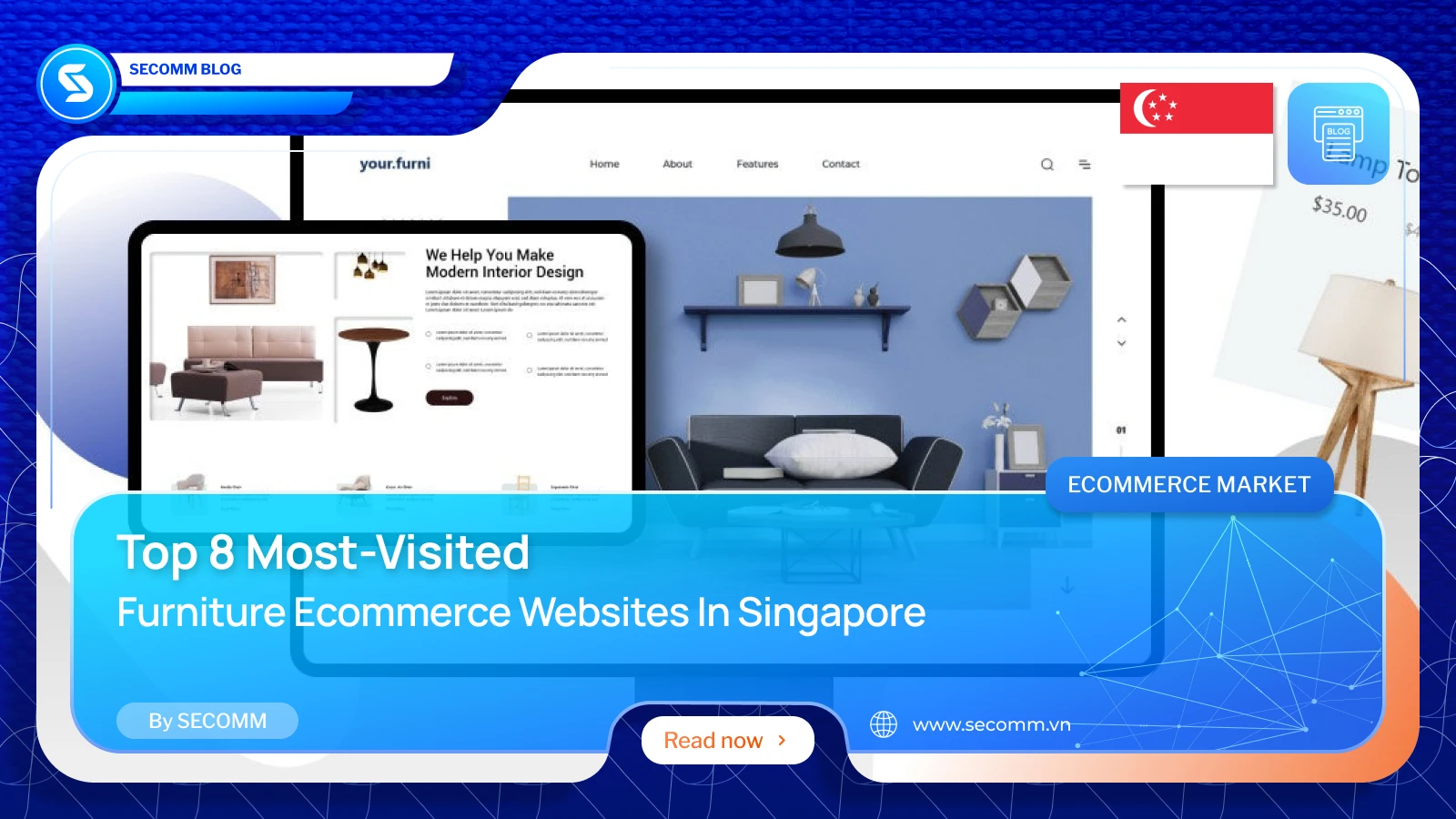
Shopping for furniture through eCommerce platforms has become a defining trend in modern living, particularly in developed nations like Singapore. Online furniture shopping offers not just convenience but also gives consumers to a diverse range of styles and price points.
The following article introduces the top 10 furniture eCommerce websites in Singapore, where you can find inspiration to develop your own similar website.
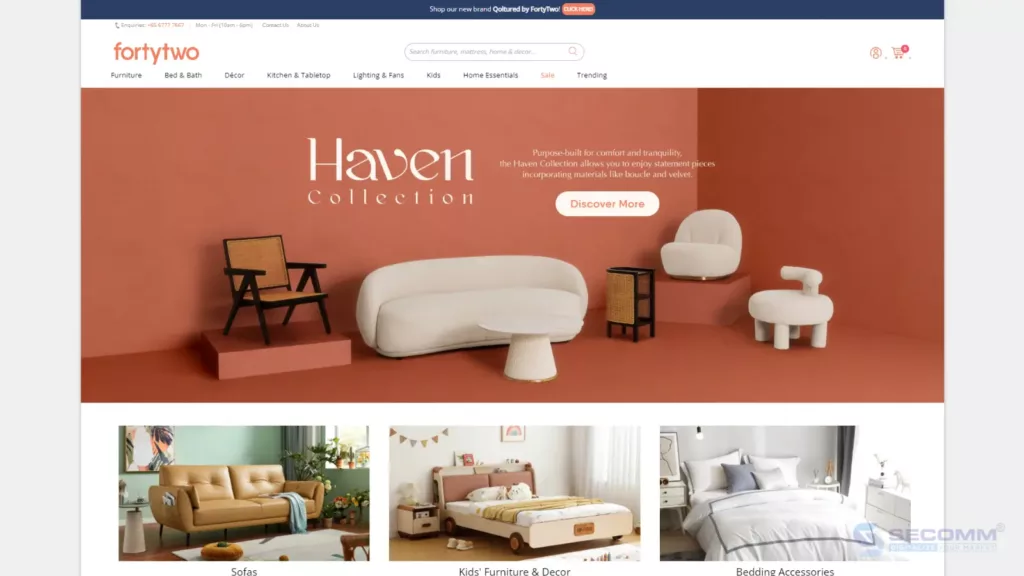
FortyTwo is a furniture and home goods brand, established in 2007 in Singapore. FortyTwo offers a wide range of products from bedroom furniture, living room sets, kitchenware to home accessories and interior decor. Renowned for providing quality products at competitive prices, along with fast delivery and attentive customer service, the brand frequently updates and expands its product portfolio to meet diverse customer needs.
FortyTwo’s website is built on the Magento Open Source platform (Adobe Commerce free version). With this eCommerce website, users can easily search and filter products, explore a variety of product categories from furniture to home goods. Additionally, the website offers the capability to integrate enticing promotional tools and customer support, accompanied by fast and secure delivery services.
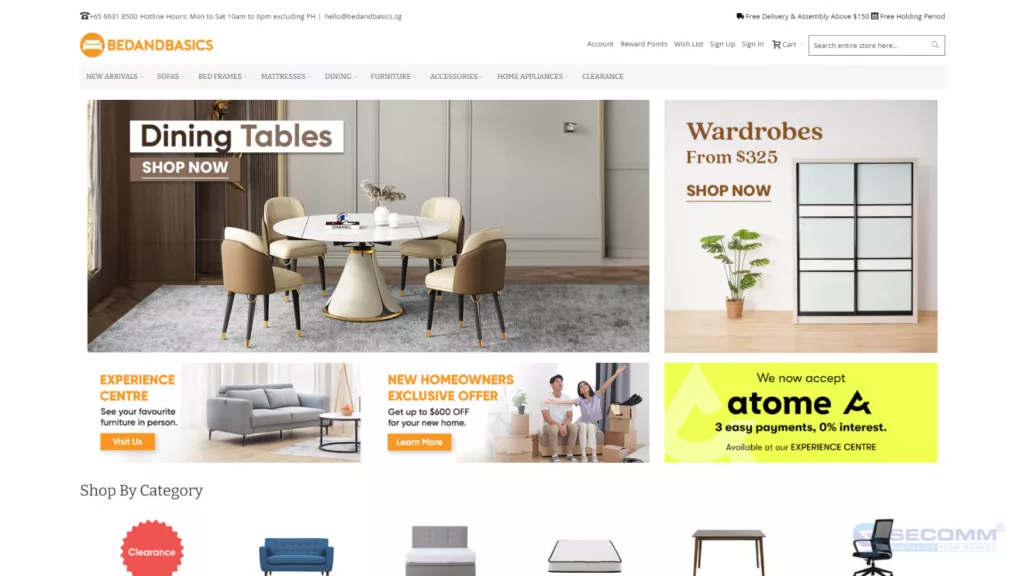
BEDANDBASICS is a leading eCommerce website in Singapore, specializing in providing quality furniture at affordable prices. The BEDANDBASICS website is built on the Magento platform, one of the most popular eCommerce platforms today. This not only enables the website to have high scalability and customization but also ensures stable operational performance and security for online transactions.
Using Magento, this brand can optimize product management, orders, and inventory, while also providing a more engaging shopping experience. The inventory management system automatically updates product quantities in real-time, ensuring that customers are always aware of the stock status of the products. Additionally, the website supports various payment methods, including the buy now, pay later option with Atome.
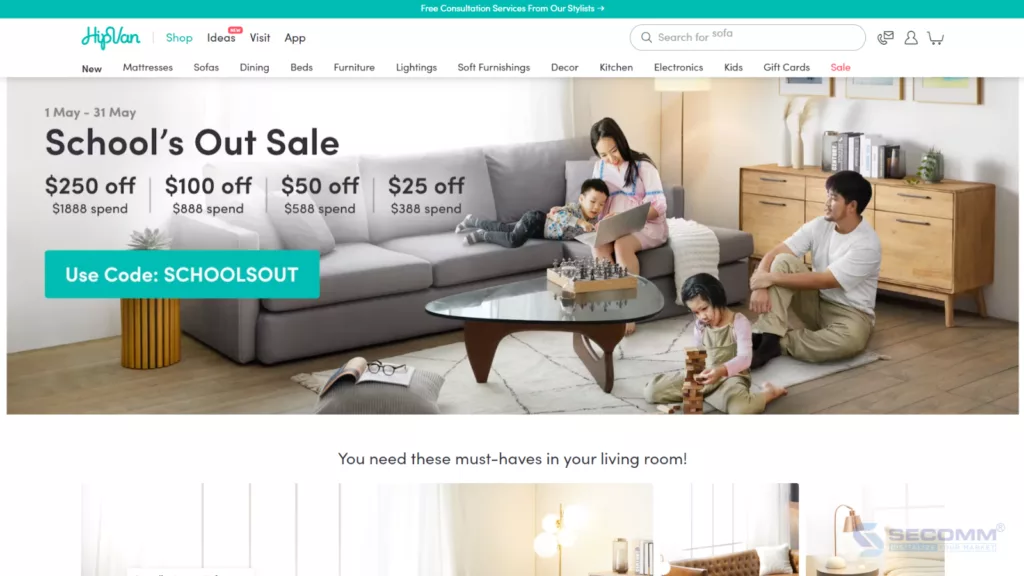
HipVan is an online retail eCommerce website for furniture and home decor based in Singapore. Established in 2013, the brand aims to provide customers with high-quality furniture products at affordable prices, along with convenient shopping experiences and attentive customer service.
HipVan’s furniture eCommerce website is built using the Ruby on Rails and React frameworks, with Ruby as the primary programming language. Prominent features of HipVan include building a community for sharing interior design ideas, image-based product search, and allowing customers to upload images of desired products. Particularly, the augmented reality (AR) feature enables customers to view products in their real-life space before purchasing. Moreover, HipVan offers free interior design planning services, helping customers conveniently ideate and plan their living spaces.
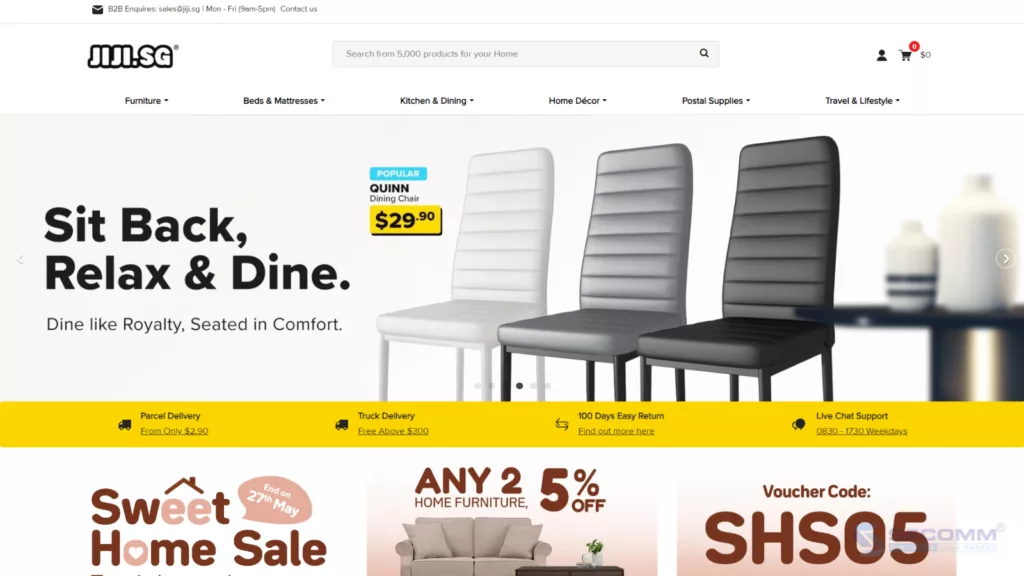
JiJi.SG is one of the favored online shopping destinations for furniture items in Singapore. Here, customers can easily find a diverse range of high-quality products from chairs, beds, sofas to household items such as shelves, cabinets, and towels.
Built on the PrestaShop platform, JiJi.SG’s eCommerce website boasts high flexibility, making it easy to customize and expand to accommodate increasing traffic. The website allows searching and filtering products by size, color, and design, helping customers easily find items that meet their needs. JiJi.SG provides customer support services via live chat, offering a convenient and quick online shopping experience. Additionally, JiJi.SG offers a variety of payment methods, including the PayNow eWallet – one of the popular payment methods in Singapore, providing convenience and peace of mind for customers during transactions.
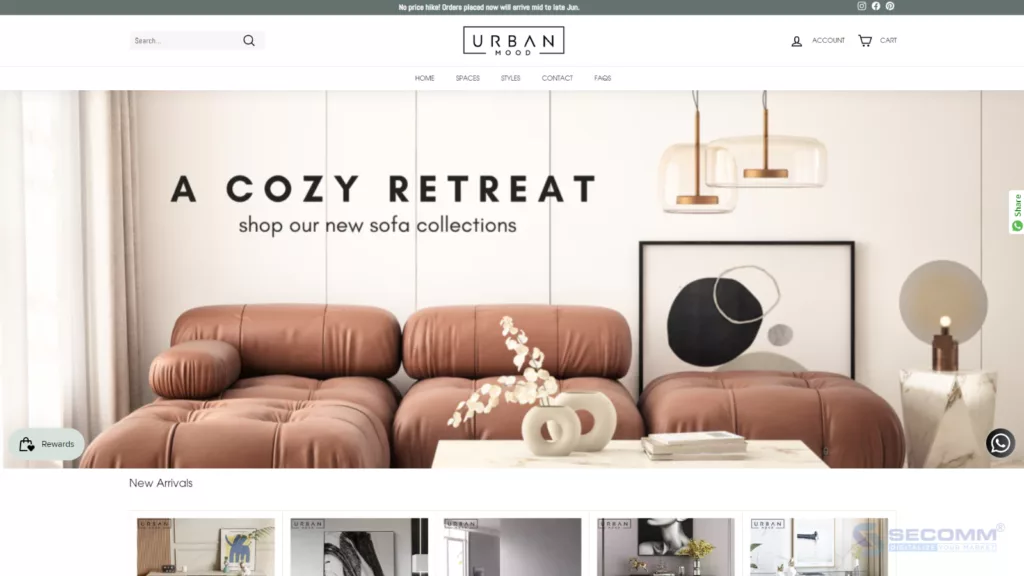
Urban Mood is renowned throughout Singapore and several countries in the Asian region for its finely crafted, high-quality, and contemporary furniture products. Urban Mood’s range extends from living rooms to dining rooms, from bedrooms to kitchens. All are meticulously curated to bring freshness and uniqueness to customers’ living spaces.
Urban Mood has chosen Shopify to build a customized eCommerce website aimed at selling in foreign markets and reaching a broader base of potential customers. Accordingly, Urban Mood has integrated international shipping features and customized currency display to cater to different market needs. Additionally, the brand has integrated ShopBack, allowing customers to experience cashback shopping directly on Urban Mood’s eCommerce website.
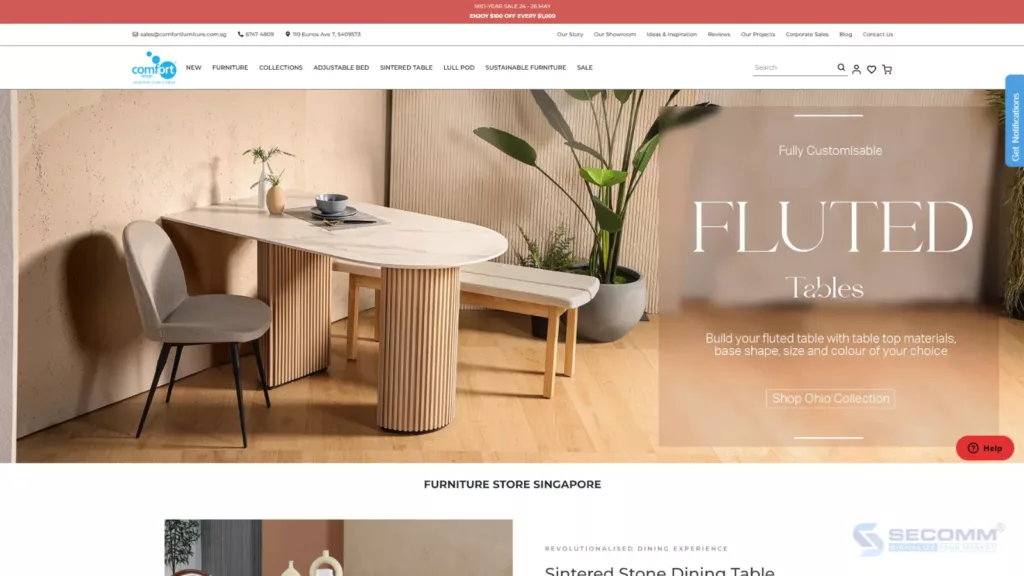
Comfort Furniture is known as one of the leading furniture retail brands in Singapore. With over 20 years of presence in the market, this powerhouse has brought a wide range of quality, aesthetically pleasing products to Singaporean consumers, catering to various styles. Comfort Furniture not only emphasizes product quality but also places special emphasis on customer service. They are committed to providing fast delivery and attentive after-sales support, ensuring that customers’ shopping experiences are always excellent.
Comfort Furniture’s eCommerce website is custom-built to provide an optimal shopping experience. Customers can not only check the inventory of any product but also choose the color and size. Comfort Furniture offers a large color code list and has an experienced team available to advise customers on selecting products and coordinating suitable colors for each space.
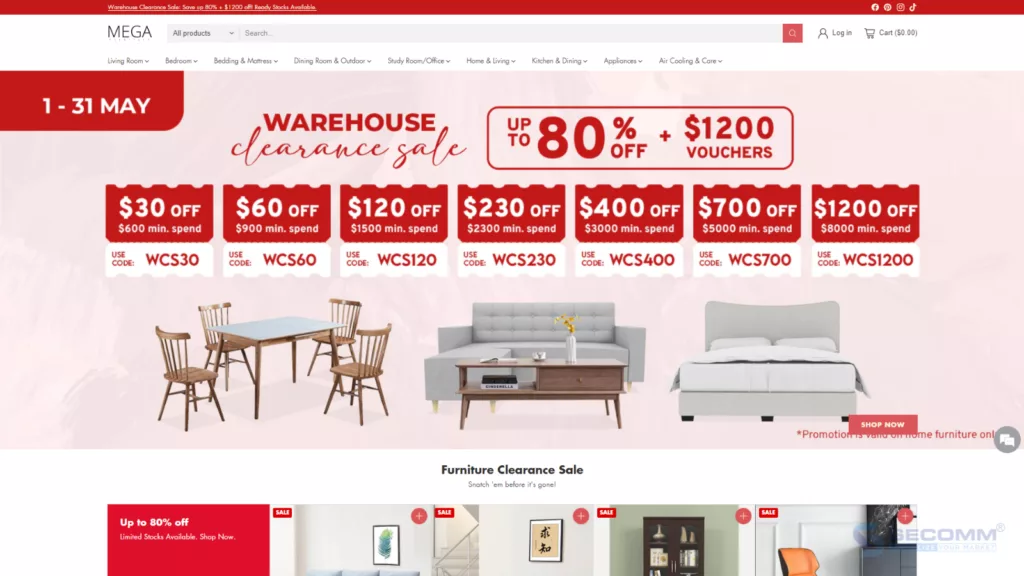
Megafurniture is a leading furniture retail giant in the Singapore market. With a commitment to providing luxurious and convenient living spaces for customers, Megafurniture has become the perfect choice for those seeking creative ideas to design their own unique living spaces.
Megafurniture’s furniture eCommerce website is beautifully designed and optimized on the Shopify Plus platform, with clearly organized categories to help customers easily search, select, and purchase products. Especially, the website also provides detailed information about each product, including images, descriptions, and specifications, helping customers make purchasing decisions more effectively.
Megafurniture allows customers to pay upfront and pay later through flexible payment methods such as Grab and Atome, creating convenient conditions for customers in managing finances and choosing suitable payment methods.
To encourage repeat shopping activities, Megafurniture integrates ShopBack into the Shopify Plus eCommerce system to implement a cashback shopping program. This helps customers receive a portion of cash back after each purchase, increasing the competitiveness and attractiveness of shopping at Megafurniture.
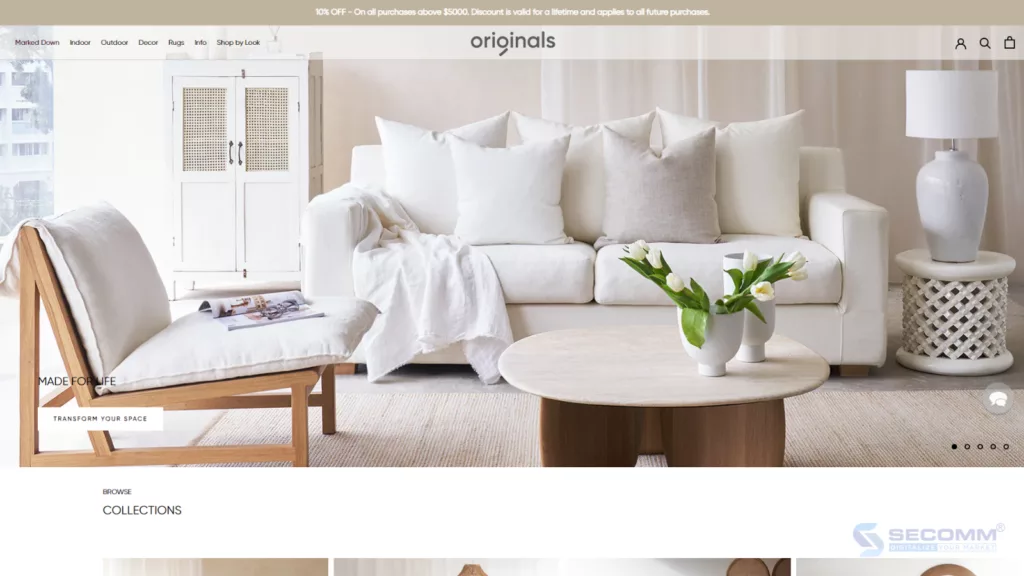
Beloved across Singapore in recent years, Originals offers consumers high-end and unique furniture products. Items at Originals are impeccably designed, blending modernity with minimalist style. From sofas, dining tables, beds to decorative items, each product is designed to bring comfort and style to living spaces.
Originals leverages Shopify Plus to build an eCommerce website that focuses on user experience and interactivity. The interface is intuitively designed and minimalist, easy to navigate, allowing customers to easily search for products, make purchases, and complete transactions.
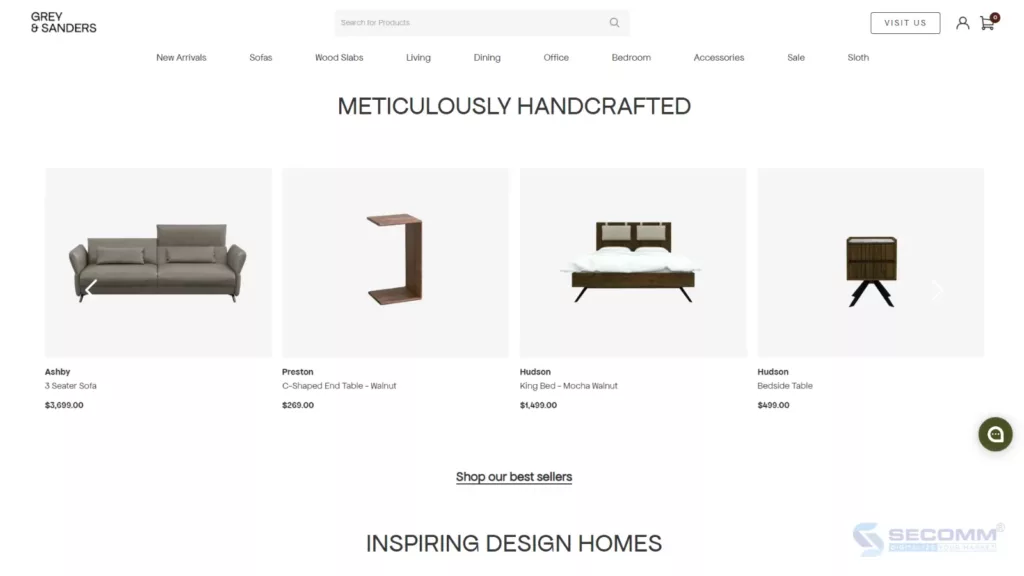
Grey & Sanders, a renowned furniture brand from Singapore, is known for its exquisite craftsmanship and superior quality products. Specializing in furniture made from natural wood and premium leather, from dining tables, sofas, beds to decorative accessories, all are designed to bring natural beauty and luxury to living spaces.
Grey & Sanders utilizes the Magento platform to build its eCommerce website and leverages the flexibility of this platform to handle large transaction volumes and high traffic. The interface is designed to be bright, friendly, and easy to navigate, helping users easily search for and select products. Moreover, the website integrates a geolocation feature to help customers easily locate Grey & Sanders stores on an intuitive map.
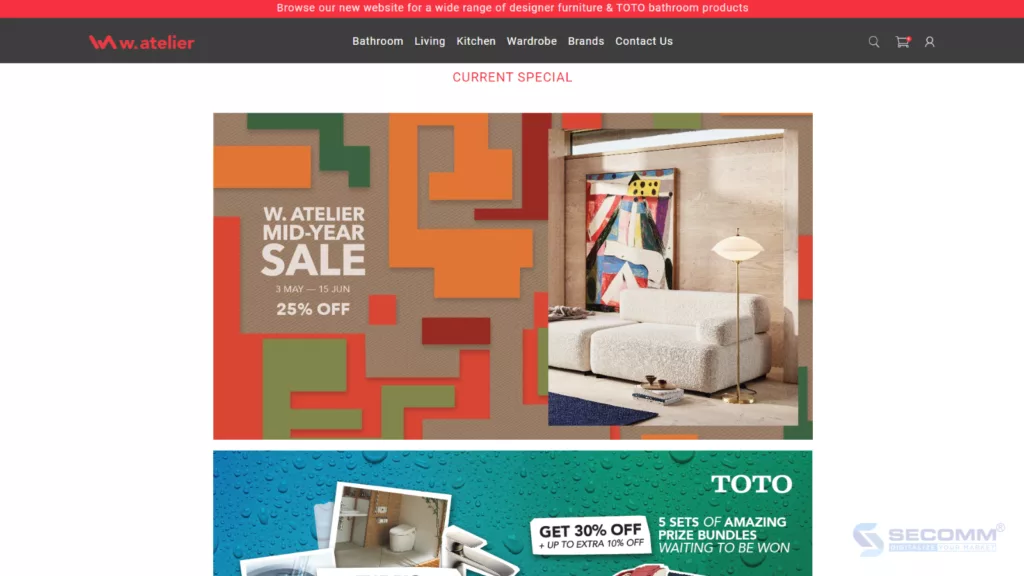
W.Atelier is a leading furniture retailer in Singapore, specializing in providing premium and unique products from some of the world’s most prominent brands such as Cassina, Binova, Fritz Hansen, and Geberit. Customers can find modern, sophisticated, and stylish furniture suitable for various spaces, from small apartments to luxurious villas.
The W.Atelier eCommerce website is built on the Shopcada platform, focusing on designing an easy and convenient online shopping experience, with clear product categories and detailed information. Additionally, W.Atelier is renowned for its professional customer service and thoughtful after-sales policies, ensuring that every shopping experience is smooth and satisfactory. With a commitment to quality and style, W.Atelier has become one of the leading furniture brands in Singapore, the ideal choice for those seeking perfection and sophistication in every detail of their living spaces.
Final Words
Here are 10 eCommerce furniture websites from major brands in Singapore. These websites have been the go-to online shopping destinations for consumers here for many years whenever they need inspiration to decorate their living spaces. By applying modern technologies and smart business strategies, these giants have provided customers with the most authentic furniture shopping experience in the online environment.
Need advice for building eCommerce furniture website? Contact SECOMM today!
 2
2
 2,831
2,831
 0
0
 1
1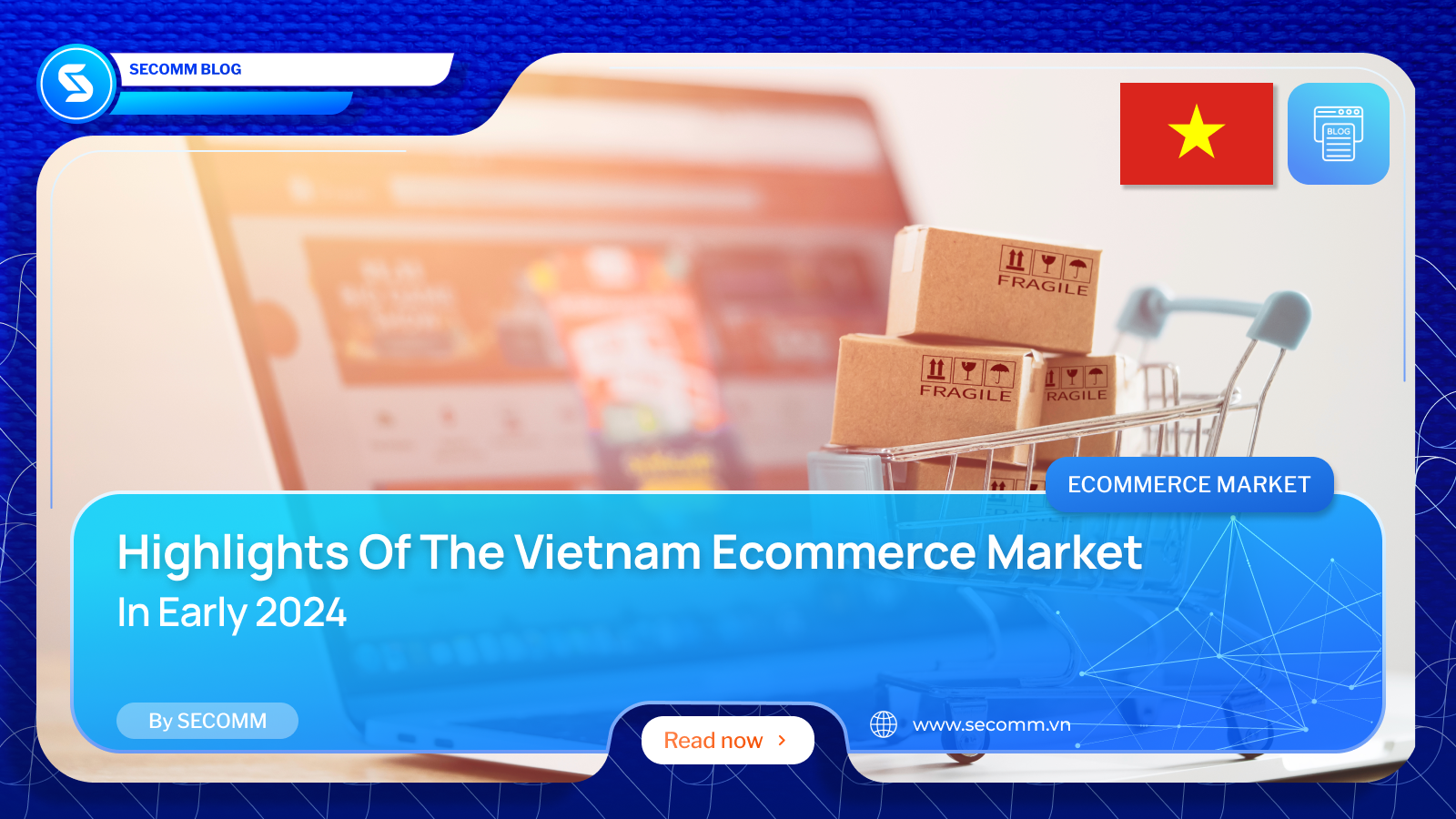
Despite the impact of inflation and economic recession on the Vietnamese economy, consumers are still willing to spend heavily on essential goods. As a temporary solution, they are turning to online shopping channels as one of the ways to deal with rising prices.
In the first two quarters of 2024, the eCommerce market in Vietnam has seen many significant fluctuations with Livestream and Short-video still maintaining their heat as evidenced by the fact that not only TikTok but also the eCommerce giant Shopee is investing heavily in video content. Let’s take a look at some of the highlights of the first few months of the year with SECOMM.
Vietnam is becoming a fertile market for eCommerce development as the demand for online shopping continues to grow. It is forecast that by 2025, eCommerce (B2B, B2C) will reach approximately $24 billion with a CAGR of 22%.
According to statistics from NIQ, there are about 60 million people nationwide using online shopping systems with an average of 3.5 million daily visits to eCommerce sites.
Among eCommerce platforms, TikTok Shop is expected to continue to grow strongly in the coming time. In the first quarter of 2024, this platform’s revenue increased by more than 239% compared to the same period last year, while Lazada showed signs of a slight decrease. Shopee is still holding the upper hand and always outperforms TikTok Shop and Lazada.
A notable point in the consumer behavior of Vietnamese shoppers is that they tend to focus on social factors (social-oriented), which means that they are interested in how products are being evaluated and promoted on communities and social networks, and from there, make purchasing decisions.
Currently, up to 90% of users intend to maintain or even increase their online shopping frequency on eCommerce platforms in the next year.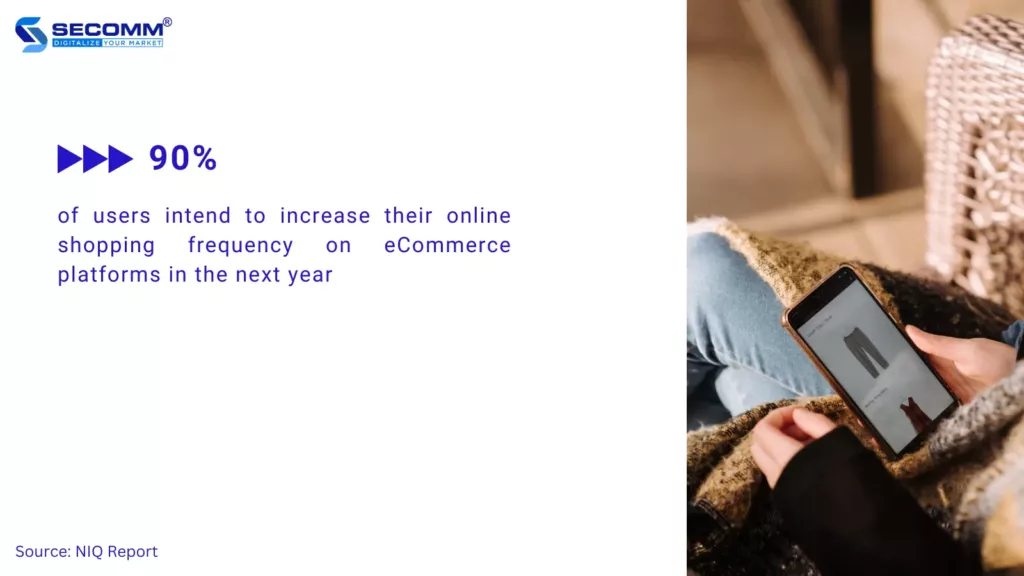
Research indicates that while price reductions and special deals are influential, they only explain 90% of consumer shopping patterns. The convenience factors offered by eCommerce, which simplifies shopping to a few quick actions on mobile devices, actually play a slightly larger role, influencing 92% of consumer choices.
This serves as a reminder for companies to prioritize their eCommerce website’s quality to enhance user experience. For instance, Vinamilk has recently revamped its brand identity and collaborated with SECOMM to refine its online system through eCommerce development services.
The Story of Vinamilk: Vinamilk & The Unprecedented Shift Using Shopify Plus
In a certain survey, only 55% of shoppers chose the shopping experience as a key determinant in their online purchasing decisions. With after-sales services such as easy returns or 24/7 customer care, sellers can easily leverage available resources to enhance the customer’s shopping experience.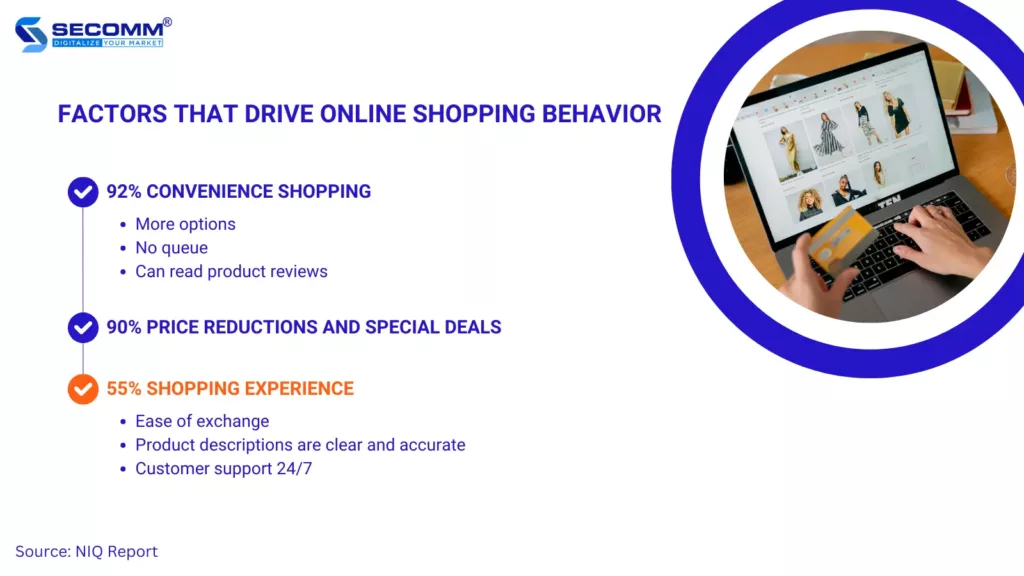
According to research from NIQ, on average, a shopper uses 3.1 different platforms within three months instead of being loyal to just one specific platform. Therefore, sellers should strengthen their presence across multiple platforms.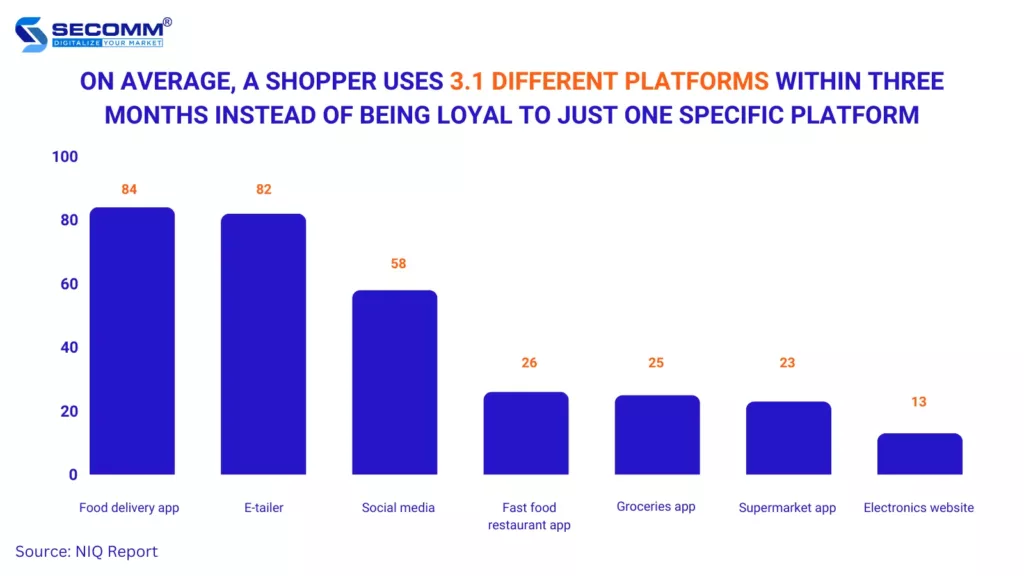
Currently, the trend of ‘Shoppertainment’ remains prevalent, with over 79% of TikTok users making purchases influenced by seller content rather than sales promotions. 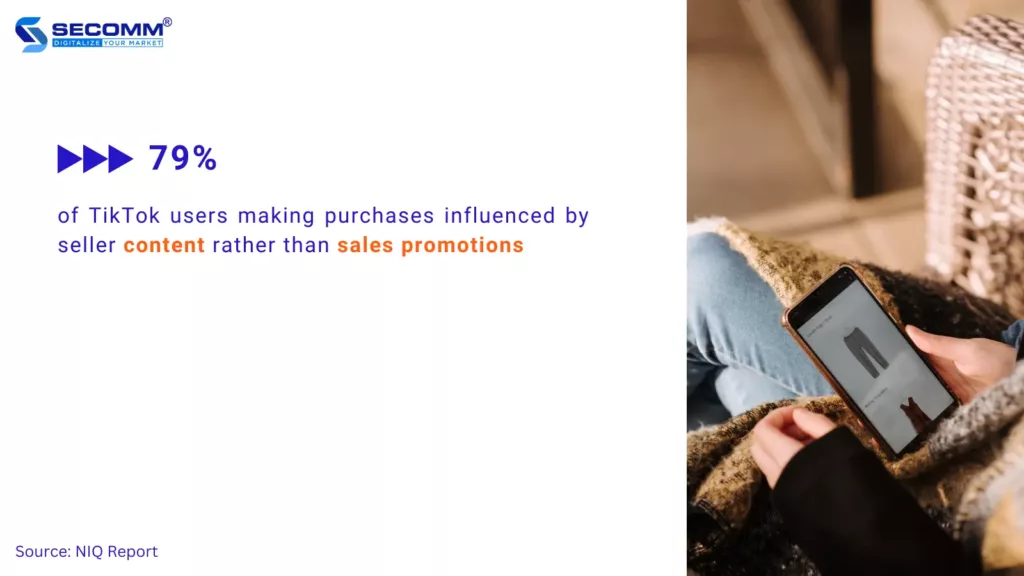
On TikTok, content creation is crucial for merchants to maintain customer engagement and push buying decisions. Ms. Trang Pham, Channel Partner Director at TikTok Vietnam, emphasizes the importance of diversity in advertising and content strategies. She warns that a lack of variety can lead to viewer fatigue.
Consequently, sellers need to understand their customer groups well to create the most suitable content for each group, limit inappropriate content, and utilize cost.
Traditional shopping methods like browsing social media or eCommerce websites are becoming less attractive. Livestreaming, however, stands out as a dynamic way to shop online.
In Q1 2024, 95% of online shoppers made purchases through livestreaming, dedicating an average of 13 hours per week watching livestreams. Statistics reveal that 85% of users prefer livestreaming because it allows direct interaction with sellers, while 81% appreciate the ability to view products in greater detail. Notably, livestreaming can drive 64% of users to purchase unintentionally.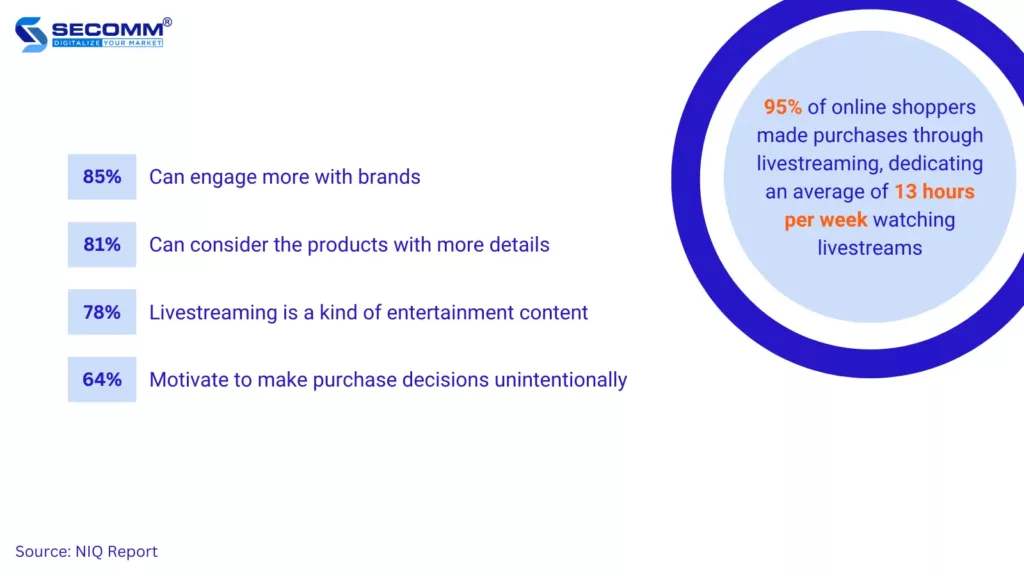
The rise of livestreaming has expanded the influence of content creators and social media influencers. Sellers can leverage these resources to build real connections with consumers. According to NIQ, approximately 50% of consumers are influenced by KOCs/KOLs when making purchasing decisions, with the personal care industry being the most impacted, as 60% of buyers in this category have changed their consumption habits.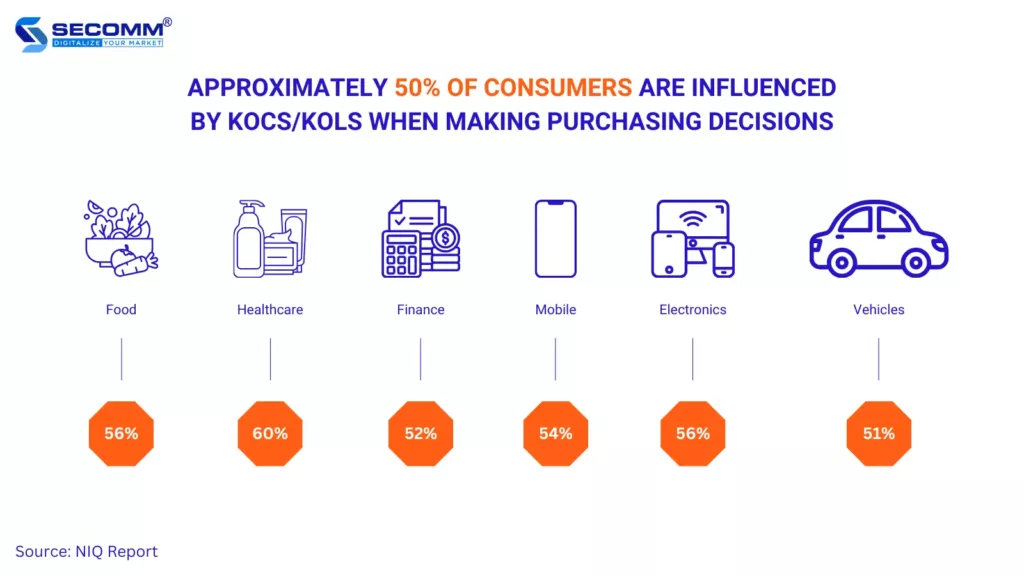
Influencers and KOCs/KOLs are valued for their trust and realness. Their shared content and insights are key in guiding customers’ buying choices. With more influencers emerging, it’s the quality of their content and real-world knowledge that helps shoppers confidently choose trusted brands online.
Online shopping platforms are advancing rapidly, focusing on innovation that puts customers first. For large businesses, along with building brand awareness, improving online stores should always be kept in mind. SECOMM is ready to help companies upgrade their eCommerce platform. Contact SECOMM for a free, detailed consultation.
 2
2
 5,069
5,069
 0
0
 2
2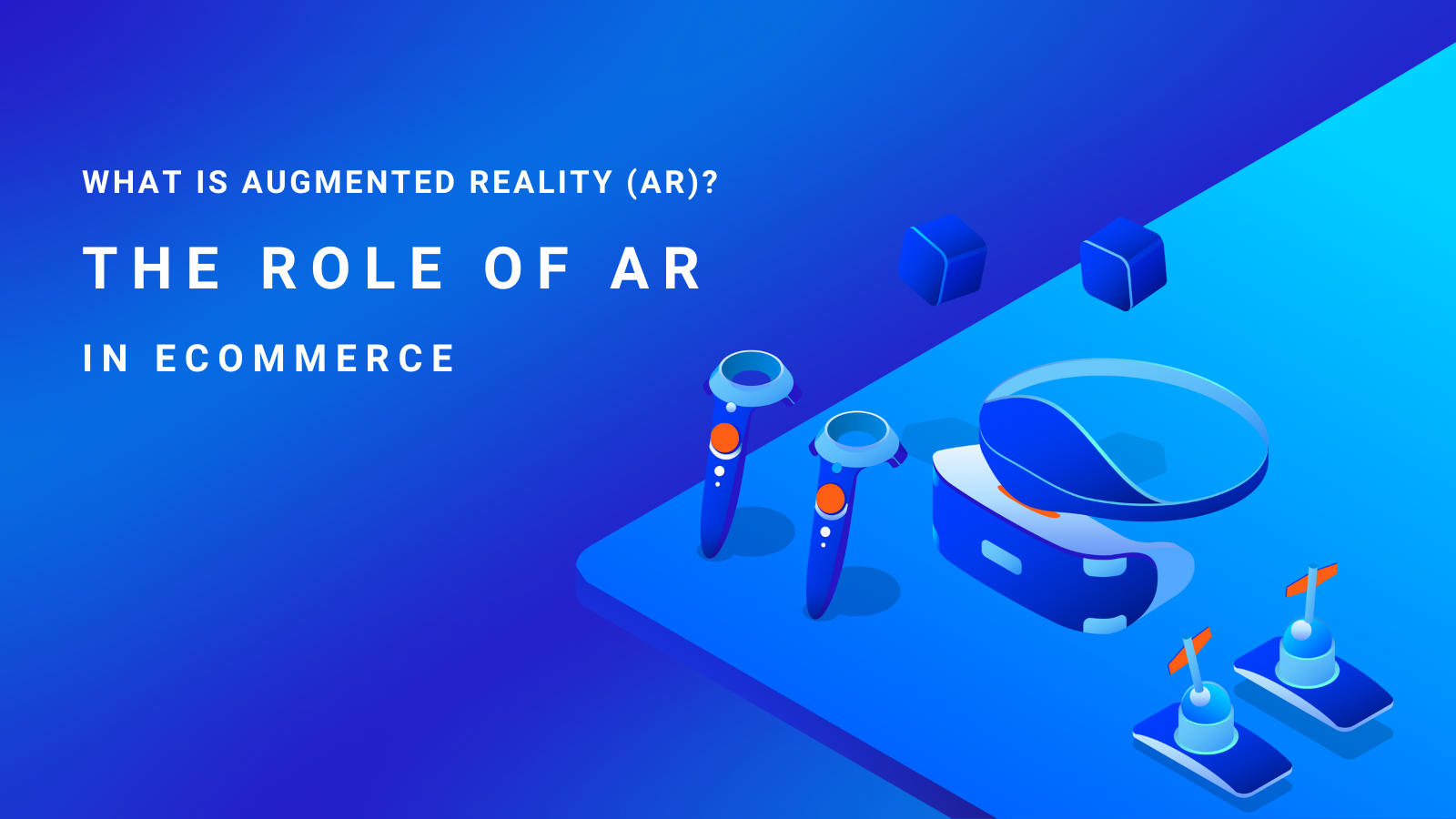
Augmented Reality (AR) – a term that has become familiar in today’s technology world. From entertainment applications to various industries, AR is integral to our daily lives. Moreover, it offers engaging and distinctive interactive experiences for eCommerce consumers. But what exactly is AR? How does it differ from VR, and what is its important role for eCommerce businesses? Let’s explore through the following article.
Augmented Reality (AR) is a technology brimming with potential, offering unique interactive experiences by merging real-world elements with computer-generated virtual elements. Simply put, AR allows users to “augment” the real world by adding information or virtual objects to it. This can occur via the screen of a mobile device, AR glasses or wearable devices.
One of the distinctive features of AR is its ability to create engaging interactive experiences for users without disconnecting them from the real world. Instead of separating users from their surroundings, AR serves as a bridge, seamlessly blending the virtual world and the real world together in a natural manner.
Continuously evolving, AR has progressed beyond being solely used in entertainment, opening up new possibilities in fields such as education, healthcare, advertising, and particularly eCommerce.
Although they can be easily confused, Augmented Reality (AR) and Virtual Reality (VR) are actually two distinct technologies with their use cases. While AR emphasizes “augmenting” the real world by adding virtual elements to it, VR brings users to an entirely new world, completely separate from the real world. When wearing VR headsets, users are fully immersed in a virtual environment, no longer seeing or interacting with the real world around them.
Simply put, AR combines the real and virtual worlds, whereas VR completely transitions users into a virtual realm. This difference is also reflected in how AR and VR are used in different contexts. While VR is often used in entertainment fields such as video games and films, AR can be integrated into practical applications like repair guides, online shopping, and much more.
In the eCommerce world, various types of AR are used to create engaging interactive experiences for customers. Here are the four most common types:
This type of AR uses markers or recognizable images to trigger and display virtual objects. Markers can be images, symbols, or QR codes. When the camera or AR device detects the marker, virtual objects appear on the screen, aligned with the position and orientation of the marker.
Unlike Marker-based AR, this type doesn’t require markers to determine the position and display virtual objects. Instead, it employs technologies such as image recognition, and GPS localization to determine the user’s position and direction, and then displays corresponding virtual objects on the screen.
This type of AR utilizes image projection devices to directly display virtual objects onto real surfaces. Instead of using a phone screen or AR glasses, AR objects are projected onto walls, screens, or other surfaces, creating the sensation that they exist in real space.
This type of AR creates an experience by “overlaying” virtual objects onto the real world, similar to overlaying virtual information onto real-world images from a camera. AR objects can be interactive images, text, or 3D objects displayed on the screen of mobile devices.
Augmented Reality (AR) is not only an entertainment technology but also a powerful tool that enhances the online shopping experience and brings clear benefits to eCommerce businesses. Here are four main advantages of implementing AR in eCommerce:
AR technology provides customers with a highly interactive and engaging shopping experience by allowing them to “try on” products in a real-world environment before making a purchase. With AR, customers can view products from various angles, change colors and sizes, and even test out product features or functionalities visually, enabling them to make quicker and more accurate purchasing decisions.
AR in eCommerce captivates customer attention by introducing novel and unique shopping experiences, encouraging them to interact more with the brand. Being able to interact with virtual products on mobile screens or AR glasses makes the shopping process more enjoyable, and the ability to share this experience on social media creates a positive ripple effect for the brand.
One major issue that eCommerce businesses face is the rate of product returns. AR technology can help minimize this rate by providing customers with an accurate and detailed view of products before purchase, thereby reducing the likelihood of products being returned due to incorrect size, color, or quality.
AR technology can be an effective marketing and advertising tool, enabling businesses to create powerful interactive content. Incorporating AR into marketing strategies not only helps increase brand awareness and attract new potential customers but also reinforces the loyalty of existing customers.
The use cases of AR in eCommerce are diverse and extensive. However, three primary methods stand out as the most common and favored by brands aiming to bolster customer interaction and increase sales.
One of the most popular applications of AR in eCommerce is creating a “virtual try-on” experience for customers. Instead of visiting stores to try on clothes, customers can use AR on their mobile devices to see how products look on-screen. Products that can utilize Virtual Try On include clothing, cosmetics, watches, eyeglasses, etc. Therefore, many brands worldwide have adopted this approach, such as Sephora, Bon Look, and Kylie Cosmetics.
Some brands use AR technology to help customers visualize products more visually and vividly. For example, IKEA allows customers to “place” furniture products in real space through the IKEA Place app and rotate, zoom in, and zoom out to view every detail. Instead of just allowing customers to look at static images, IKEA has provided a more engaging experience to encourage the decision-making process.
Some brands also leverage AR technology to create unique and impressive marketing campaigns. Coca-Cola launched an AR marketing campaign called #TakeATaste Now. This campaign allows customers to use mobile devices to scan QR codes on DOOH screens to change 3D images at will and receive a free bottle of Coca-Cola Zero Sugar. This has attracted curiosity and attention from the masses and successfully brought Coca-Cola Zero Sugar products closer to consumers.
Enjoy a free Coca-Cola Zero Sugar bottle with AR
Final Words
In summary, AR technology is not just a new trend but is also recognized as a powerful tool for optimizing eCommerce activities. With its superior flexibility, AR helps businesses build unique shopping experiences and create more engaging marketing campaigns to boost sales. You can find out more about B2B eCommerce trends here.
Ready to implement Augmented Reality (AR) in eCommerce? Contact SECOMM today!
 2
2
 2,817
2,817
 0
0
 1
1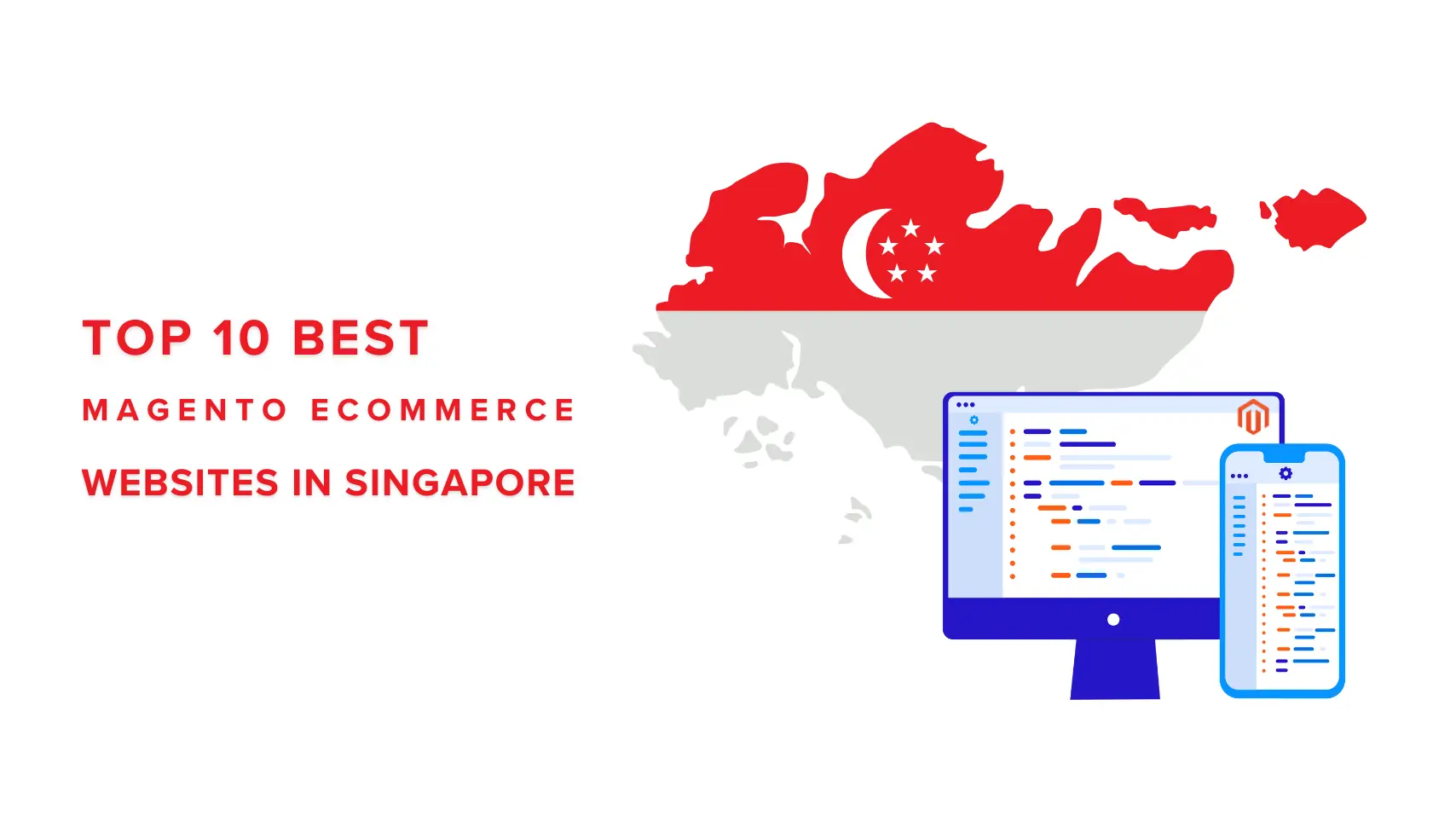
Building Magento eCommerce websites has become an undeniable trend in Singapore, where the blend of technology and creativity has brought unique and appealing shopping experiences to customers. According to Builtwith, there are currently over 600 live eCommerce websites on the Magento platform, and this list is predicted to continue expanding. This indicates that businesses in the Lion City have chosen Magento to create high-quality eCommerce websites, attracting customers and boosting sales.
In this article, let’s explore the top 10 Magento websites in Singapore that have leveraged the power of Magento to enhance the customer experience.

Dyson Singapore is not just an ordinary eCommerce website but also a destination for technology and premium design enthusiasts. With a range of products from vacuum cleaners to smart fans and hair dryers, Dyson continually innovates and enhances the quality of consumers’ lives.
Dyson’s Magento website is designed to provide an optimal shopping experience. From its bright and user-friendly interface to smart product search and categorization features, every detail is carefully crafted to ensure customers have the best online shopping experience. Additionally, Dyson is renowned for its excellent customer care service. From detailed product guidance to flexible return policies, they are committed to ensuring absolute satisfaction for every customer.
Website: https://www.dyson.com.sg/
Industry: Consumer Electronics
Traffic: 690,356/month
Ranking: #1,599 (Singapore) & #292,561 (Global)
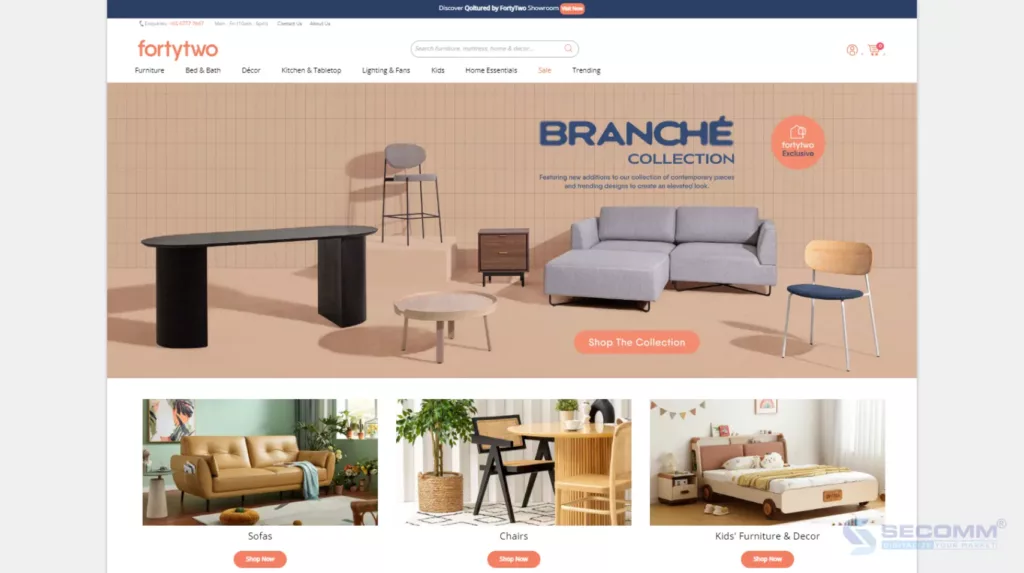
FortyTwo is one of the reputable destinations for household and interior decoration shopping in Singapore. With a diverse collection ranging from living room furniture, bedroom sets to household essentials, FortyTwo offers customers a convenient and varied online shopping experience.
FortyTwo’s eCommerce website is built on the Magento platform, focusing on creating a user-friendly interface. Not only does it display products clearly, but it also provides flexible product search and filtering features, making it easy for customers to find items that reflect their style and personal needs.
Website: https://www.fortytwo.sg/
Industry: Furniture
Traffic: 625,855/month
Ranking: #493 (Singapore) & #107,563 (Global)
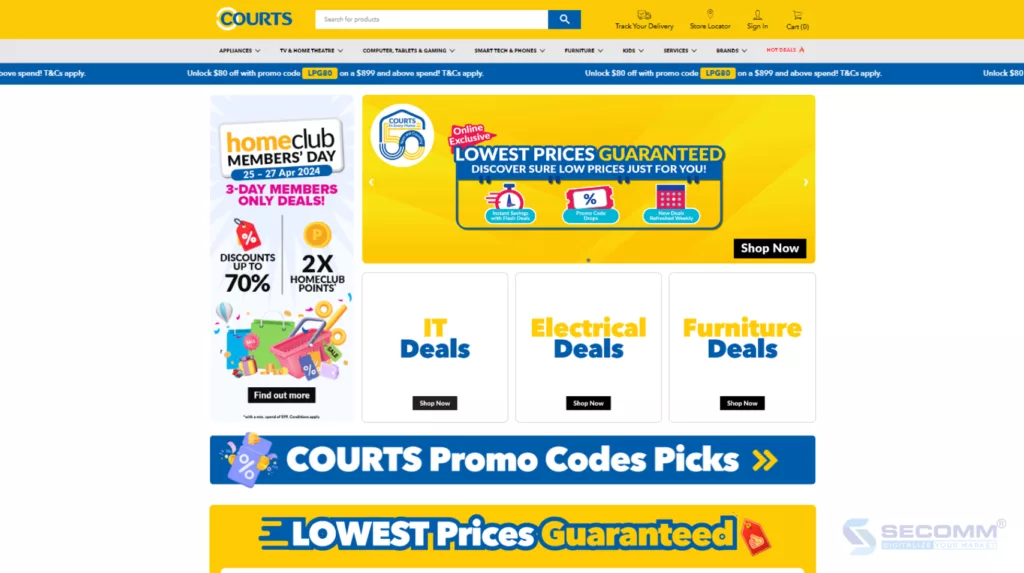
COURTS is known as the leading retailer in Singapore, specializing in a range of diverse products from furniture, electronics to household services. With over 14 stores across the island and a convenient e-commerce website, COURTS is the ideal destination for all shopping needs of Singaporean families.
COURTS’ Magento eCommerce website is designed and built to ensure an easy and comfortable online shopping experience. Through the Magento website, COURTS customers can easily search and select from a variety of high-quality products with flexible search and sorting features.
The brand stands out not only with its diverse products but also with its professional customer service. From shopping advice to delivery and installation services, they are committed to providing maximum satisfaction for every customer.
Website: https://www.courts.com.sg/
Industry: Consumer Electronics
Traffic: 510,240/month
Ranking: #502 (Singapore) & #105,498 (Global)
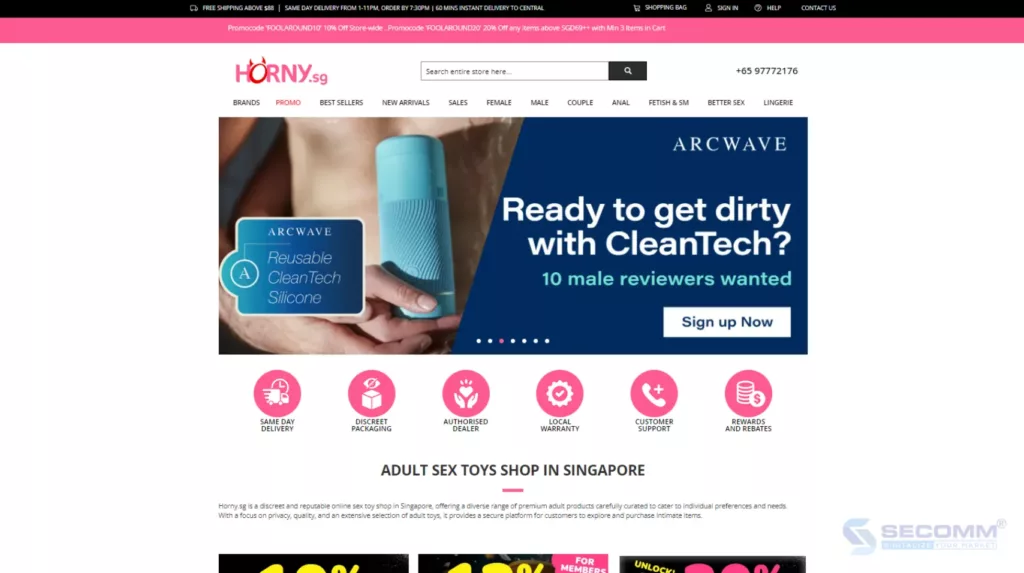
Horny is a unique eCommerce website based in Singapore, focusing on providing modern adult accessories. With a mission to help customers feel confident and satisfied in their romantic lives, Horny has created an enjoyable and convenient shopping experience through the Magento platform. Horny’s Magento eCommerce website is built with a focus on creating a reliable and user-friendly online shopping space. From attractive interface layouts to clear and detailed product displays, every detail is meticulously crafted to create the best shopping experience. Additionally, Horny stands out with the diversity of fashion and accessory products. Customers can easily find items that suit their individual needs.
Website: https://horny.sg/
Industry: Adult
Traffic: 482,417/month
Ranking: #1,133 (Singapore) & #193,753 (Global)
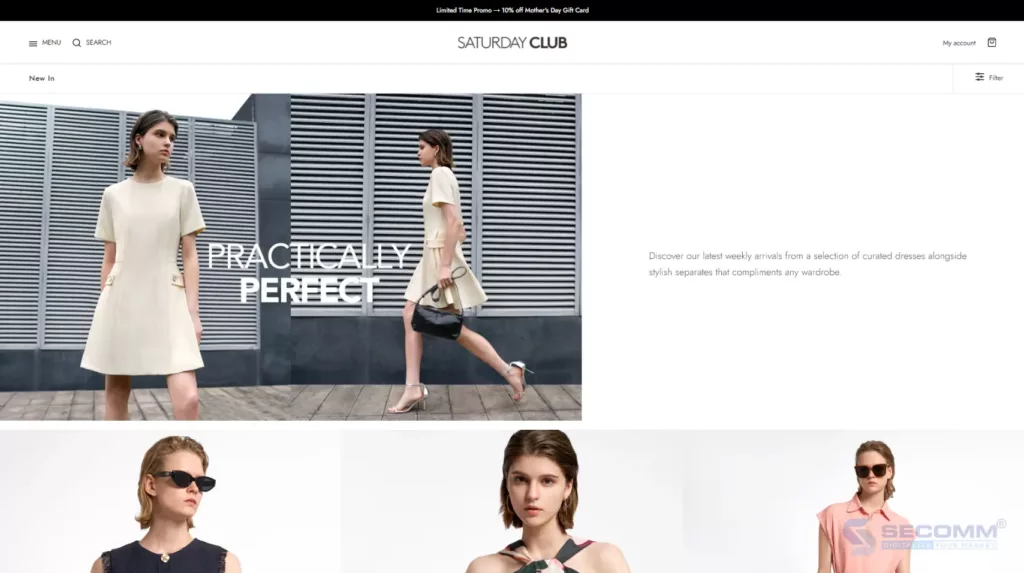
Saturday Club is not just a fashion brand but also an icon of confidence and freedom in women’s workwear fashion in Singapore. With a creative spirit and a mission to celebrate natural beauty, Saturday Club continuously brings fresh, stylish, and unique fashion collections.
Saturday Club uses Magento to develop its eCommerce website to provide customers with a smooth shopping experience with an easy-to-use interface. Customers can easily choose from a variety of products and the latest collections, with detailed information and clear images. Additionally, the brand stands out with attentive customer care service and fast and flexible delivery policies.
Website: https://sg.saturdayclub.com/
Industry: Fashion
Traffic: 406,335/month
Ranking: #2,115 (Singapore) & #240,670 (Global)
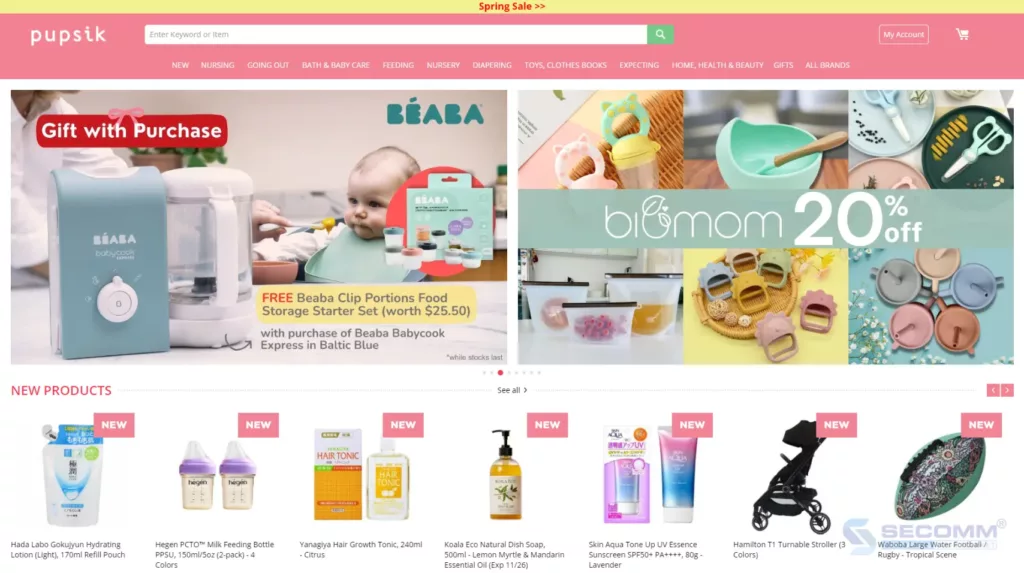
Pupsik is the go-to online shopping destination for parents in Singapore, where they can find everything they need for the care and nurturing of their children. With a humane mission and special attention to the needs of families, Pupsik is committed to providing a peaceful and convenient shopping experience.
Pupsik has built its Magento website to easily customize features and shopping experiences. From smart search features to product filtering and optimized checkout pages, every detail is focused on ensuring shopping becomes easy and quick.
In particular, Pupsik is famous for the diversity and quality of products for children and mothers. From clothing, toys to everyday essentials and healthcare products, they ensure that all family needs are comprehensively met.
Website: https://pupsik.sg/
Industry: Childcare
Traffic: 264,148/month
Ranking: #3,684 (Singapore) & #677,191 (Global)

Cellarbration is the ideal destination in Singapore for wine and alcoholic beverage enthusiasts. This brand boasts an extensive collection of wines and alcoholic beverages from top brands worldwide.
Shopping on the eCommerce website is also efficiently optimized by Cellarbration through the power of the Magento platform. From search operations to product browsing and payment, everything is deeply customized to ensure customers have a more engaging shopping experience.
Not only prominent for the richness of products but also for professional and dedicated customer service. Cellarbration is committed to customer satisfaction by providing personalized support and diversifying payment options as well as delivery.
Website: https://cellarbration.com.sg/
Industry: Wine
Traffic: 125,878/month
Ranking#6,676 (Singapore) & #1,075,981 (Global)

In Singapore, the Wine Collection brand is a favorite destination for wine enthusiasts who want to explore premium wines from the most famous wine regions in the world. Wine Collection also offers customers a rich and diverse collection of wines.
The Wine Collection’s Magento website is customized to optimize the experience, allowing customers to search for wines by origin, grape variety, explore special collections, and choose preferred payment and delivery methods.
Not only does it provide a modern and engaging online shopping space, but Wine Collection also serves as a source of wine knowledge. Customers can find articles and detailed guides on how to choose and enjoy wine to better understand the art and science behind the delicate flavors.
Website: https://wineconnection.com.sg/
Industry: Wine
Traffic: 82,788/month
Ranking: #12,447 (Singapore) & #1,701,444 (Global)

Far East Flora is a brand specializing in providing plant products, fresh flowers, and decorations made from greenery. The Far East Flora Magento eCommerce website is built with a priority on customer experience through a user-friendly interface and deeply developed and customized features. Customers can search for plants by filtering by type, size, and make quick payments with just one page. Additionally, Far East Flora’s fast and reliable delivery service is highly rated by customers. The brand is committed to delivering quality products to customers’ hands safely and promptly, helping them decorate living spaces beautifully and meaningfully.
Website: https://fareastfloragarden.com/
Industry: Gardening
Traffic: 40,864/month
Ranking: #20,995 (Singapore) & #2,327,136
(Global)
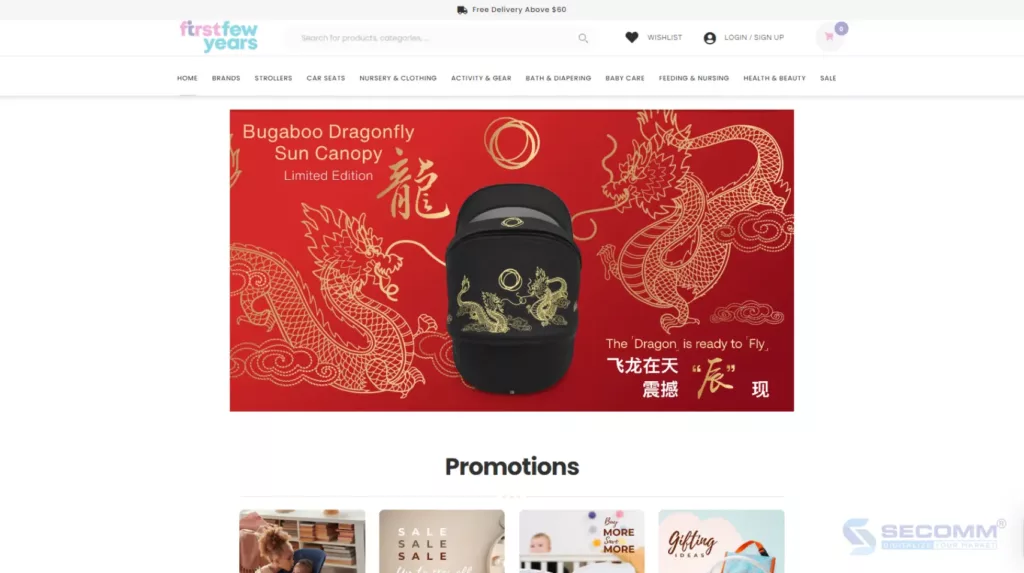
First Few Years is not just a store but also a loyal companion for parents in the journey of caring for their children from the early years. With a dedicated spirit and profound understanding of children’s needs, First Few Years provides a meaningful and trustworthy shopping experience.
The Magento website of this brand is not only a place for shopping but also an important source of information and support for parents. From advising on safe toy selection and development to sharing experiences in childcare, all information is conveyed sincerely and meticulously.
Website: https://firstfewyears.com.sg/
Industry: Childcare
Traffic: 10,245/month
Ranking: #86,167 (Singapore) & #7,519,723 (Global)
The Bottom Line
Above are 10 leading Magento eCommerce websites in Singapore, each providing customers with a unique and memorable shopping experience. From product diversity to professional customer service, each website has prioritized the mission of serving and satisfying customers.
Need more advice to build your first Magento website? Contact SECOMM today!
 2
2
 2,099
2,099
 0
0
 1
1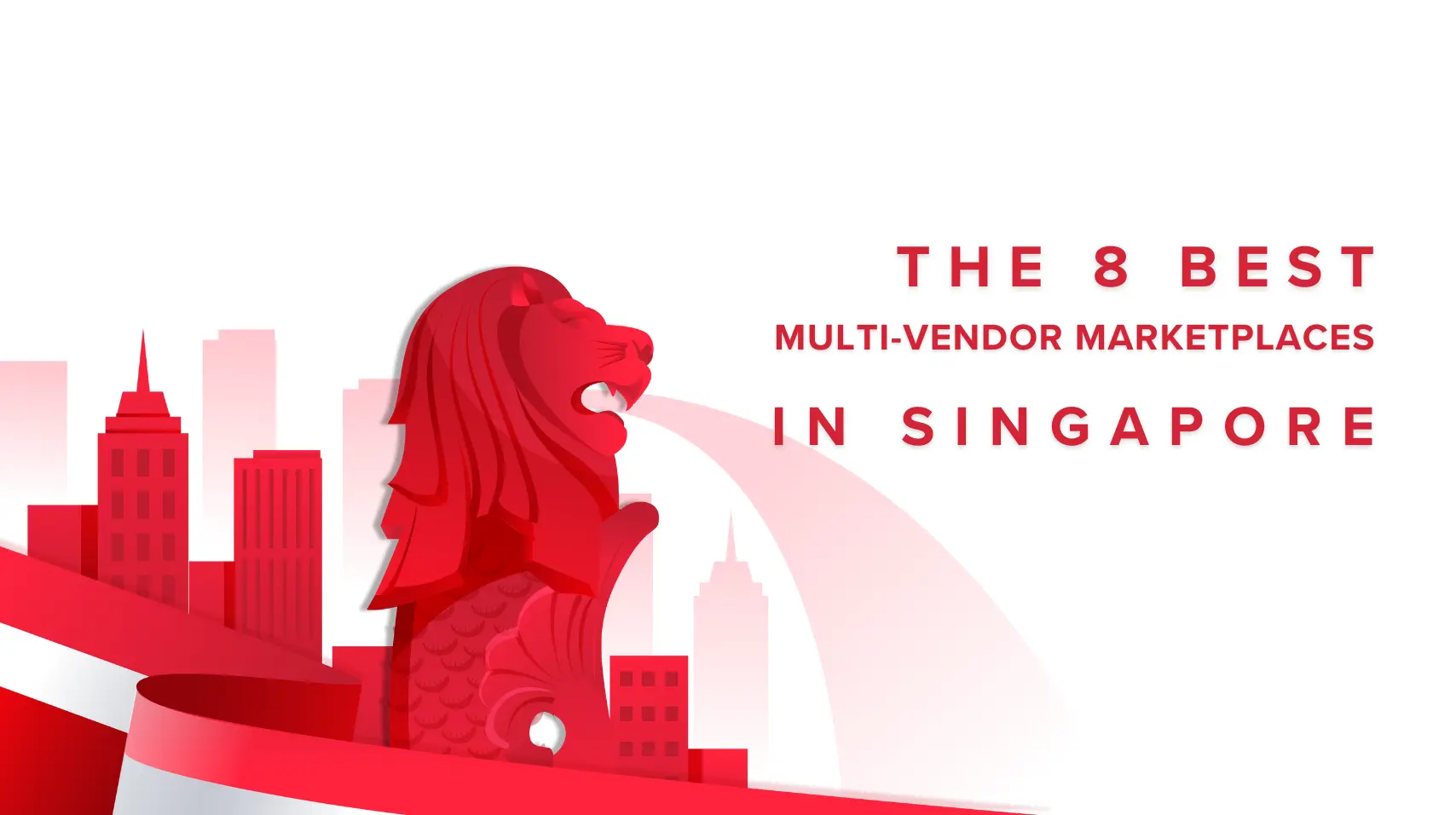
The Singapore multi-vendor marketplace market is booming, with stiff competition from Western giants like Amazon and eBay, as well as trusted local brands such as Shopee and Lazada. Statista reports that in 2023, the industry’s revenue reached $4.45 billion and is projected to hit $5 billion in 2024 and $8.2 billion by 2029. In this context, identifying and understanding the leading online marketplaces in Lion City is crucial for maximizing potential and opportunities in this rapidly evolving market.
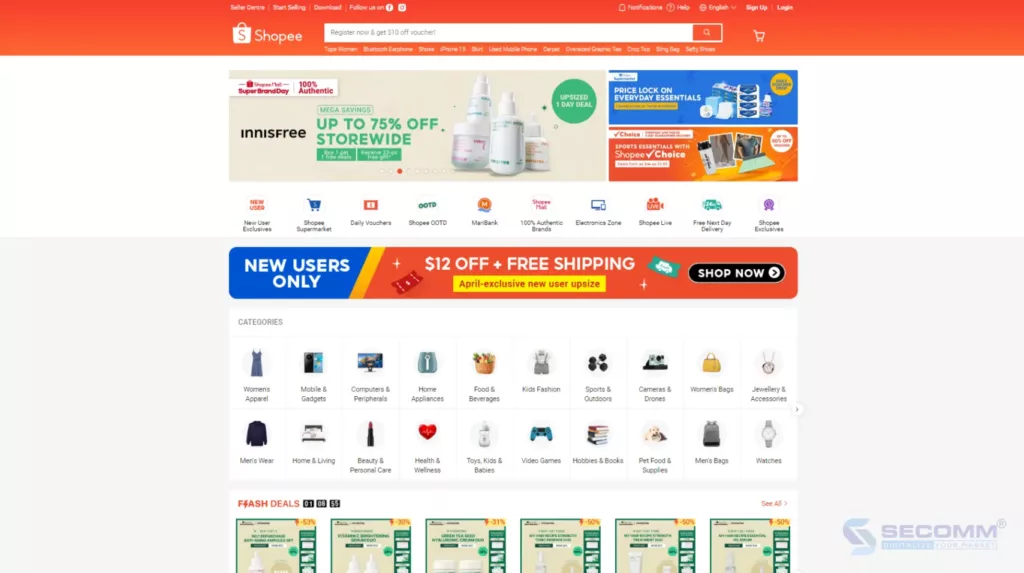
Shopee Singapore is one of the leading multi-vendor marketplaces not only in Singapore but also throughout the Southeast Asia region. The range of products available for purchase and sale on the Shopee platform is quite diverse, spanning from consumer goods to fashion, electronics, toys, and much more. Shopee Singapore is renowned not only for its convenience and flexibility in the online shopping process but also for its attractive promotional programs and fast delivery services. With its open and user-friendly business model, the eCommerce marketplace has become a popular destination for people looking for quality products at reasonable prices.
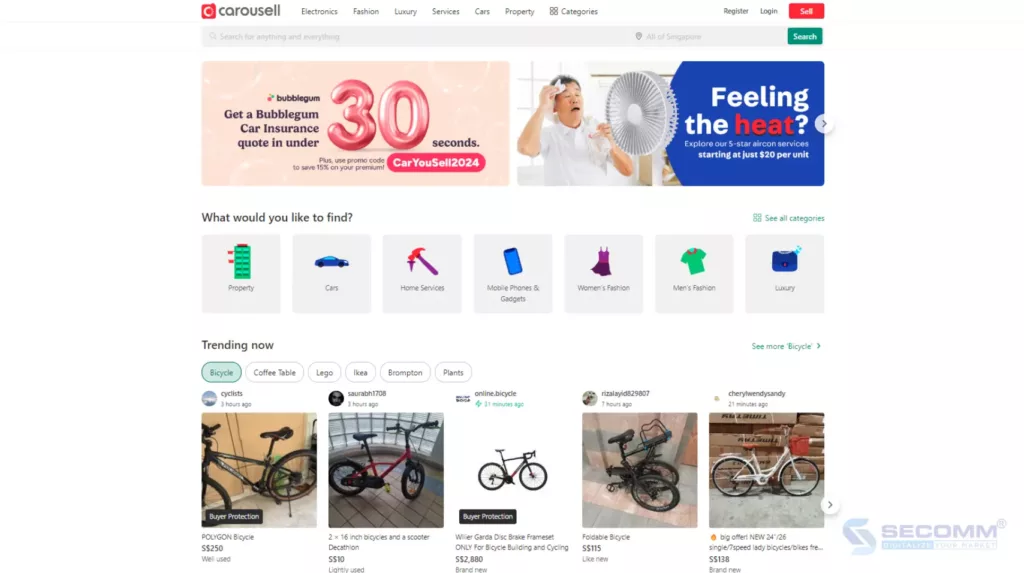
Carousell, a well-known online marketplace based in Singapore, offers a stylish and personalized online shopping experience. It specializes in enhancing the buying and selling process both on its website and mobile app. What makes Carousell stand out is its wide range of unique items available. Beyond just new products, Carousell also serves as an eCommerce marketplace for secondhand items, spanning from clothing and electronics to household goods. This creates an engaging shopping environment for those in search of one-of-a-kind items or looking to recycle goods.
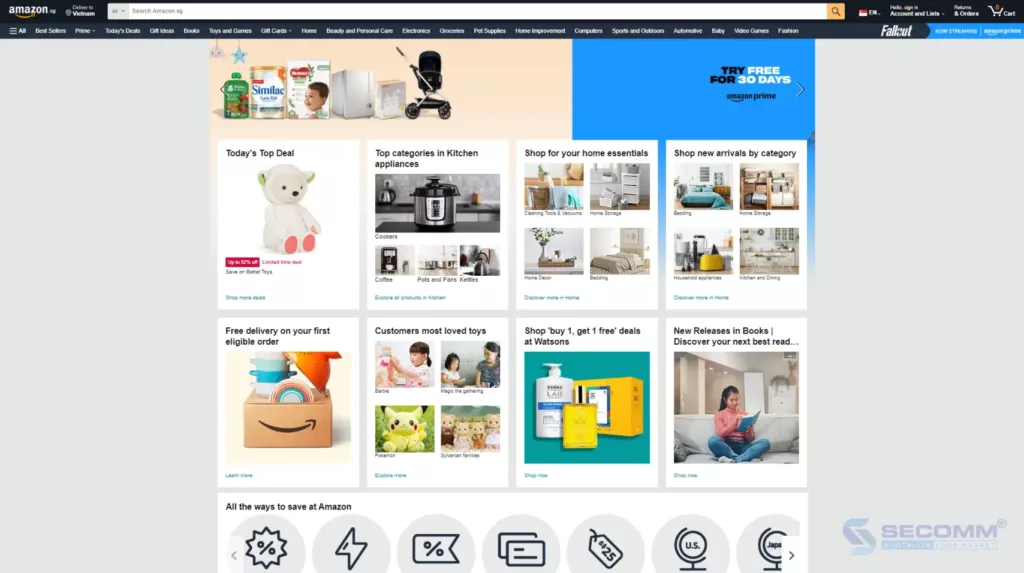
When expanding into the Singapore market, retail giant Amazon brought a top-notch and diverse online shopping experience to local customers. With an extensive array of products spanning from consumer electronics to books, fashion, household items, electronics, and cosmetics, Amazon serves as the preferred destination for customers seeking quality and variety.
A key strength of this multi-vendor marketplace lies in its reliable shipping infrastructure and customer service. With a widespread distribution network and efficient delivery services, Amazon ensures convenient and prompt product deliveries for buyers. Additionally, Amazon’s customer support service is highly regarded, as the company strives to address inquiries and issues from both sellers and buyers promptly and effectively.
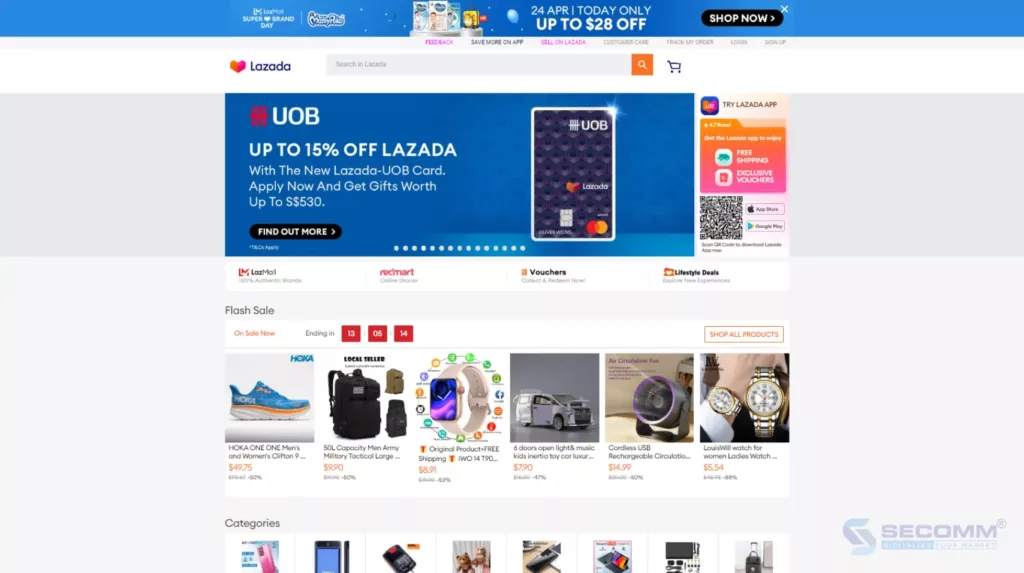
Lazada is one of the major players in the eCommerce world, winning over the trust of Singaporean consumers with its diverse range of services and products. Since being acquired by Alibaba, Lazada has experienced significant growth and strengthened its position in the Southeast Asian market. Today, Lazada serves not only as a platform for major brands but also as a gateway for small and medium-sized enterprises to enter the market effectively. Moreover, the online marketplace is renowned for its enticing promotional offers and swift delivery services. The incorporation of labels like “LazMall” and “LazGlobal” further simplifies the process for customers to discover and purchase quality products from brands worldwide.
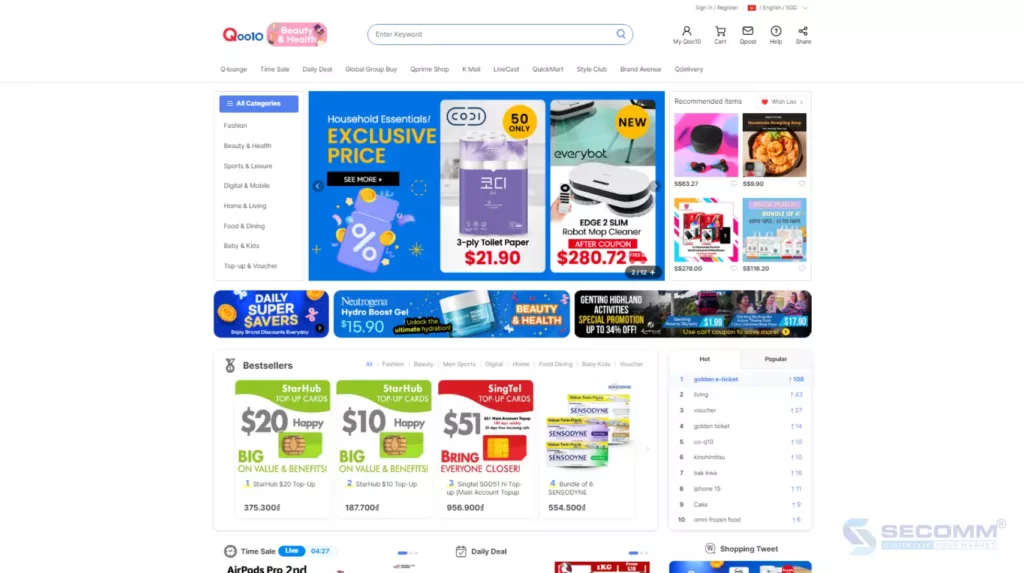
Qoo10, also known as Gmarket, stands as one of Singapore’s most popular and reliable eCommerce marketplaces. With its diverse range of online storefronts, Qoo10 offers users a stylish and varied online shopping experience.
A standout feature of Qoo10 is its emphasis on products from small and medium-sized retailers. Rather than focusing solely on major brands, Qoo10 provides a platform for small and medium enterprises to easily and effectively access the market. This creates a welcoming and diverse shopping environment where buyers can discover unique and high-quality products from smaller manufacturers and brands.
Moreover, the online marketplace is well-known for its appealing promotional programs and fast delivery services. The user rating and feedback system further bolsters trust and transparency in the online shopping process on this platform.
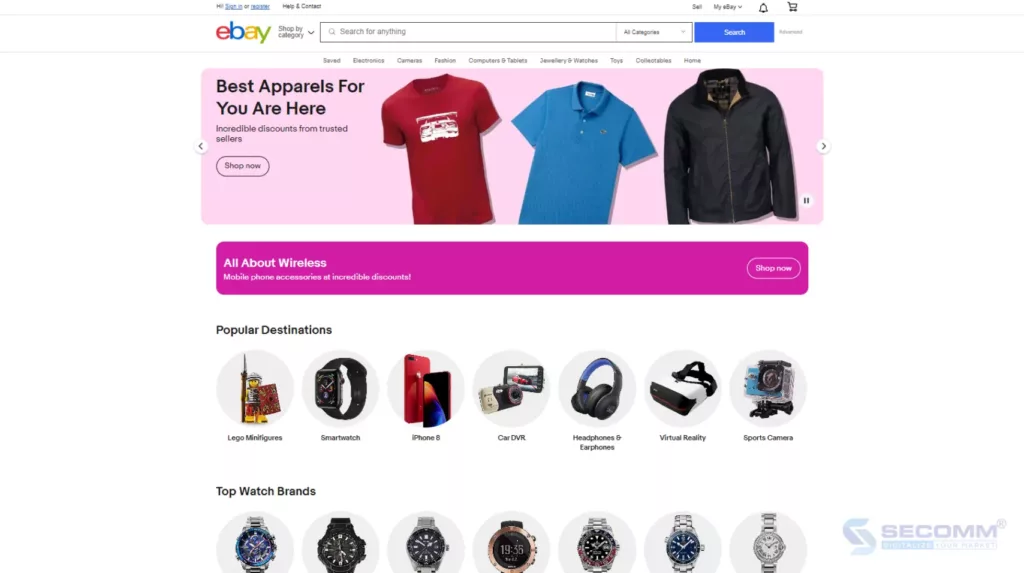
eBay is a well-established and trusted name in the global eCommerce landscape. It has won over Singaporean consumers with appealing and efficient online shopping experiences. eBay Singapore is renowned for its ability to connect buyers and sellers worldwide, creating a vast global online marketplace. With millions of items available for sale on the platform, ranging from brand-new to gently used products, customers can easily discover items that suit their needs and budgets.
Furthermore, the multi-vendor marketplace offers customers flexibility in payment and delivery options. Customers can opt for popular payment methods like PayPal or credit cards and also take advantage of international shipping services to have their purchases delivered directly to their doorstep.
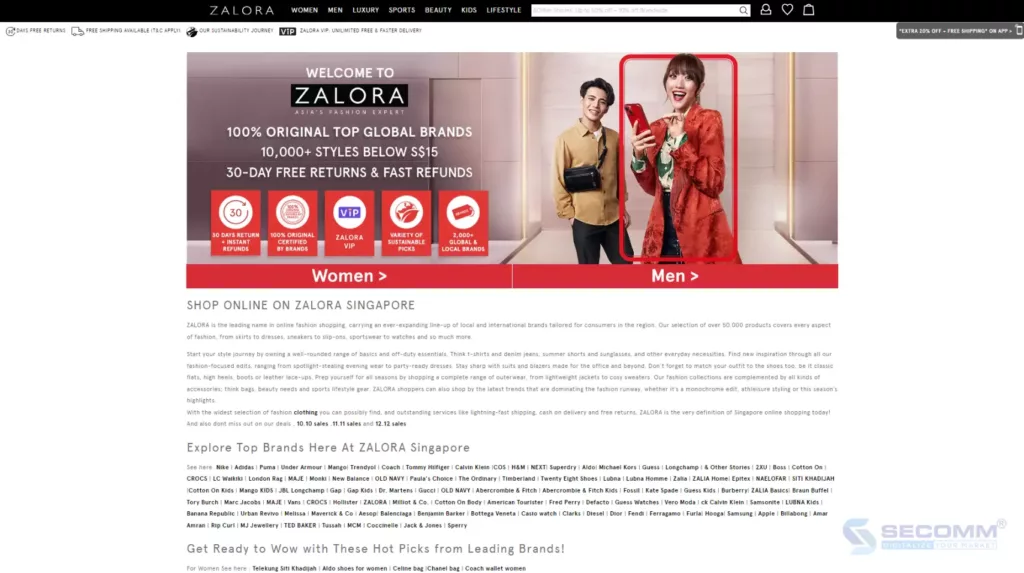
Zalora is a popular multi-vendor marketplace in Singapore, offering fashion and style products from both local and international brands. With its diverse array of items spanning from apparel, footwear, and accessories to jewelry and cosmetics, Zalora has become the go-to destination for fashion enthusiasts seeking to express their unique style. What sets Zalora apart is its dedicated focus on the fashion and style market, delivering users a flawless online shopping experience in this realm. Beyond just a platform for purchasing products from renowned brands, the eCommerce marketplace serves as a hub for individuals to explore and cultivate their style.
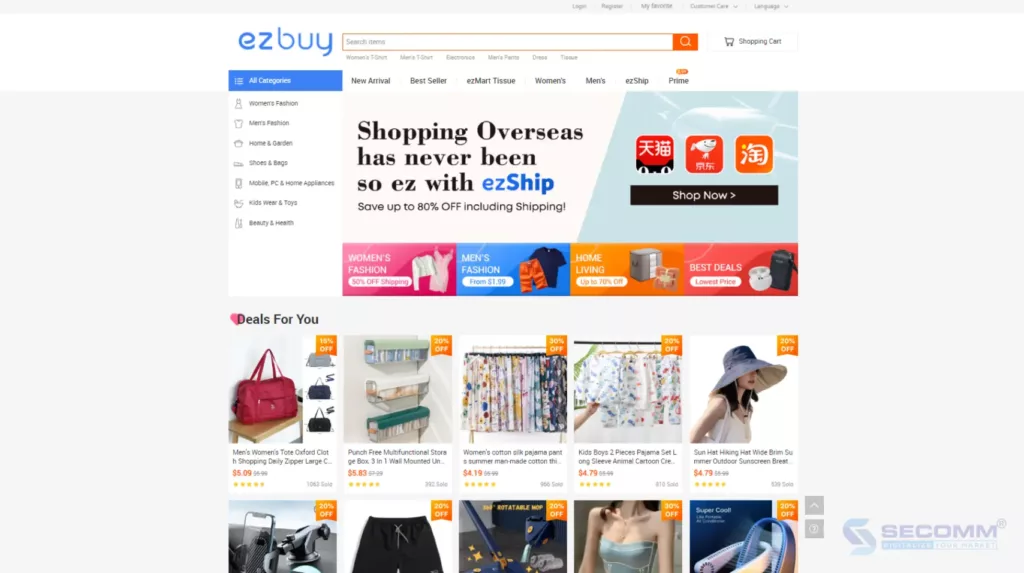
The online marketplace EZbuy is renowned for its convenient and cost-effective international shopping services. With EZbuy, customers can easily access and purchase hundreds of thousands of products from China, Korea, the US, and many other countries at reasonable prices with convenient shipping services.
Operating as an intermediary shopping model, the EZbuy eCommerce marketplace helps users circumvent complications related to import taxes, international shipping fees, and complex customs procedures. Instead of handling these procedures themselves, users can effortlessly shop for products from overseas through EZbuy and conveniently await delivery at home.
In summary, the Singapore eCommerce market is thriving with a variety of top-tier multi-vendor marketplaces. Each platform offers unique features and the best services to meet the shopping needs of customers. The success of these giants serves as motivation for many businesses to join and lays the groundwork for further development of the eCommerce market in Singapore in the future.
Need more advice for multi-vendor marketplace development? Contact SECOMM today!
 16
16
 3,978
3,978
 0
0
 10
10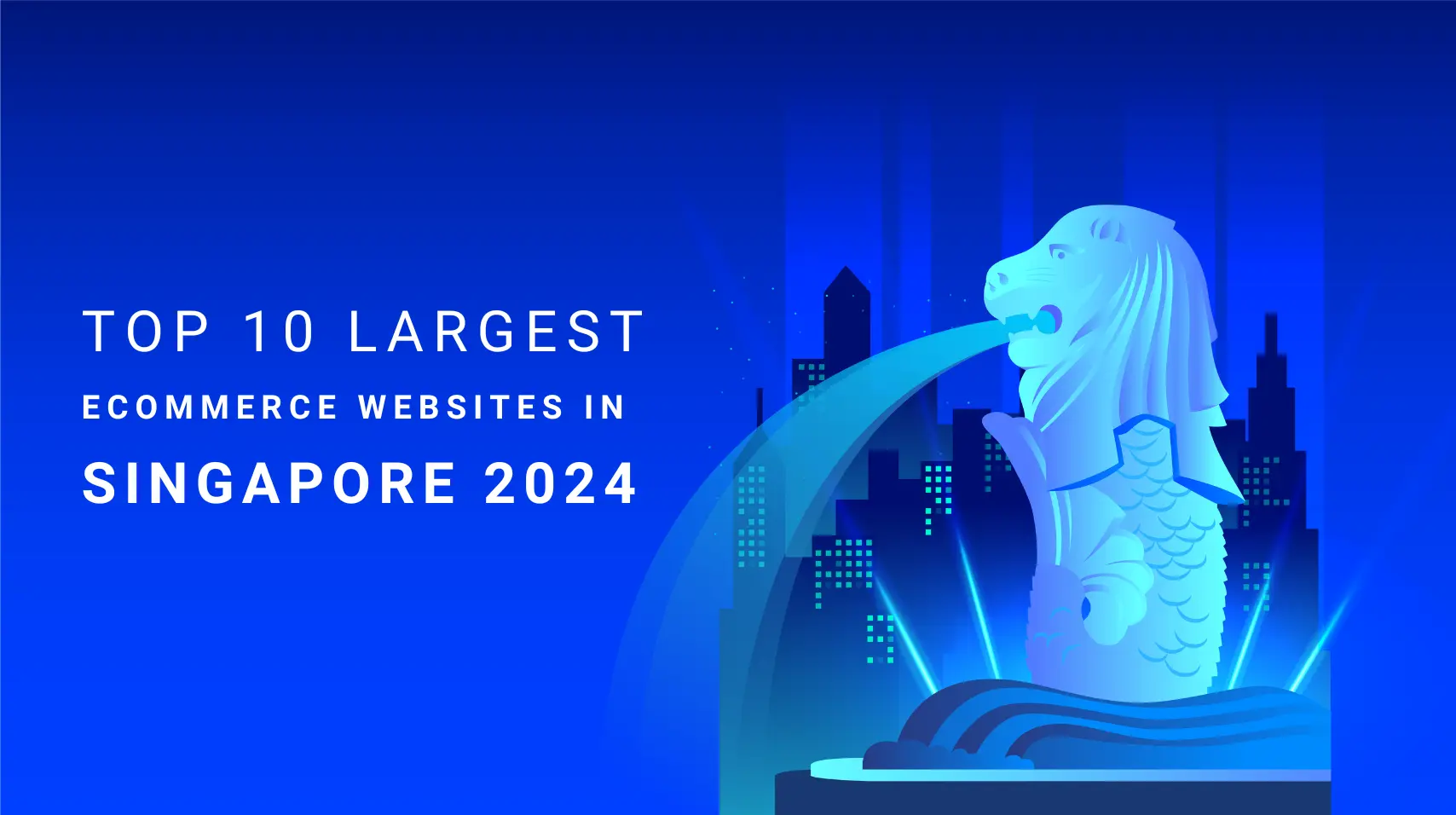
Online shopping has become an indispensable trend in Singapore. Therefore, consumers in this city have set higher demands for their online shopping experience, driving businesses to strive for optimizing their eCommerce websites to provide a unique and best shopping experience for customers.
Below are 10 brands heavily investing in the online shopping experience in Singapore, as collected by SECOMM from BuiltWith, AfterShip, and Similarweb.

Charles & Keith, a leading fashion brand in Singapore, was founded in 1996 by two brothers Charles and Keith Wong. Focusing on footwear, handbags, and fashion accessories, Charles & Keith quickly gained attention in the market for its modern, youthful fashion style at affordable prices.
Charles & Keith has chosen Salesforce Commerce Cloud to build its website. Thus, Charles & Keith’s website features a range of functions to create the most convenient and comfortable online shopping experience for users. These include advanced search with filtering and sorting, detailed product views with high-quality images and customer ratings, secure shopping cart and payment, along with order tracking and purchase history. Additionally, customers can enjoy loyalty rewards, seek customer support, read fashion blogs, and connect on social media to stay updated on the latest trends. With this diversity and convenience, Charles & Keith’s eCommerce website in Singapore has provided an excellent online shopping experience for users.

FortyTwo is a furniture and home accessories brand established in Singapore in 2007. FortyTwo offers a range of products from bedroom furniture, living room, kitchen to household items and interior decoration. The brand is known for providing quality products at competitive prices with fast delivery and attentive customer service. FortyTwo regularly updates and expands its product portfolio to meet diverse customer needs.
FortyTwo’s website is built on the Magento Open Source platform (Adobe Commerce free version). With this website, users can easily search and filter products, explore a variety of product categories from furniture to household items. Additionally, the website offers the ability to integrate attractive promotional campaigns and customer support, along with fast and secure delivery services.

COURTS is a leading electronics retailer in Singapore, Malaysia, and Indonesia. With over 40 years of experience, COURTS offers customers a wide range of product choices, convenient services, and competitive prices.
COURTS uses Magento Open Source to build its eCommerce website. This website provides diverse and convenient online shopping experiences for users with functions such as product categories, specific product search, store information, and order tracking on the website. COURTS also provides support services and information about promotional programs and product news.
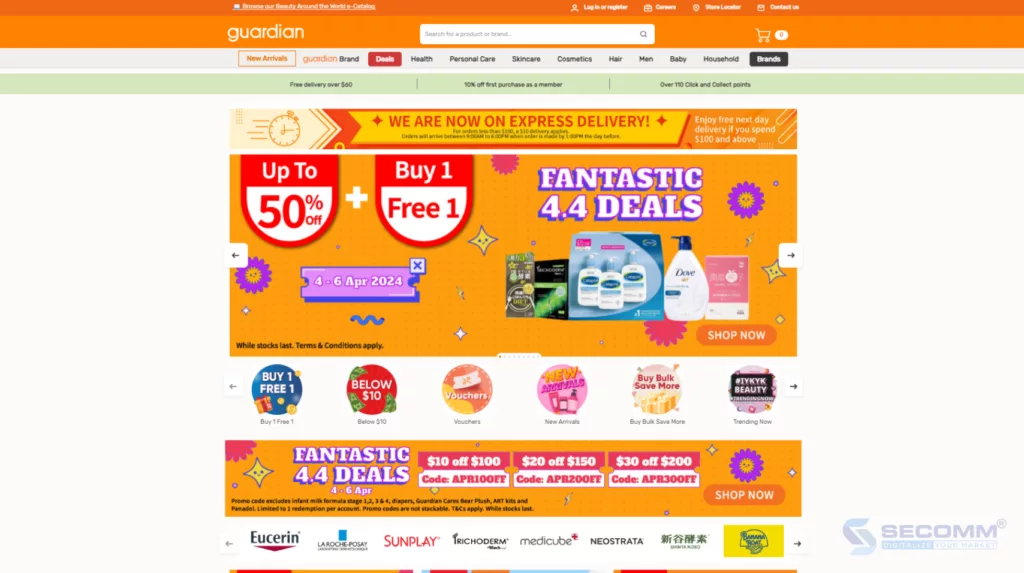
Guardian is a retail chain specializing in health care, cosmetics, and other consumer products. Guardian has a presence in many countries and regions around the world, including Singapore, with a range of products from famous and reliable brands.
Guardian’s website is built on the SAP Commerce Cloud platform, offering many useful features for users. Customers can easily search and purchase products, manage their shopping carts, and make convenient payments. At the same time, the website offers promotions and online support services to help customers have a comfortable and safe online shopping experience. Moreover, customers can also rate and provide feedback on products, providing useful information for other users.
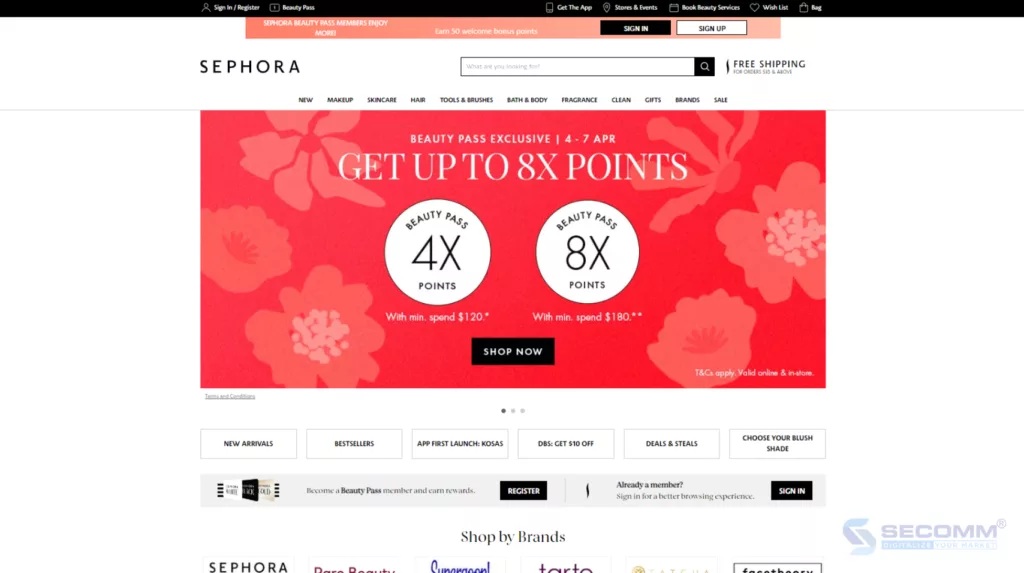
Similar to Guardian, Sephora is a global retail chain of cosmetics and beauty products, known for offering a range of cosmetics, skincare, and beauty products from leading brands worldwide. Currently, Sephora has a presence in the Singapore market with physical stores in major shopping centers and an eCommerce system, including a website and app for customers. Sephora is favored for its product diversity, customer care services, and innovation in the online cosmetics shopping experience.
Sephora’s eCommerce system in Singapore is built on the Vue.js and Nuxt.js programming languages. With this system, Sephora customers can quickly search and explore products through smart search and various filters. The online shopping experience is optimized with detailed product information, sharp images, and customer reviews.
Sephora’s app is also highly rated, making shopping easier for customers with features like “Virtual Artist” and receiving notifications about promotions. In general, Sephora offers a range of features and services to meet customers’ cosmetics shopping needs, creating a professional and convenient online shopping experience.
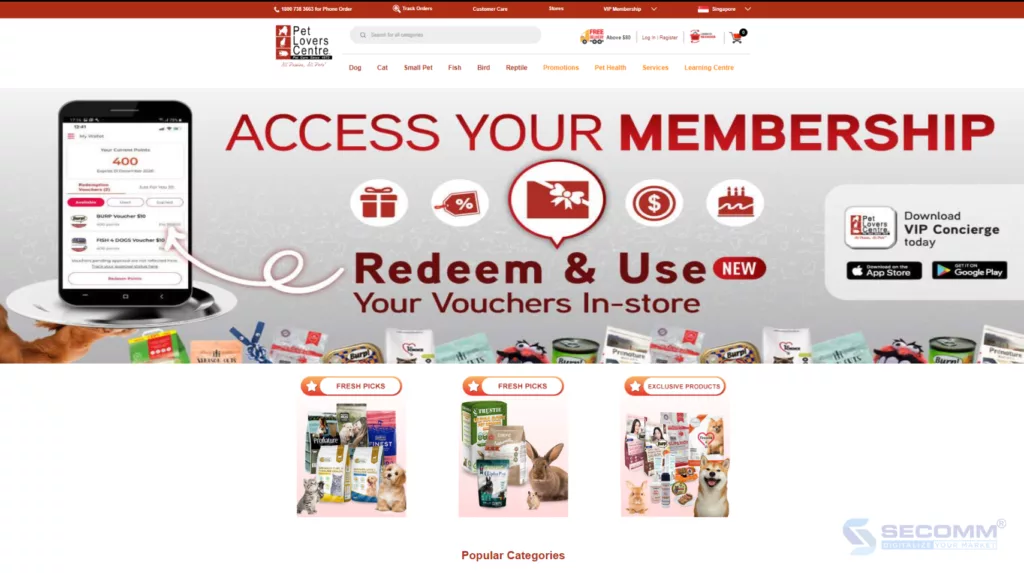
Pet Lovers Centre is a leading pet products and services retailer in Asia. Established in 1973 in Singapore, Pet Lovers Centre now has over 160 stores in 5 countries: Singapore, Malaysia, Thailand, the Philippines, and Vietnam. Pet Lovers Centre is committed to providing quality products and services from reputable brands at competitive prices.
The Pet Lovers Centre website is built using PHP programming language and has outstanding features to provide users with a convenient online shopping experience. Users can search for products based on various criteria and use filters to select suitable products. The multi-layered product categories are classified by pet type, ensuring diversity and richness. The VIP Member program brings benefits to customer loyalty strategies. Integrating customer reviews on Google Maps helps users evaluate the quality of products and services provided by Pet Lovers Centre. Additionally, the website builds a quick shopping function to save time, customer management feature, and reorder support to efficiently manage customer information and orders.
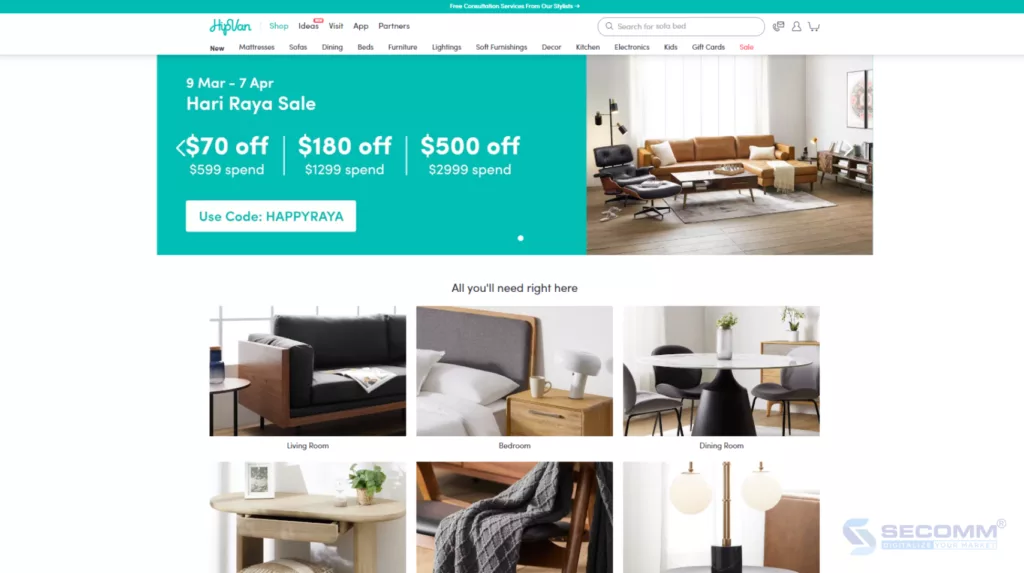
HipVan is an online retail website specializing in furniture and home decor, headquartered in Singapore. The brand was founded in 2013 with the aim of providing customers with high-quality furniture products at affordable prices, along with a convenient shopping experience and excellent customer service.
HipVan’s website is built using the Ruby on Rails and React framework, with Ruby being the primary programming language. Its notable features include building a community for sharing interior design ideas, image-based product search, and allowing customers to upload images of desired products. Particularly, the augmented reality (AR) feature enables customers to view products in their real-life space before making a purchase. Additionally, HipVan offers free interior planning services to help customers conveniently plan and design their living space.
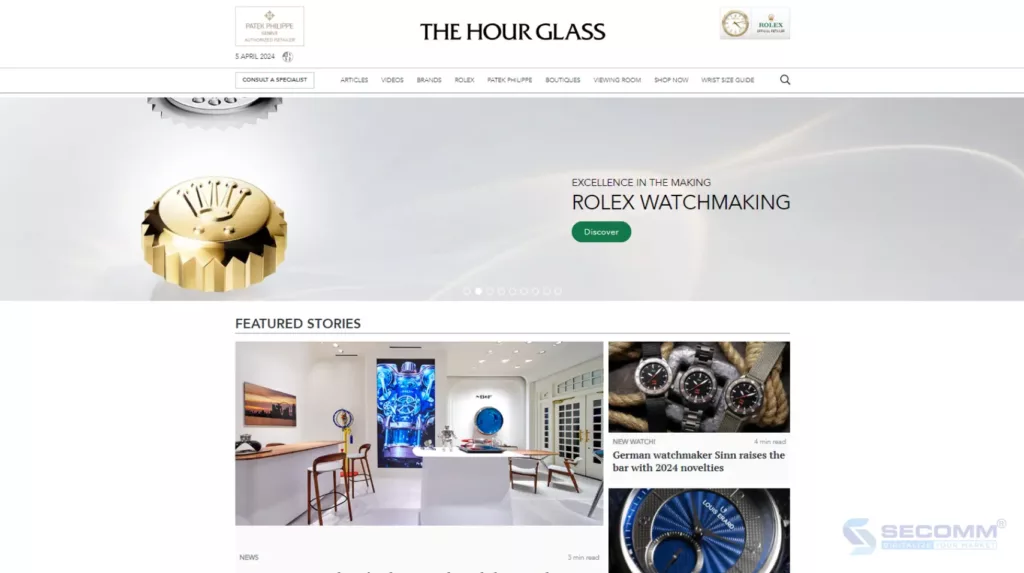
The Hour Glass is a premium watch retailer in Singapore founded in 1974. Currently, The Hour Glass has over 50 stores worldwide and is an authorized distributor for many leading watch brands such as Rolex, Patek Philippe, Audemars Piguet, Omega, Cartier, and more.
The Hour Glass’s online store is built on the WooCommerce platform and CMS WordPress, providing a convenient platform for customers to explore and purchase watches from renowned brands like Rolex, Patek Philippe, Audemars Piguet, and other luxury brands. In addition to product offerings, the website also provides detailed information about the services offered by The Hour Glass, including repairs, maintenance, and polishing of watches, to help customers maintain and preserve their products effectively. Furthermore, the website continuously updates the latest news in the watch industry along with special events organized by The Hour Glass, creating a comprehensive and immersive experience for users.
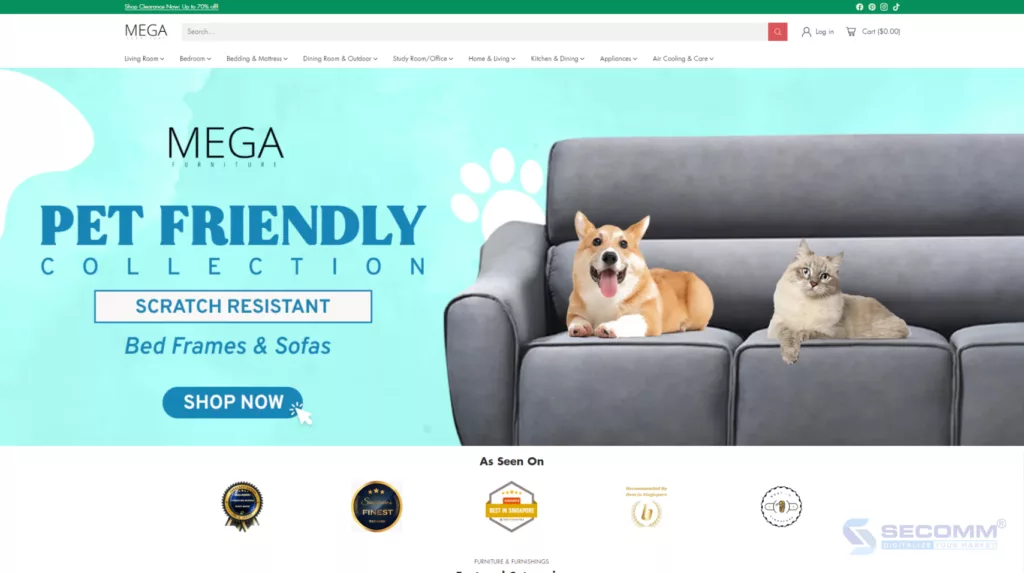
Megafurniture is a furniture retail company in Singapore, specializing in providing a range of furniture products for living rooms, bedrooms, dining rooms, and various other spaces in homes. Megafurniture is known for offering affordable and high-quality products, attracting the interest of many consumers. Additionally, the furniture brand is also renowned for its early investment in the online store, allowing customers to conveniently shop for furniture online.
Megafurniture’s website is built on the leading Shopify Plus platform, with basic and advanced features optimized for the furniture industry. The purchasing process is designed to be simple and straightforward, providing a convenient online shopping experience for customers. Secure online payment support through various methods increases flexibility for consumers. Megafurniture also offers multiple delivery and installation options to meet customer needs. Moreover, features like quick product view and product comparison assist users in making smart and efficient purchasing decisions. This, combined with fast checkout features, significantly enhances the online shopping experience.
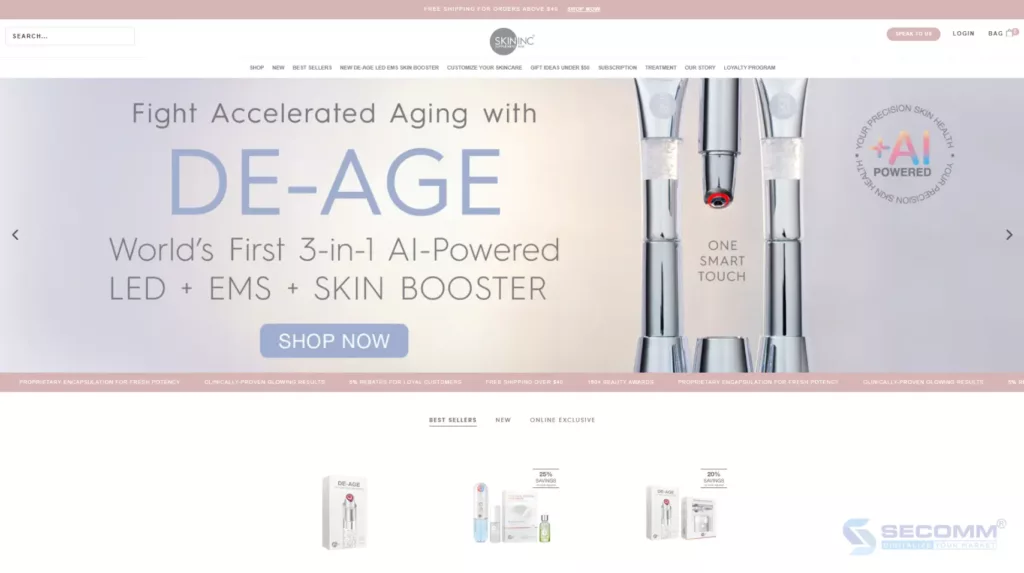
Skin Inc is a skincare brand specializing in manufacturing and distributing high-quality skincare products. The company focuses on providing skincare solutions, including brightening, moisturizing, anti-aging, and treating various skin concerns.
Skin Inc transitioned from the Magento platform to Shopify Plus in 2019, aiming to enhance the customer experience by deploying multiple website versions for different markets and customer segments. Using the LaunchPad feature, Skin Inc employees can create sales events without developer assistance. Additionally, Shopify Plus seamlessly integrates with marketing tools and loyalty programs, enabling personalized communication and data-driven marketing strategies.
Conclusion
The above is a list of the top 10 eCommerce websites in Singapore. By implementing leading platforms such as Magento Open Source, Shopify Plus, and various others, these brands provide optimized online shopping experiences, attracting the interest of customers both domestically and internationally.
During its development process, SECOMM has collaborated with numerous clients from Singapore to create notable eCommerce websites, with the most prominent being the project to develop an online liquor supply system at Changi Airport.
 2
2
 2,992
2,992
 0
0
 1
1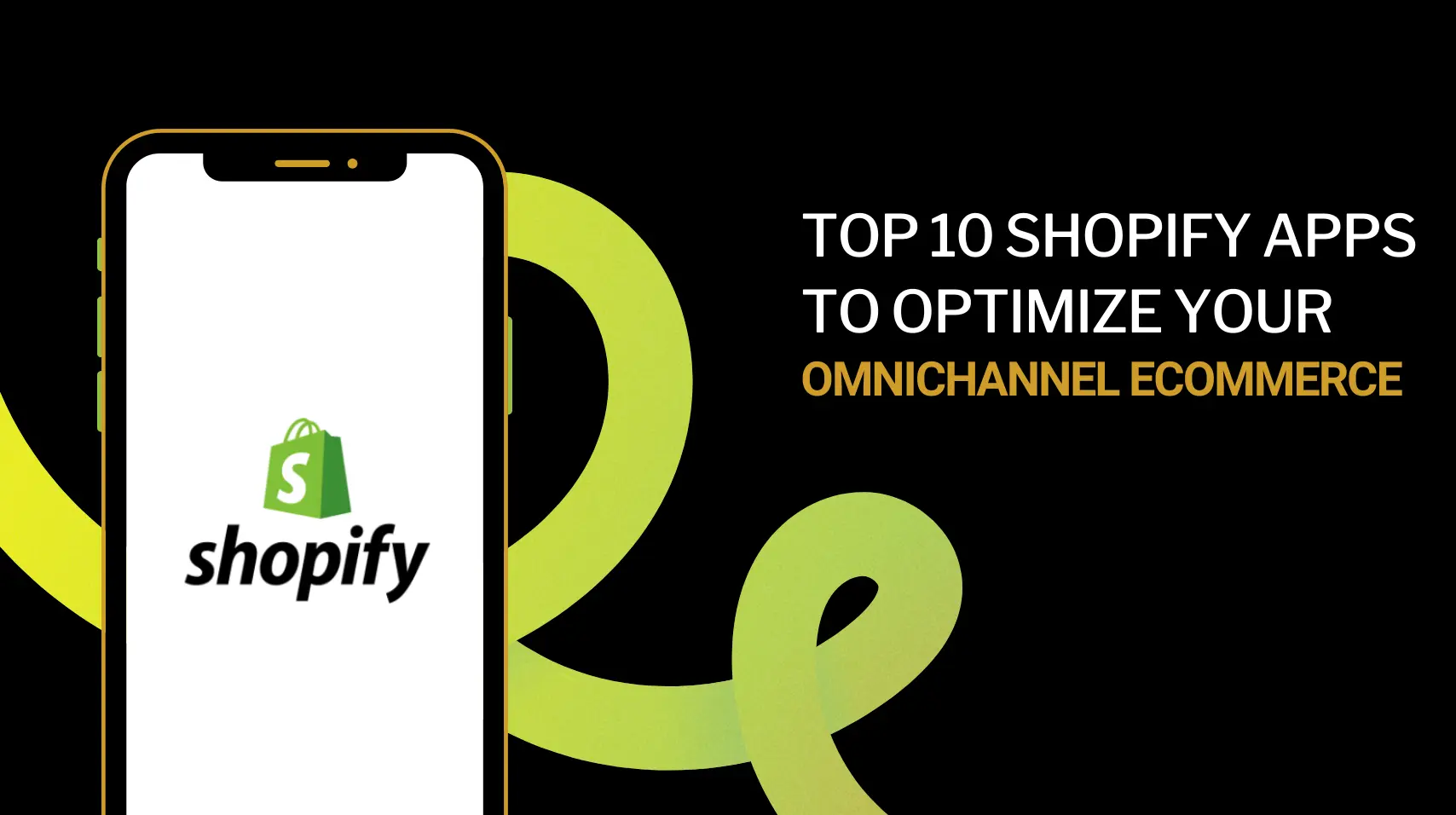
Shopify apps are recognized not just for their range of exceptional tools and features but also as robust and adaptable catalysts for business growth within the Shopify ecosystem. Beyond the code and user-friendly interfaces, Shopify apps are reshaping how businesses engage with customers both online and in-store.
But what happens when these Shopify apps are integrated into an Omnichannel system? The answer lies in the seamless combination of technology and business strategy, creating a unified and appealing shopping experience across every channel.
In this article, let’s delve into 10 top Shopify apps that you need to know to elevate your Omnichannel eCommerce strategy to new heights and deliver true value to your customers.
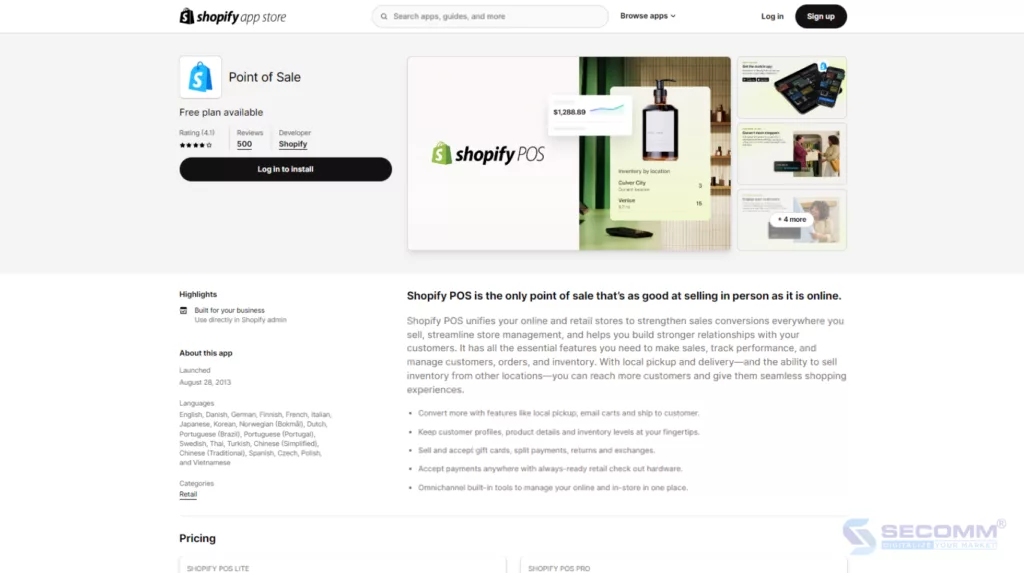
POS (Point of Sales) is known as Shopify’s most comprehensive solution for supporting online, offline and omnichannel sales activities. This Shopify app comes in two versions: Lite and Pro. Both enable merchants to accept payments, manage customer profiles, handle inventory, and track orders from all channels on a unified platform. Integrating Shopify POS helps deploy Omnichannel eCommerce more efficiently, delivering a seamless customer experience from online to offline with various shopping options such as:
Rating: 4.1/5
Key features:
Price:
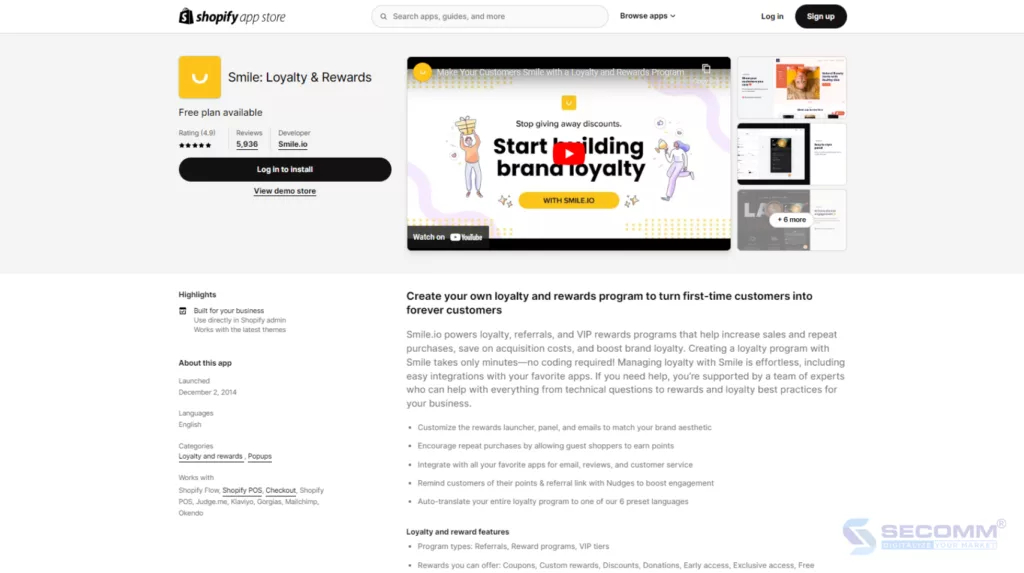
Smile is an easy-to-use platform designed to create promotional campaigns and customer loyalty programs, aiming to boost sales and customer retention. With Smile, you can establish point systems, discount vouchers and special offers to encourage repeat purchases and enhance customer interactions across various channels.
As one of the valuable Shopify apps for deploying Omnichannel eCommerce, Smile facilitates seamless integration with other marketing and sales campaigns such as email, subscriptions, and POS. This ensures a more intuitive, diverse, and engaging experience for customers.
Rating: 4.9/5
Key features:
Price:
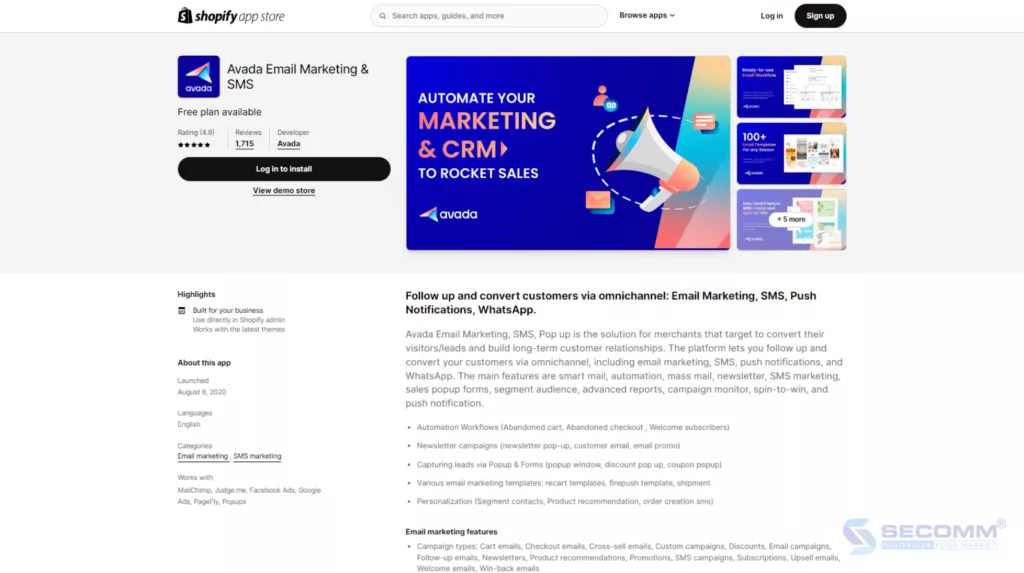
Avada is one of Shopify Omnichannel apps that allows to create and automate email marketing and SMS strategies. Regarded as an efficient solution, it enables brands to engage, follow up, convert, and foster long-term customer relationships through various channels such as email, SMS, pop-ups, push notifications, and WhatsApp. This facilitates seamless Omnichannel Marketing optimization across online and offline platforms.
Rating: 4.9/5
Key features:
Price:
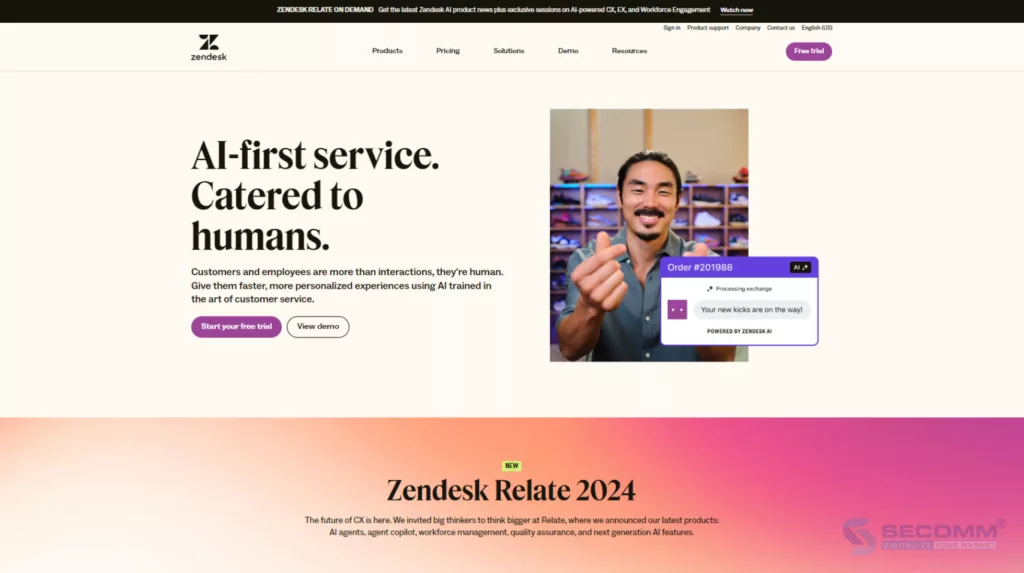
Deploying Omnichannel eCommerce or any type of online business requires meticulous customer care services. Zendesk is the perfect solution to streamline this process.
This Shopify Omnichannel app enables you to engage with customers via email, hotline, live chat, social media, and various other channels, all managed through a single, simple and intuitive dashboard. Integrating the Zendesk app into the Shopify system can enhance customer relationships and efficiently resolve customer issues.
Rating: 2.9/5
Key features:
Price:
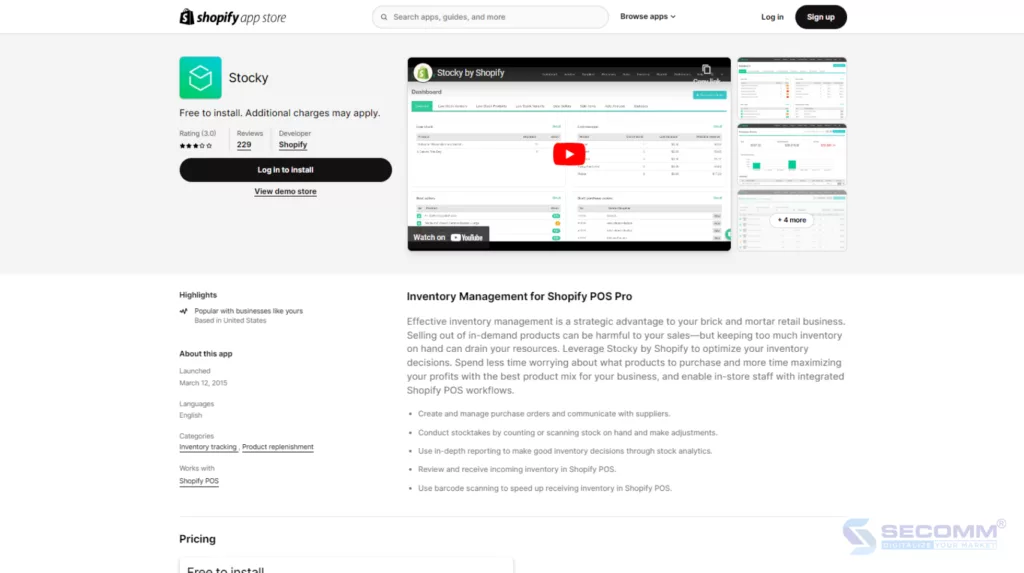
This inventory management app is specifically designed for Shopify POS Pro, offering the most advanced and comprehensive inventory solution to date. It’s also a valuable Shopify app to integrate for effective Omnichannel eCommerce deployment. Stocky allows the synchronization of order and inventory data between online and offline retail stores. This helps optimize inventory management, streamline business processes, and provide a seamless shopping experience for customers.
Rating: 2.9/5
Key Features:
Price: Free to use
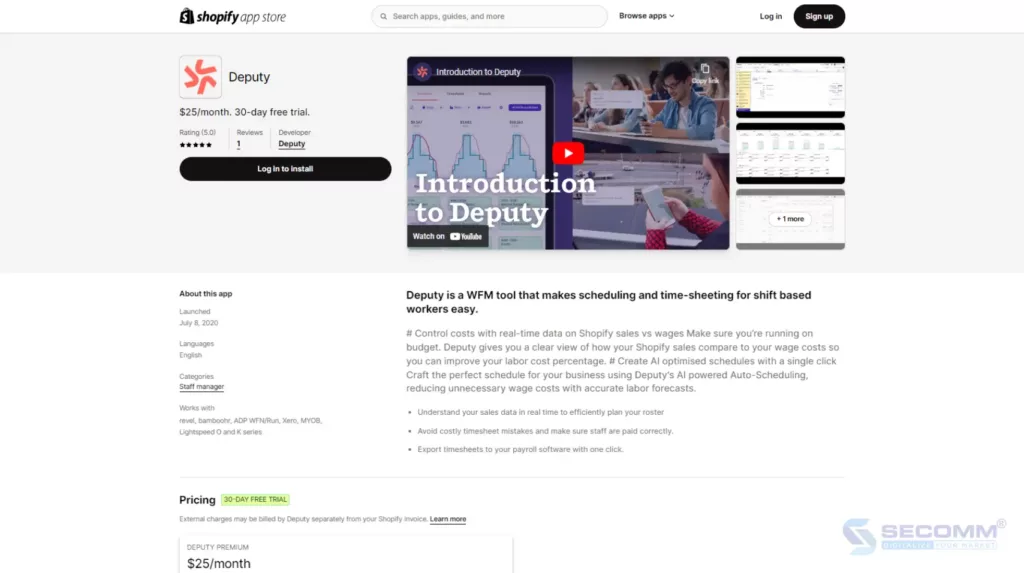
Managing personnel during Omnichannel eCommerce deployment is a challenge. Deputy is here to help overcome that challenge. With Deputy, you can optimize employee management processes and your schedules.
This Shopify app enables managers to monitor employee schedules, efficiently manage shifts, and assign tasks effectively. Additionally, Deputy leverages real-time data from Shopify sales reports, allowing managers to optimize employee schedules to minimize costs. Deputy also offers quick and accurate digital timesheets for payroll calculations.
Rating: 5/5
Key Features:
Price: Free 30-day trial. $25/month.
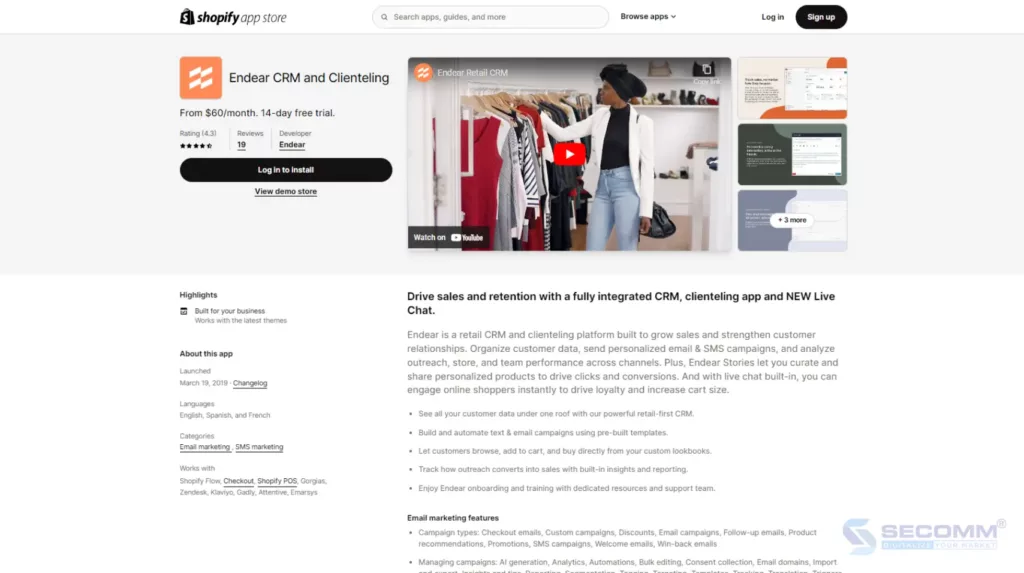
Endear is a powerful CRM and customer care app designed to help retailers increase sales and strengthen customer relationships. This Shopify app allows businesses to organize customer data, send personalized emails and SMS messages, and analyze employee outreach capabilities and sales performance.
Rating: 4.3/5
Key Features:
Price: Free 14-day trial
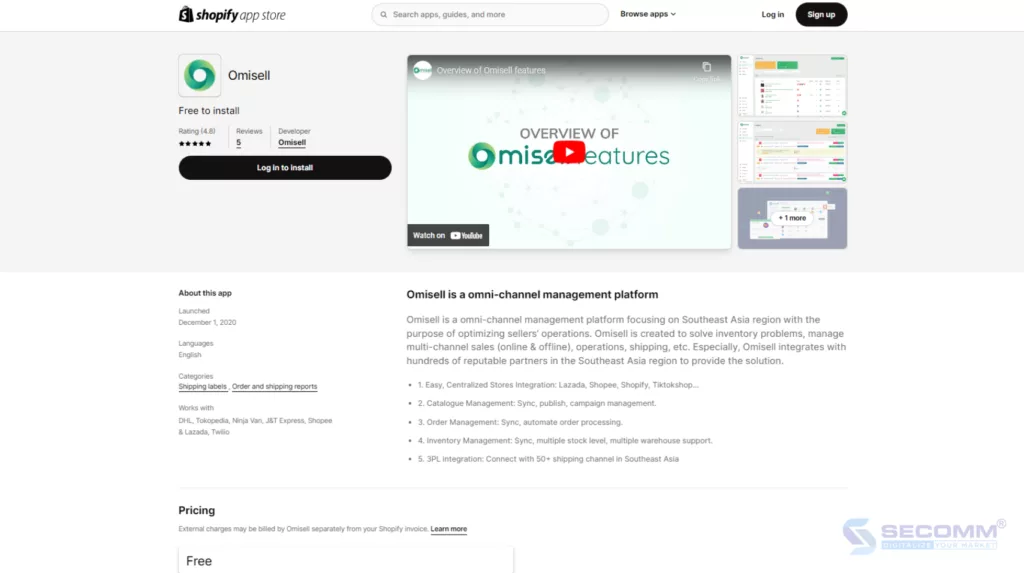
Omisell is a leading multi-channel management application, that allows one to manage orders, inventory, and deliveries across multiple sales channels from a single interface. This Shopify app helps optimize management processes and ensures synchronization between various sales channels.
Rating: 4.6/5
Key Features:
Price: Free to use
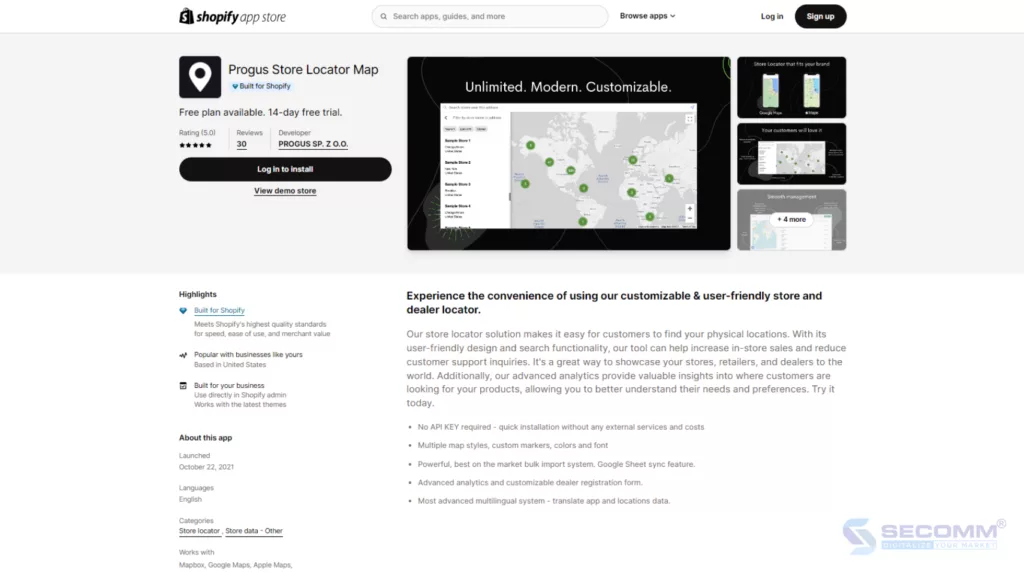
Progus is one of the useful Shopify apps that allows users to create a map displaying retail stores on the eCommerce website. This will help customers easily search for and locate the nearest store to them. This Shopify app creates a convenient and seamless shopping experience for customers from online to offline, while helping increase conversion rates.
Rating: 5/5
Key Features:
Price: Free 14-day trial
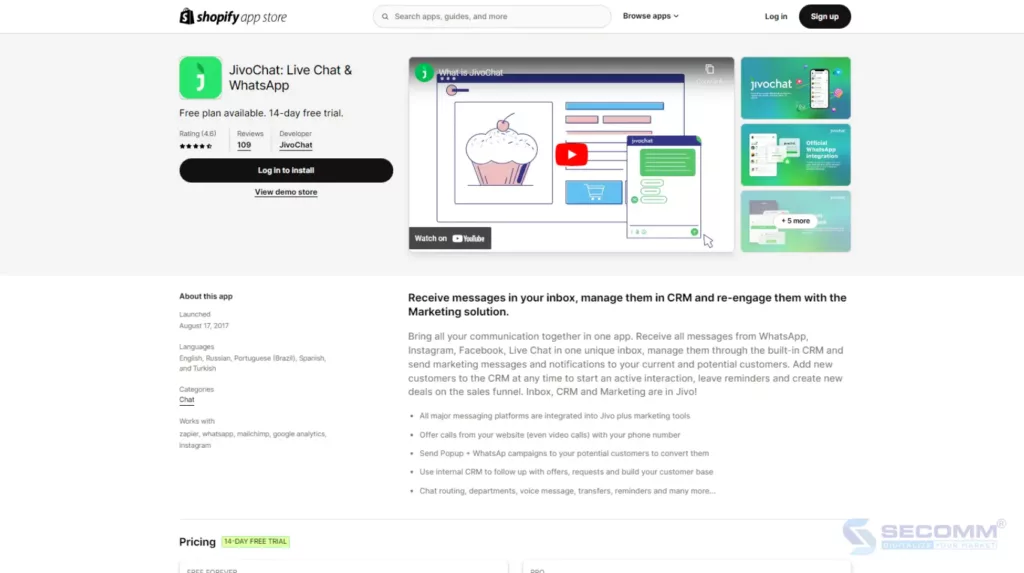
JivoChat is an app that enables users to engage in messaging exchanges to directly support customers from the eCommerce website. JivoChat can integrate and receive messages from popular platforms such as Facebook, Instagram, WhatsApp, and LiveChat. All messages are efficiently managed through an internal CRM system, allowing appropriate notifications or marketing messages to be sent to current and potential customers. This Shopify app not only provides an engaging multi-channel chat experience for customers but also strengthens the relationship between them and the business, significantly increasing conversion rates.
Rating: 4.7
Key Features:
Price:
In recent years, deploying Omnichannel eCommerce has become not just an option but a necessity for a brand to survive and thrive. With support from leading Shopify apps, brands can build a robust and flexible multi-channel sales system, providing a memorable shopping experience for their customers.
From Shopify POS to Smile, Zendesk, and Stocky, each application offers unique solutions to optimize Omnichannel eCommerce strategies. From inventory management to creating promotional strategies and direct customer interactions, each tool plays a crucial role in enhancing the shopping experience and strengthening customer relationships.
Need advice on choosing the most suitable Shopify app? Contact SECOMM or call the hotline (028 7108 9908) today!
 2
2
 2,133
2,133
 0
0
 1
1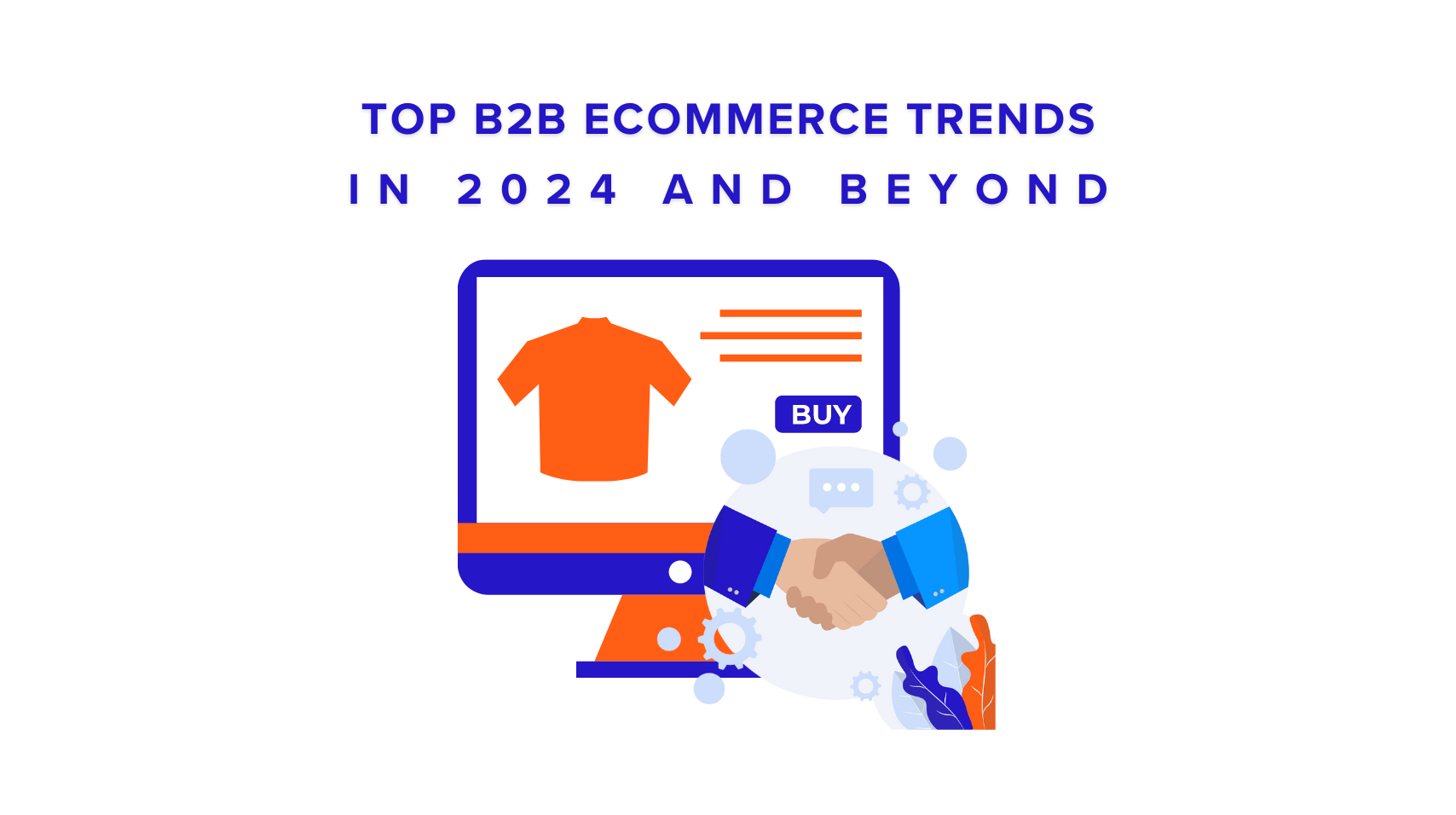
In the current B2B market, buyers are becoming more tech-savvy, mirroring the independent purchasing patterns of B2C consumers. This shift is driven by the changing demographics of B2B buyers, with 64% being Millennials and Gen Z, according to Forrester. Moreover, Gartner notes that 44% of Millennials prefer to make purchases without the involvement of sales representatives.
As a result, B2B eCommerce trends are rapidly evolving, influenced by both consumer behavior and technological progress. The increasing integration of generative AI into eCommerce, and the merging of online and offline experiences, are all pivotal trends. Keeping pace with these developments is essential; otherwise, businesses risk lagging in the fiercely competitive B2B eCommerce landscape.
In this article, let’s explore the top 8 B2B eCommerce trends that will shape the industry in 2024 and for many years to come.
AI is making big strides in online shopping. AI chatbots are now a key part of customer service, offering personalized assistance and product suggestions. For example, Shopify Magic has AI tools that help create content and provide tailored shopping advice.
Chatbots are widespread, with over 1.4 billion people interacting with these AI systems worldwide. Retailers who have adopted AI have seen a significant increase in sales. It’s predicted that by 2027, 80% of retail leaders will use AI to enhance efficiency in their operations.
Beyond retail, AI is set to make a major impact on the economy. PwC estimates that AI could contribute as much as $15.7 trillion to the global GDP by 2030, affecting many industries.
Businesses are increasingly turning to automation to improve efficiency without growing their teams. According to Markets and Markets, the marketing automation industry is expected to grow from USD 5.2 billion in 2022 to USD 9.5 billion by 2027, with a 12.8% yearly growth rate. Additionally, 57% of companies plan to use automation to make their employees more productive.
Shopify Flow is a tool that automates routine tasks for businesses. It activates specific actions based on rules set by the user, simplifying the workflow.
With the rise of AI and automation, businesses are increasingly embracing an omnichannel strategy. This trend allows for seamless interaction across various channels, helping companies to be more budget-efficient in managing both their online and physical storefronts, ultimately enhancing customer satisfaction.
Data shows companies with robust omnichannel engagement retain 89% of customers, compared to 33% for those without. Additionally, 59% of consumers prefer self-research over interacting with sales-focused staff, highlighting the need for sales teams to prioritize customer guidance. Moreover, establishing a solid omnichannel base is essential, followed by streamlining all digital touchpoints for a unified and efficient customer journey. You can learn more on how to build an effective omnichannel strategy here.
In B2B e-commerce, the harmony of digital touchpoints is essential for delivering an exceptional customer experience and driving sales. Integrating all digital channels, such as payment systems, online stores, and customer support, is crucial. This integration provides a unified customer profile, streamlining management across multiple channels and focusing on omnichannel sales.
Streamlining transcends mere system connections; it ensures seamless data flow for personalized customer interactions. For instance, leveraging browsing habits for advertising and purchase history for customer service can develop comprehensive customer profiles.
Ultimately, streamlining is about fostering a consistent, reliable customer experience that bolsters brand interaction. Companies excelling in this are well-positioned for enduring success in the competitive B2B e-commerce market.
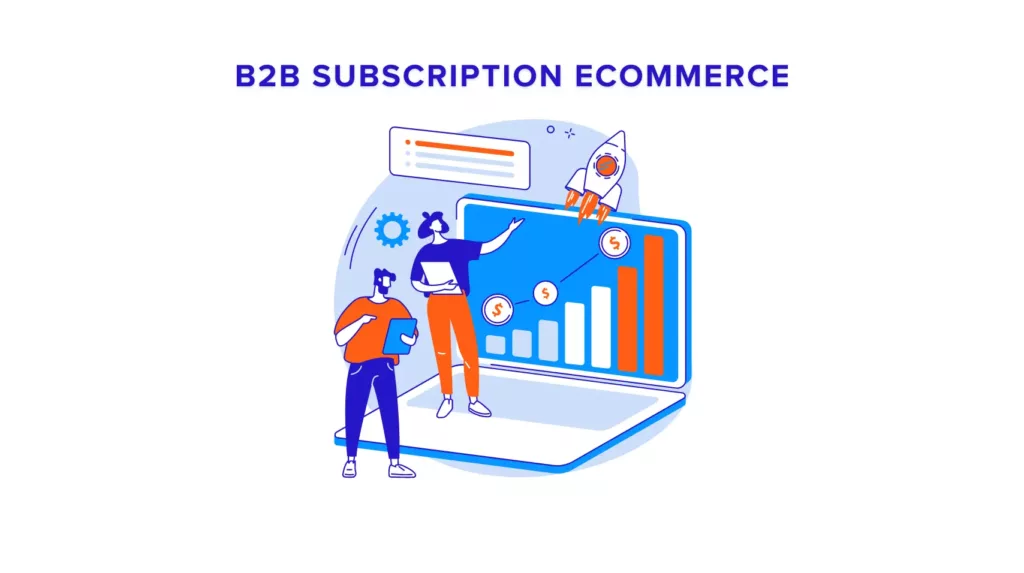
Subscription models are becoming vital for customer loyalty in B2B eCommerce, with the Global Subscription eCommerce Market expected to hit US$ 478 billion by 2025. These models offer a predictable revenue stream and deepen customer relationships beyond one-time sales. They cater to various business needs, from product supplies to software services. Moreover, as buying habits shift online, subscriptions align with customer preferences for self-services and problem-solving services.
Moreover, businesses often find that prioritizing the enhancement of the customer experience yields better results than constantly pursuing new leads. In the B2B sector, nurturing existing relationships and promoting additional purchases can be more profitable strategies than seeking out new customers. Find more about subscription eCommerce here.
Headless architecture is a way of building online stores where the front-end and back-end work separately but talk to each other through an API. This setup lets the back end hook up with any front end, making it perfect for businesses that sell across different channels.
Looking ahead to 2024, headless B2B eCommerce is on the rise. It’s not going to replace traditional eCommerce completely, but it gives businesses a leg up by being more adaptable, integrating better with other systems, scaling up easily, and making life easier for developers. All this leads to a better experience for business customers. The headless commerce market is booming; it’s expected to grow to $32.1 billion by 2027, with a yearly growth rate of 20.5%. You can find more information about headless eCommerce here.
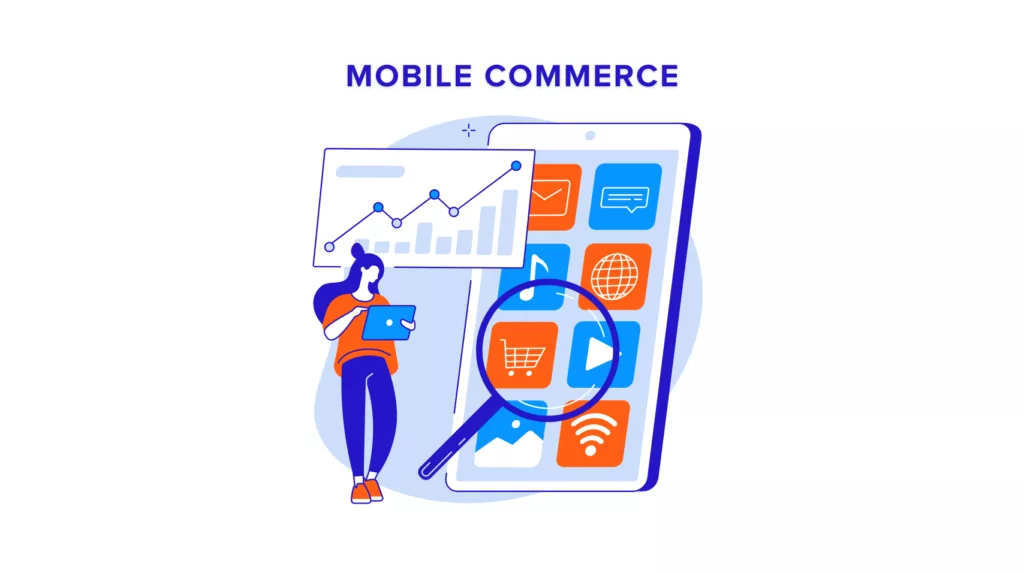
The trend of using mobile phones for online shopping is on the rise, primarily due to the advancements in online payment systems. This shift is attributed to the seamless buying experience provided by mobile commerce, where customers are quickly redirected to payment apps like MoMo or ZaloPay, offering a hassle-free transaction compared to traditional website payments that require them to pick up their phones for the payment process.
Furthermore, mobile devices are leading the charge in the B2B digital commerce evolution, with a significant majority of consumers preferring them over desktops and tablets. This growing preference underscores eCommerce platforms’ importance in crafting responsive and well-tuned mobile shopping experiences.
To leverage this trend, eCommerce sites need to go beyond mere mobile-friendliness and aim for mobile optimization. This involves designing interfaces that facilitate thumb-friendly navigation, expediting the checkout process, and ensuring swift site loading times. By concentrating on these aspects, eCommerce sites can become preferred shopping destinations, boosting online sales. In the realm of mobile commerce, the ease and speed of the shopping experience are directly proportional to the likelihood of completing a sale.
The B2B eCommerce sector is rapidly adopting digital efficiency in payment processes. Automation and advanced digital transactions are replacing traditional methods, significantly reducing operational costs and manual labor. This modernization benefits both companies and customers, offering a more streamlined payment experience.
In the dynamic realm of B2B eCommerce, the transition from traditional payment methods to automated and advanced digital transactions is accelerating. A study by Markets and Markets highlighted that adopting automated payment systems can reduce operational costs for accounts receivable departments by 50% and cut down manual tasks by 85%. This evolution is beneficial not only for businesses but also for customers, who now have the convenience of making payments at their own pace, thus enhancing the overall payment experience.
The proliferation of mobile technology has revolutionized both shopping and payment behaviors. As smartphones become integral to the consumer journey, offering various payment options, including digital wallets like Apple Pay or Samsung Pay, has become essential. The year 2024 will mark a point where not accommodating such payment methods could be detrimental to customer retention.
The ‘Buy Now, Pay Later’ (BNPL) model is emerging as a significant trend, particularly in Vietnam, where it’s a departure from the traditional installment payments. Platforms like Shopee are incorporating BNPL, indicating its potential to reshape the B2B payment landscape significantly.
In the US, Buy Now, Pay Later (BNPL) has won over more than a third of consumers recently, and it’s also gaining traction in Europe and Africa. This surge is tied to shifts in how people, particularly the younger crowd, prefer to manage their money, with BNPL’s flexible and wallet-friendly options being a hit. Gen Z is leading the BNPL charge, as they’re stepping into the workforce in big numbers. The trend shows that BNPL use among Gen Z is set to grow from 36.8% in 2021 to 47.4% by 2025. You can read more about BNPL here.
Augmented Reality (AR) is transforming B2B eCommerce, turning simple spaces into interactive showrooms. With AR, businesses create 3D models that customers can explore in detail, offering an engaging experience far beyond what static images can provide.
Vietnam is riding the AR wave with remarkable vigor. The market is booming, with forecasts predicting a surge from US$96.4 million in 2023 to US$181.5 million by 2028, thanks to an impressive annual growth rate of 13.48%. AR is already a hit in children’s books and playgrounds, but it’s set to become a staple in our everyday lives, moving beyond novelty to become a standard in our daily routines, especially in the B2B eCommerce market, much like the memorable Oreo campaign during Tet 2020.

Wrap Things Up!
B2B eCommerce is booming, outpacing traditional stores. This surge is driven by digital advances and the economic shift after the pandemic. It’s not just a change; it’s a new online business era, where tech innovations benefit both shoppers and companies.
Navigating the digital marketplace can be complex, but you don’t have to do it alone. With a solid decade of crafting B2B eCommerce solutions, SECOMM is here to support your business’s growth journey. Feel free to contact SECOMM or call our hotline at (+84) 28 7108 9908 to discover solutions that align with the latest trends and propel your business forward.
 2
2
 3,225
3,225
 0
0
 1
1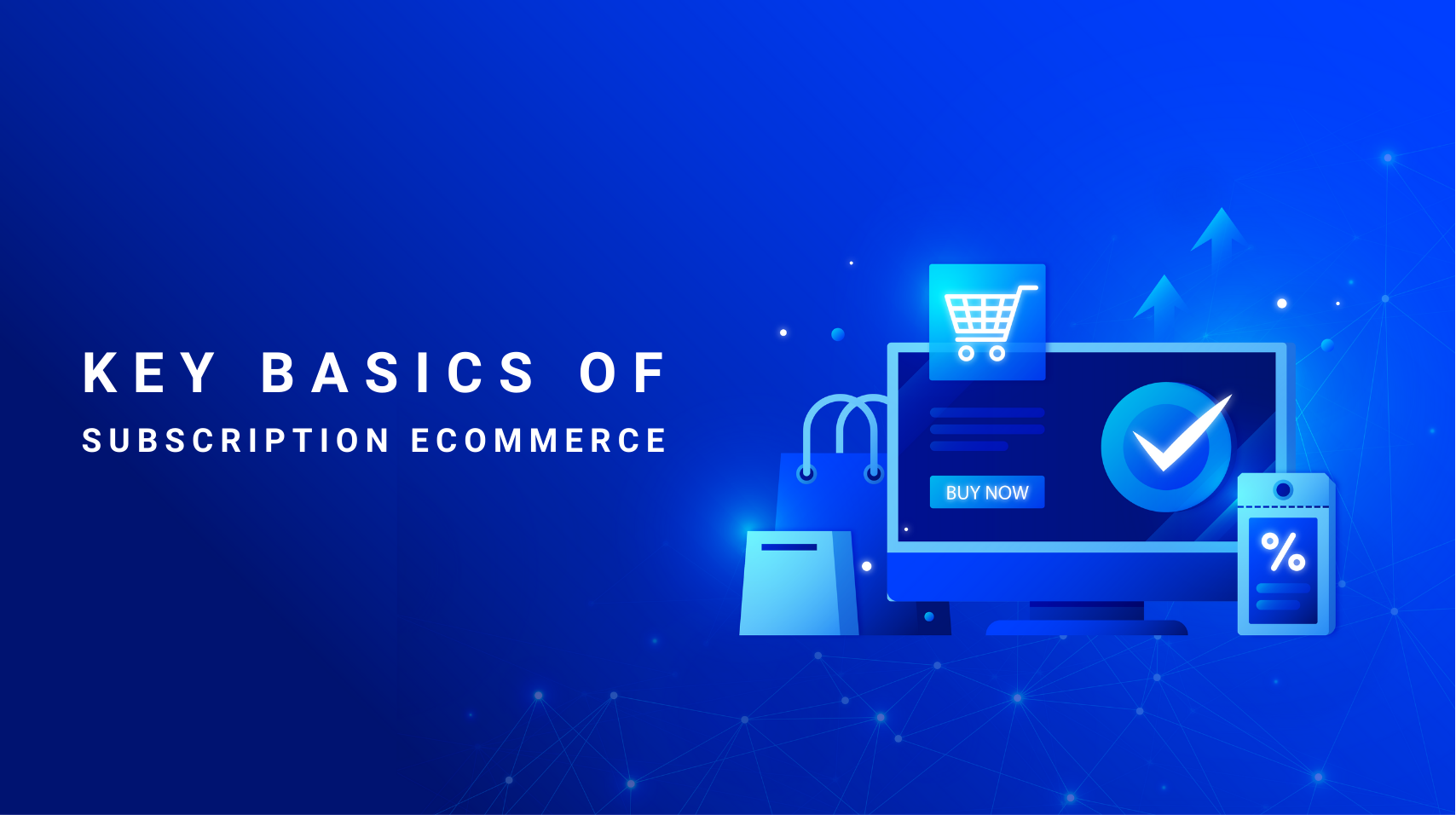
Subscription-based eCommerce, while not a novel concept, is increasingly being adopted in tangible forms, preserving its inherent value. Consider, for instance, the scenario of launching a seafood restaurant. You enter into an arrangement with a seafood supplier who commits to delivering fresh seafood daily.
This arrangement exemplifies a subscription model, which often includes perks such as discounts, promotional offers, or simply more favorable pricing compared to purchasing items individually from various suppliers.
If the concept still seems unclear, fear not! We’ll delve deeper into the mechanics of subscription eCommerce in the paragraphs below.
Subscription eCommerce is a business model where customers subscribe to receive regular deliveries of products or access to services over a specified period. Transactions are facilitated online, and customers continue to receive deliveries until they choose to cancel their subscription or until the agreed-upon subscription term concludes. Payments can be various, including one-time payments, periodic billing cycles, or automated payments.
In addition, there are several types of subscription-based online shopping, but in this blog, we will mention three common types. The first one is product or service subscriptions in which customers will receive annual product delivery or service access like gym memberships, daily grocery goods, etc.
The second one is the membership program, which is quite similar to most people. A good example of this could be “Hoi Cam” from Guardian, where customers can get exclusive discounts and a lot of benefits when joining.
The third one might be familiar to many of you, which is called Software-as-a-Service (SaaS). For example, when using Microsoft 365 or Canva customers need to pay monthly or yearly to use all the functions of the tools and software. You can find more about SaaS here.
Additionally, the eCommerce subscriptions market seems to have risen steadily in recent years with the global market size reaching US$ 193.6 Billion in 2023. Moreover, this number is forecasted to reach US$ 5,014.4 Billion by 2032, showing a growth rate of 43.56% from 2024 to 2032.
From the information above, it prompts an important consideration: what are the tangible benefits and drawbacks for businesses when adopting eCommerce subscription programs? Assessing the impact of these programs is crucial for understanding their influence on operational dynamics and customer engagement.
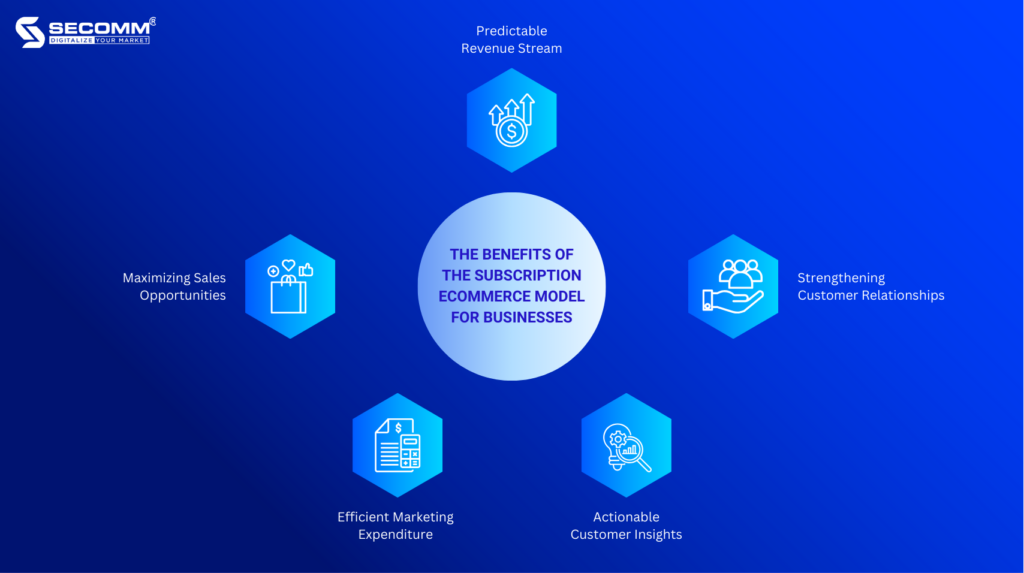
ECommerce subscription models aren’t just a trend; they are a strategic approach that offers businesses a plethora of benefits, from predictable revenue to deepening customer relationships.
Contrary to the unpredictable nature of one-time transactions, subscription models offer a steady revenue flow. This advantage enables your organization to formulate a comprehensive budget for marketing endeavors spanning an entire quarter or year, necessitating only slight adjustments. Essentially, businesses are equipped to more accurately project their financial trajectory by establishing a consistent subscriber base pledged to recurrent payments. This later helps enhance strategic planning and facilitate expansion prospects.
Subscriptions are more than transactions; they are the foundation of a long-lasting relationship with customers. A study by Zuora highlights that 93% of subscribers believe companies should invest more in customer satisfaction. By adopting a subscription model, businesses are not merely selling a product—they are nurturing a connection that encourages customers to return, fostering loyalty and trust.
Truly understanding customers goes beyond superficial interactions. It involves analyzing their behaviors and preferences over time. Subscription models are instrumental in gathering this data, offering insights into customer tendencies, shopping habits, and interests. This information is crucial for customizing products and services, enhancing marketing strategies, and identifying growth opportunities – all while potentially reducing market research costs.
Additionally, enterprises need to capitalize on the insights derived from their eCommerce subscription base to enhance marketing initiatives, rather than allowing this valuable data to remain underutilized. Armed with an in-depth understanding of customer predilections, companies are empowered to devise bespoke experiences that truly engage their clientele. This strategic personalization not only bolsters customer loyalty but also fortifies the company’s market position, diminishing the likelihood of customers exploring alternative options.
Subscribers typically exhibit greater loyalty and, as a result, have a propensity to increase their expenditure over time, which can significantly enhance a company’s profitability. Additionally, the subscription framework provides fertile ground for upselling and cross-selling strategies. Businesses can boost their average order value and realize extra revenue from their current subscribers by offering assorted subscription options or supplementary products and services. Take, for instance, a fitness establishment that could propose special offers on workout gear to its patrons, thereby establishing a reciprocal relationship where the customers benefit from the perceived value, and the business sees a rise in sales.
Understanding the purpose and goals of your eCommerce subscription model is essential. Whether you’re targeting revenue growth, increased profitability, or business expansion, defining these objectives upfront will shape a successful strategy.
Ease of subscription is crucial in the eCommerce industry. A straightforward and user-friendly sign-up process not only improves conversion rates but also increases the value perceived by customers, making them more likely to sign up.
To ensure optimal accessibility and ease of registration, it is crucial for eCommerce subscription services to be prominently featured and straightforward to navigate, thereby accommodating a broad digital audience. For instance, consider the “Hoi Cam” program by Guardian: the membership is subtly referenced via a brief mention in each social media post, rather than being highlighted in a dedicated post. Similarly, on their website, the registration option is relegated to a minor tab, devoid of any prominent banners to signal its presence.
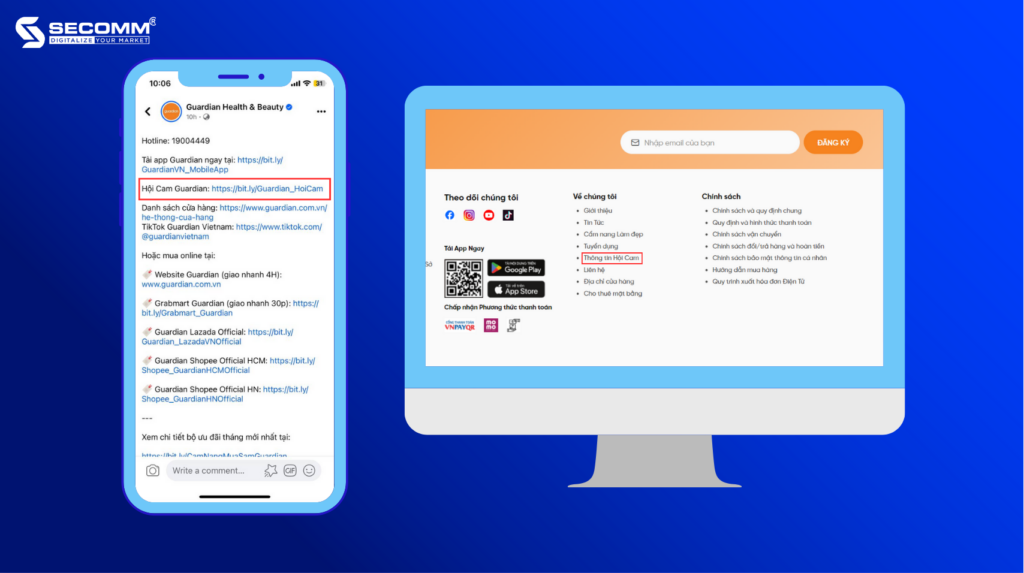
Even in physical outlets, the program is scarcely communicated by staff members. This approach necessitates that customers invest effort into seeking registration details, which could lead to frustration and a diminished user experience.
In the eCommerce subscription business, building strong customer relationships is crucial. It involves recognizing your customers’ importance. If customers don’t see the value, they may feel overlooked and undervalued, and consider other options. So, it’s important to grow loyalty and strengthen these bonds over time. Remember, when your service team consistently provides excellent support, customers will trust your brand more, which is key when they decide to renew their subscription.
Also, developing detailed customer personas is helpful. Knowing your customers’ preferences, habits, and spending limits helps you tailor your services to fit their needs, keeping them engaged and happy. When customers notice that you care about their preferences, they’re more likely to stay loyal and not switch to another business.
Your pricing strategy should reflect your product/service type, business objectives, and customer personas. Starting with a basic package covering essential services is advisable if you’re unsure of customer preferences. This approach allows you to launch your service while remaining adaptable. As you gather customer feedback and preferences, you can adjust your packages to suit different customer segments, ensuring your offerings evolve to meet customer demands effectively.
When implementing a subscription-based eCommerce model, it’s crucial to be aware of potential pitfalls to ensure seamless business operations.
The key to a successful subscription model is maintaining long-term subscriber engagement. Incorporate personalized elements, exclusive content, and loyalty rewards to make subscribers feel valued. Moreover, you could highlight the unique benefits your service offers over competitors to discourage churn.
For new subscribers, businesses need to simplify the sign-up and showcase their services’ value straightforwardly to reduce the likelihood of early drop-offs.
If your business involves physical goods, managing inventory against customer demand is critical. Monitor customer preferences closely and adjust inventory accordingly. Always have a contingency plan for supply chain disruptions to maintain consistent product availability.
As your subscriber base expands, the complexity of your infrastructure must evolve accordingly. Consider the user experience – a seamless service is expected, particularly for digital offerings akin to Canva. Your infrastructure should be robust enough to handle a spike in users without compromising performance.
Is everything making sense so far? Before we conclude today’s session, let’s examine the following case study for a practical understanding.
Amazon Prime serves as an exemplary model of subscription eCommerce success, offering a suite of benefits that extend well beyond swift shipping. Subscribers gain access to an array of advantages, such as complimentary two-day delivery, an extensive library of streaming content, and exclusive shopping deals. This service is not merely about rapid order fulfillment; it represents a continuous stream of value and convenience.
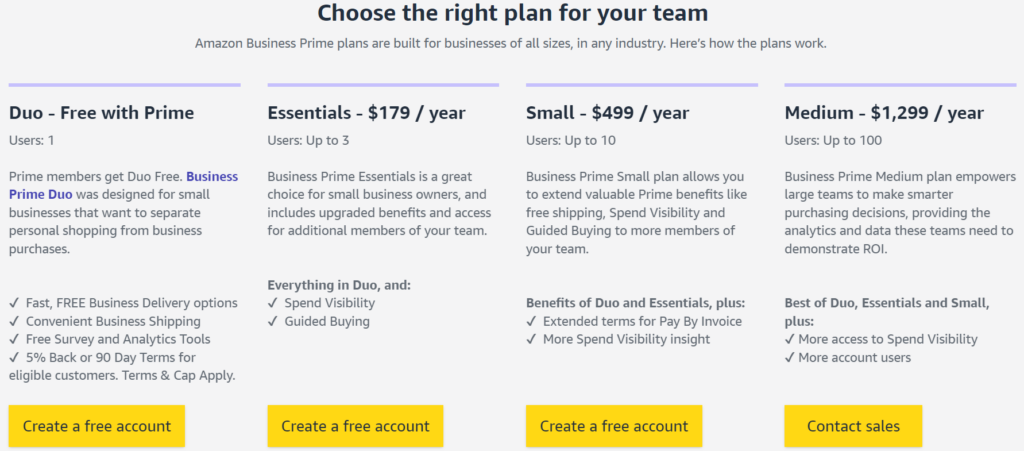
The distinctiveness of Amazon Prime lies in its amalgamation of various services into a single subscription package, which streamlines customer experience and fosters brand loyalty. The program’s expansion reflects Amazon’s dedication to customer satisfaction and its strategic addition of new perks, all while integrating seamlessly with the larger Amazon eCommerce ecosystem. This strategic bundling is a key factor in customer retention, positioning Amazon as a leader in the eCommerce sector.
Subscription eCommerce is a strategic approach adopted by numerous businesses, yet only a select few have truly harnessed its potential. This guide is designed to deepen your understanding and provide actionable insights to effectively utilize subscription eCommerce. For those ready to embark on this journey and in search of a trusted advisor, Secomm is your ideal partner. We offer end-to-end solutions to address all your eCommerce needs, from technical infrastructure to event management.
 2
2
 3,116
3,116
 0
0
 1
1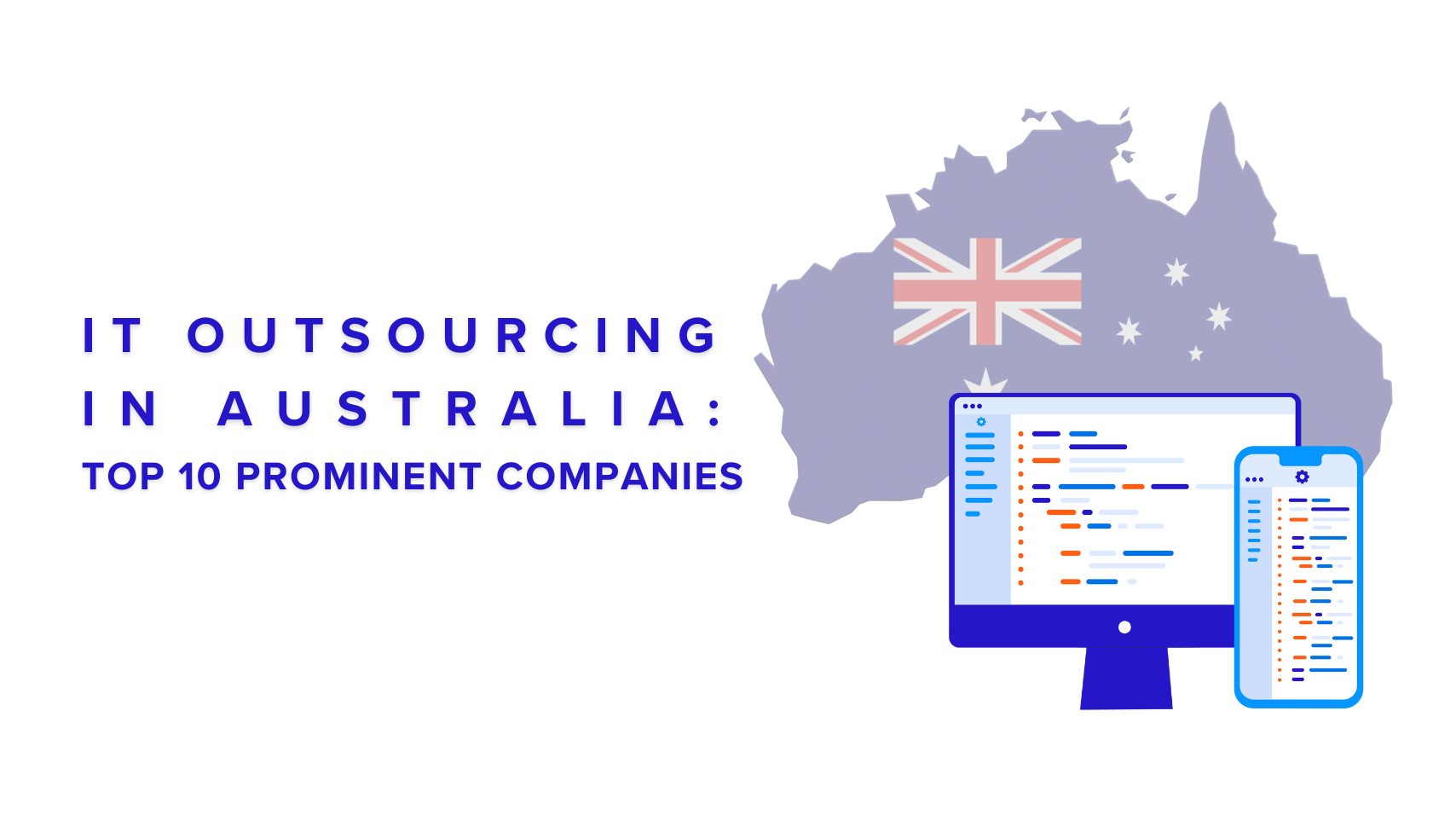
IT outsourcing in Australia is emerging as one of the most rapidly growing and attractive fields in the information technology market. As technology projects become increasingly complex and diverse, Australian businesses are increasingly serious about finding highly skilled outsourcing partners to address technical challenges and product development.
In this article, let’s explore the top 10 IT outsourcing firms in Australia, what makes them stand out in this field, and the key criteria for selecting a potential partner.
In recent years, the Australian IT outsourcing sector has undergone remarkable development, reflecting the boom of the information technology field in the country’s economy.
According to Statista, the projected market revenue for IT outsourcing in Australia in 2024 is expected to reach $14.49 billion, with a CAGR of 10.99% from 2024 to 2028. This indicates substantial prospects and expansion potential.
One crucial factor driving this growth is the emphasis on quality and efficiency. Australian IT outsourcing firms have heavily invested in workforce development and infrastructure to ensure they can deliver high-performance services and meet their clients’ increasingly complex technical requirements.
Furthermore, technological innovation has significantly contributed to this impressive growth. Adopting new technologies such as artificial intelligence, machine learning, and blockchain has opened up numerous opportunities for IT outsourcing firms to provide breakthrough and effective solutions for their clients.
When deciding on a partner to use IT outsourcing services in Australia, you must consider various criteria to ensure the partner can provide services that meet their needs. Below are four key criteria for choosing the right Australian IT service provider.
You need to ensure that the Australian IT company has experience and expertise in the field they are interested in. For example, shopping applications can be developed on the iOS operating system using the Kotlin language. The experience and deep knowledge of the IT outsourcing firms in a specific technology and industry will determine whether they are a potential partner.
This is the next important factor to consider. You need to check whether the IT outsourcing firm has high-quality standards and whether they have good experience in providing solutions and services to similar clients. Reviewing portfolios and engaging in direct consultations will help businesses evaluate more easily.
Social Proof is quite useful in this case. Before making a final decision, you can check reviews, feedback, and gather opinions from customers.
Finally, you need to consider the issue of pricing that the IT outsourcing firm offers, as well as the overall project costs for collaboration. Ensure that the price they offer is suitable for the business budget and that they can provide optimal solutions to meet the project’s requirements.
The companies listed below are all top names in the IT outsourcing field, with extensive experience and knowledge. They provide the highest-quality services and solutions to meet customers’ diverse needs in complex business environments.
Over the past ten years, SECOMM has become a leading provider of eCommerce solutions in Vietnam for its clients’ general and specific information technology projects. SECOMM is committed to providing clients with a team of skilled professionals capable of quickly adapting to the technological advancements of the era.
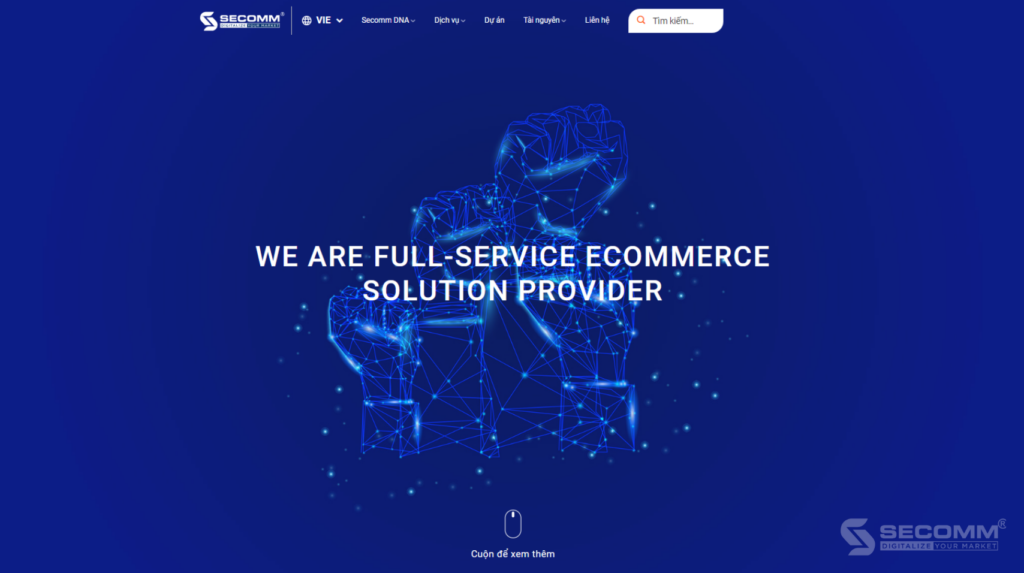
Seasia Infotech is a leading software development company in Australia. It provides custom software solutions and mobile application development. The company also offers IT outsourcing services, including developing a dedicated IT team for a specific project.
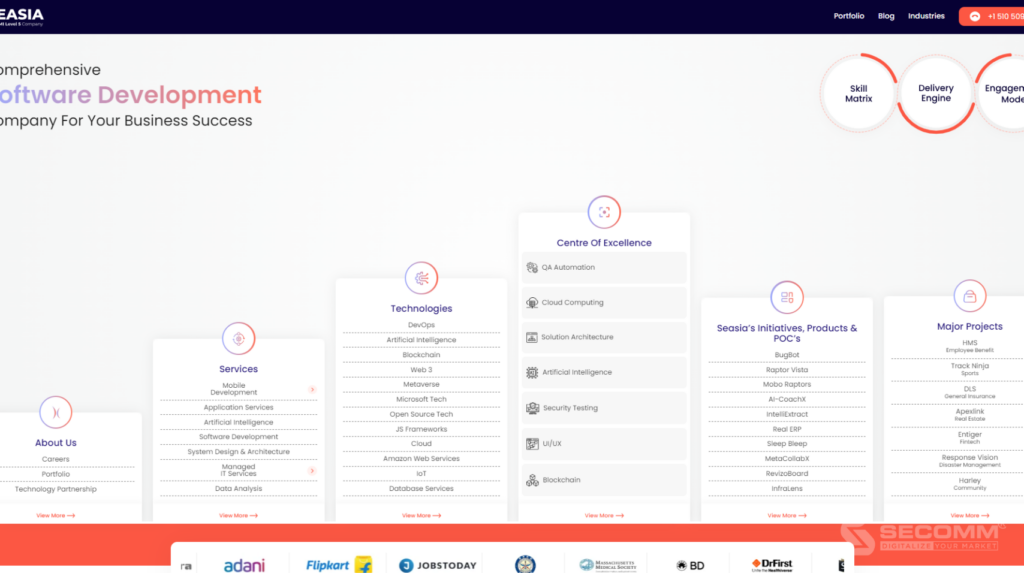
OpenXcell is one of the leading companies in the field of mobile application and software development in Australia. Its personnel and IT team are professional and outstanding. OpenXcell also ensures experience, skills, and knowledge to meet the specific requirements of the project.
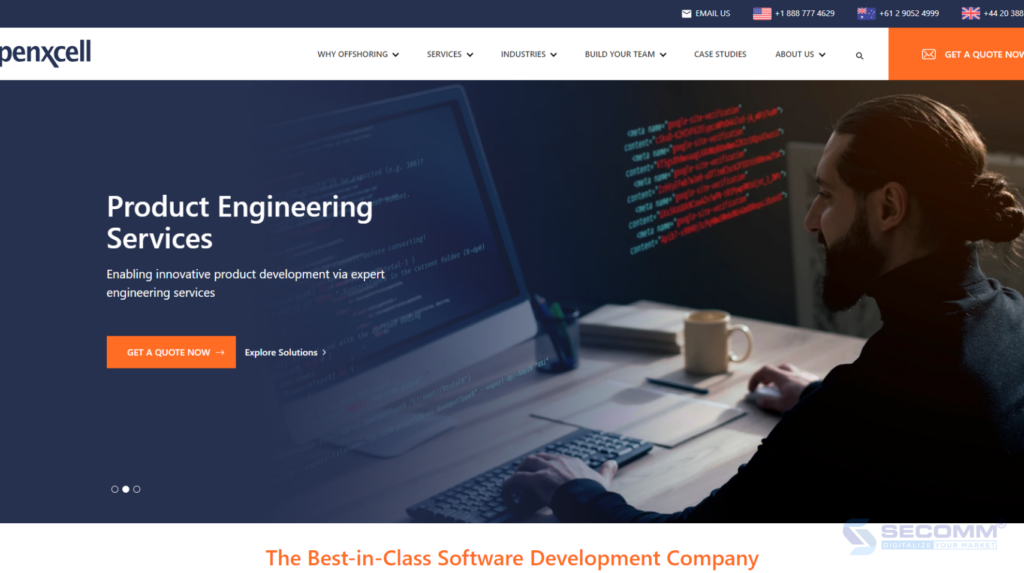
Offshore Business Processing specialises in IT outsourcing services, including data processing, digitalization, and human resource management. Over the years in the market, the company has become a reliable partner of many leading businesses in Australia
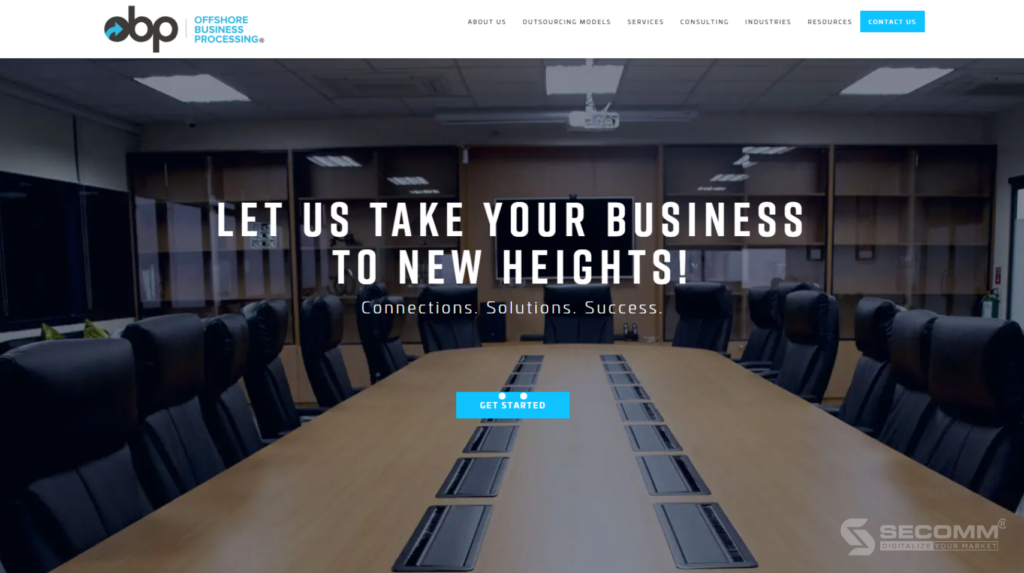
KMS Solutions is a well-known name in the Australian IT outsourcing industry. This company offers various information technology services, from software development to IT infrastructure management.
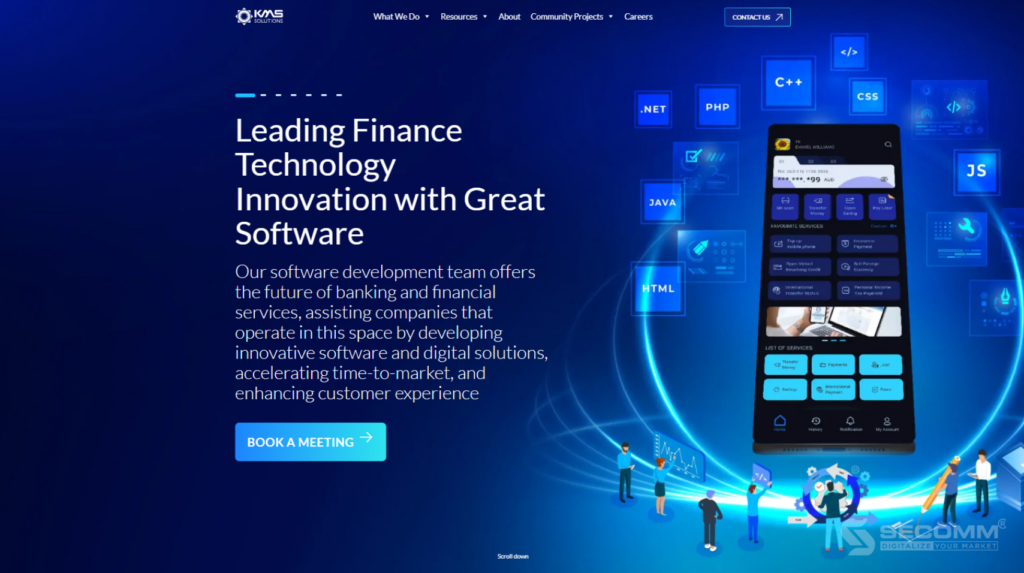
Ontik Technology is a pioneering company providing information technology solutions and custom software for Australian businesses. As IT outsourcing is becoming increasingly popular in Australia and Asian countries, Ontik Technology expands its services with a high-quality team of professionals.
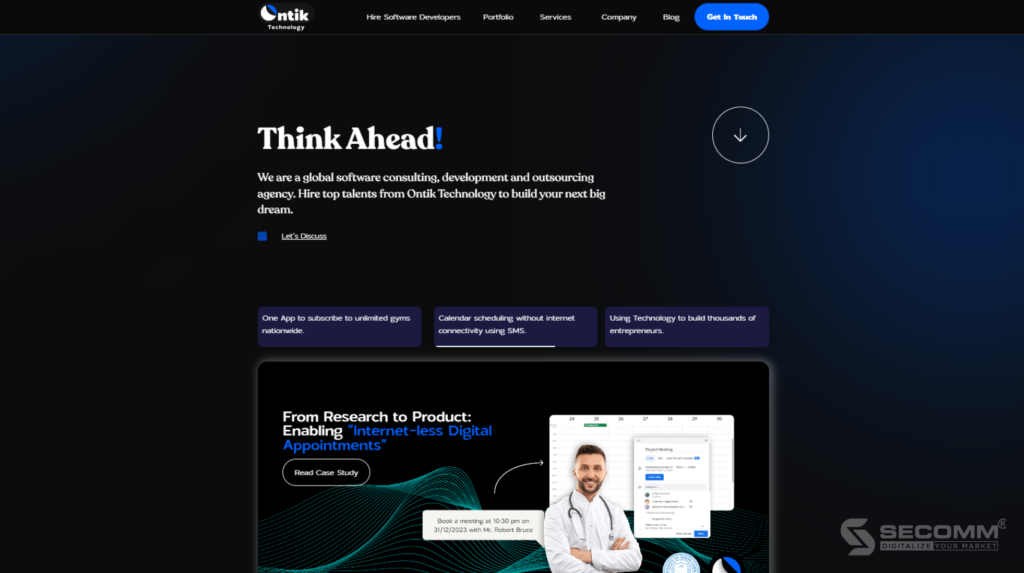
In addition to providing professional IT outsourcing teams, AIS Technolabs also offers Australian businesses custom software solutions, mobile applications, and web development services.
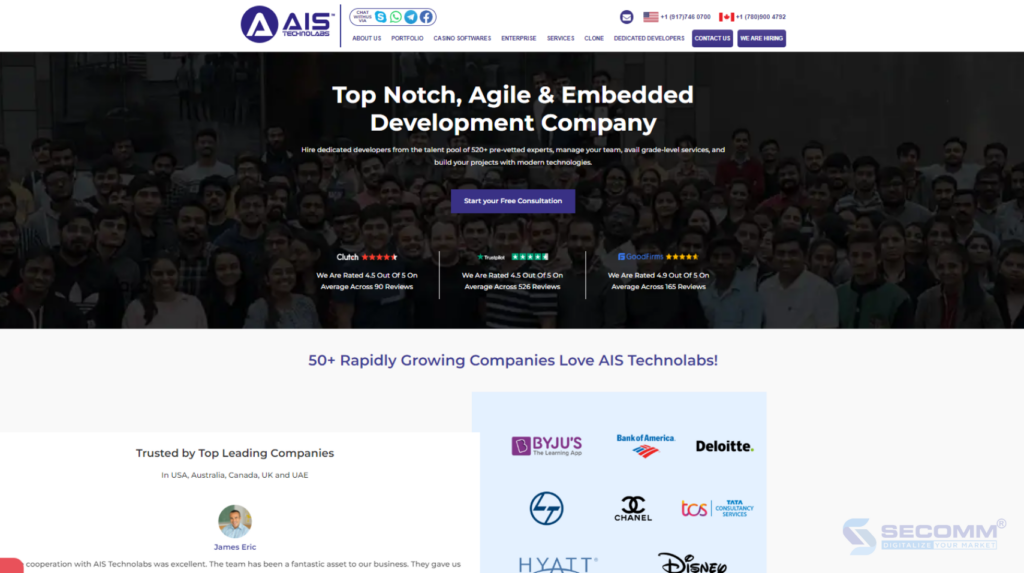
pwrteams possesses a highly skilled IT team in various aspects such as app development, software, website building, SaaS application deployment, QA, and Testing. With reasonable pricing, pwrteams has assisted Australian businesses with over 200 professional IT teams for many years.
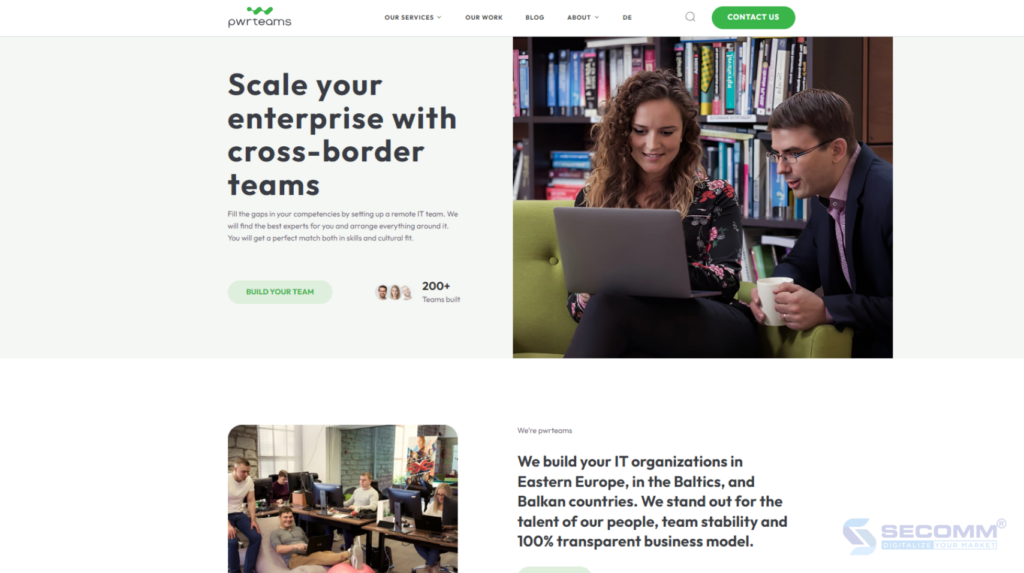
Intogreat Solutions is a renowned provider of IT consulting services and software outsourcing in Australia. Additionally, you can seek professional IT outsourcing solutions at Intogreat Solutions.
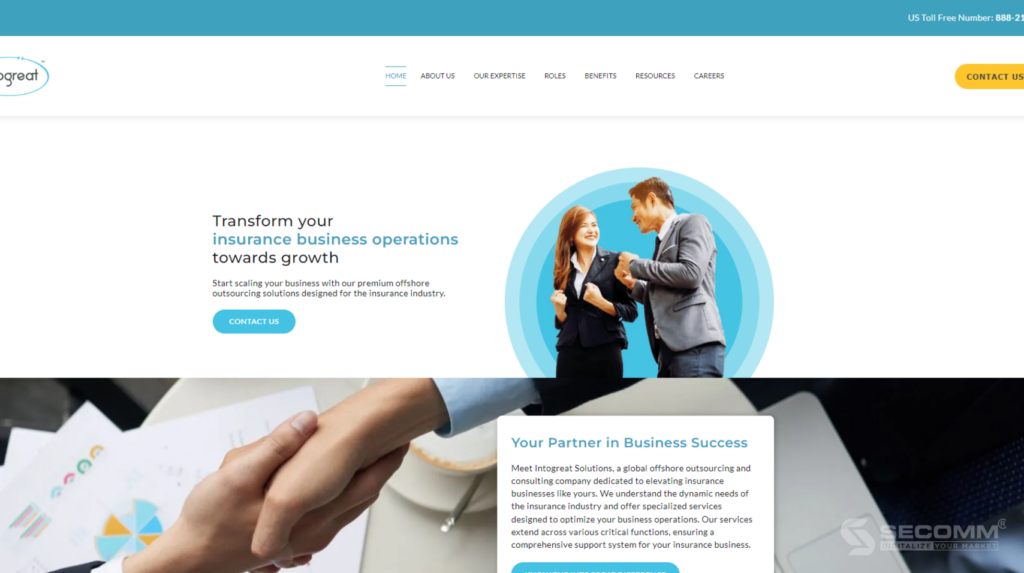
Similar to its brand name, this company provides outsourcing services for all IT-related services. All IT Services has offered reasonable and customized pricing based on the project scale and specific needs of businesses.
In an increasingly competitive and evolving information technology market like Australia, choosing the right IT outsourcing partner is key to achieving success and sustainable development for businesses. The above list has provided a diverse set of reputable and reliable partners, from software development companies to security services and IT infrastructure management providers.
Need advice or help building a professional IT team? Contact SECOM or call (+84)28 7108 9908 now!
 3
3
 4,124
4,124
 6
6
 3
3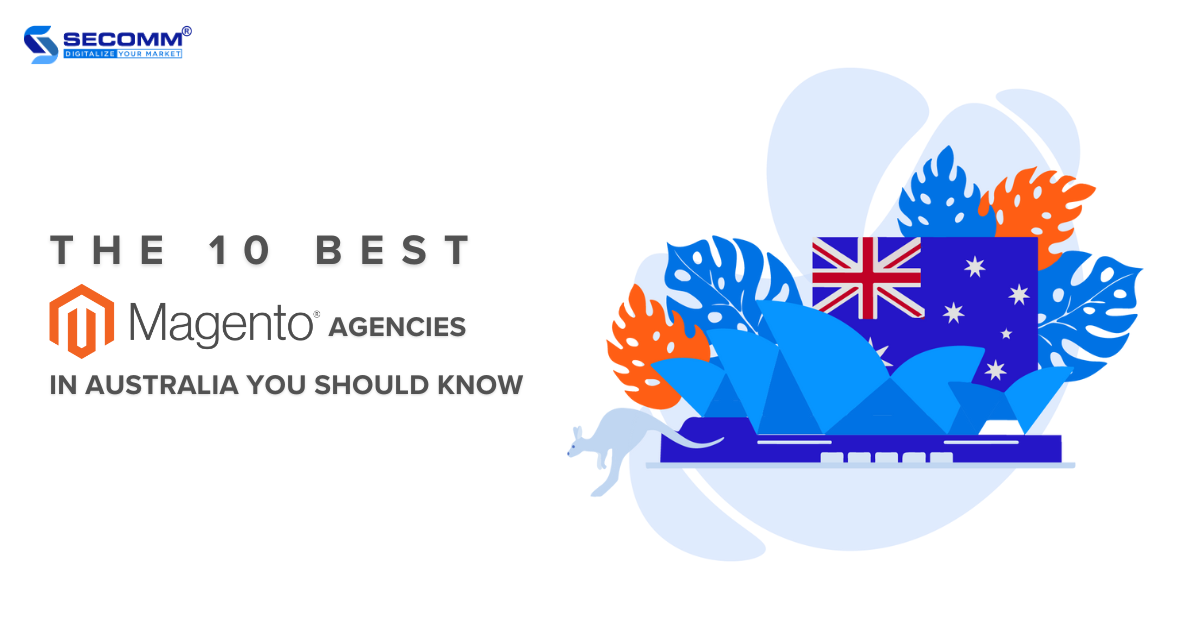
In recent years, the emergence of many Magento agencies has helped the Australian eCommerce market grow. These developers are experienced and trustworthy, not only Magento experts but also reliable companions, ensuring their clients succeed online.
In this article, let’s explore the top 10 Magento agencies in Australia, helping you find the right partner for your project.
Read more: Top 10 Magento eCommerce websites in Australia
Magento (now owned by Adobe Commerce) is an open-source system for building customized eCommerce websites. It is highly flexible and offers a range of powerful features to make website building and management more efficient.
From creating attractive and user-friendly interfaces to managing products, orders, and customers, Magento provides a comprehensive infrastructure to optimize the online shopping experience.
Partnering with Magento agencies can be beneficial in implementing your eCommerce project. Here are four essential reasons to consider working with a partner specialized in the Magento platform.
Magento agencies typically have teams of experts who deeply understand this platform. Most of these companies will participate in the Adobe Commerce Partners program, where the platform supports them regarding technical support, learning resources, commission earnings, and branding.
Furthermore, these agencies must demonstrate that they meet the standards to become official Magento partners. Therefore, partnering with them will help you launch your eCommerce websites quickly and optimize business performance by leveraging features and integrations.
Optimizing the performance of Magento websites is crucial to ensuring customers’ best shopping experience and increasing conversion rates. Professional Magento agencies can optimize the source code, improve page loading speed, and optimize checkout pages, helping businesses effectively attract and retain customers.
Partnering with a Magento development company can help save time and costs compared to building and managing an eCommerce website independently. This is especially true if you have limited time and must go live with your eCommerce website as soon as possible.
Working with such developers becomes even more worth considering. These agencies already have the tools, processes, and experience to deploy projects efficiently and quickly.
Magento’s open-source nature allows developers to help you integrate third-party applications and extend website functionality based on specific needs. Additionally, they can provide custom solutions and development extensions, ensuring your eCommerce operations continually evolve and meet market demands.
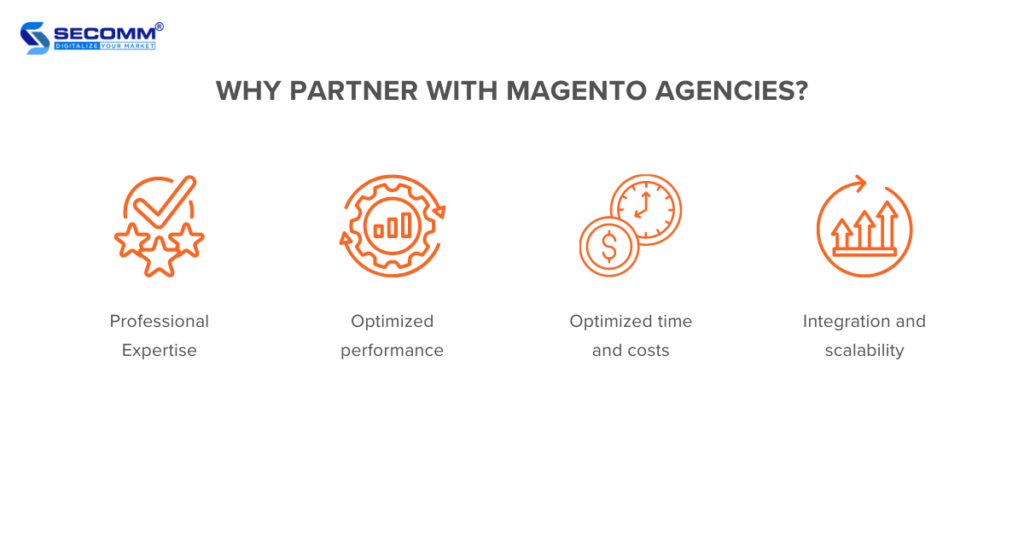
When collaborating with a Magento agency, choosing the right partner is crucial to ensure the success of the eCommerce project. Below are five core criteria to help you choose the right partner.
Any Magento agency must deploy eCommerce projects based on Magento, an open-source platform with superior customization and scalability. You must ensure the chosen developer has the knowledge and skills to deploy the Magento platform. They must also have a team of capable experts to build, customize, and optimize eCommerce websites based on specific requirements.
It isn’t easy to effectively leverage Magento’s customization and scalability to build an eCommerce website with shopping experiences tailored to Australians’ needs.
This requires technical skills, expertise in the Magento platform, and a deep understanding of the Australian eCommerce market. Therefore, the agency needs to understand the target audience, shopping behaviours, legal regulations, and other factors related to the unique business culture in this country.
Evaluating the projects previously implemented by Magento agencies is an effective way to measure their capabilities and experience. By examining past projects, you can assess their ability to solve specific challenges and whether the solutions proposed for each case are flexible and up-to-date with market development trends.
Evaluating and considering feedback from previous clients will benefit you in the decision-making process. You can search and verify reviews from various sources and clients to ensure objectivity and transparency. This is necessary to ensure that Magento agencies have the skills and experience required to complete the eCommerce project as requested.
After completing and launching the Magento website, technical issues must be addressed and supported. You must choose Magento agencies committed to providing quick support and continuous maintenance after the project. This ensures that the website remains stable, any technical errors are promptly addressed, and the latest platform version is kept secure and up-to-date.
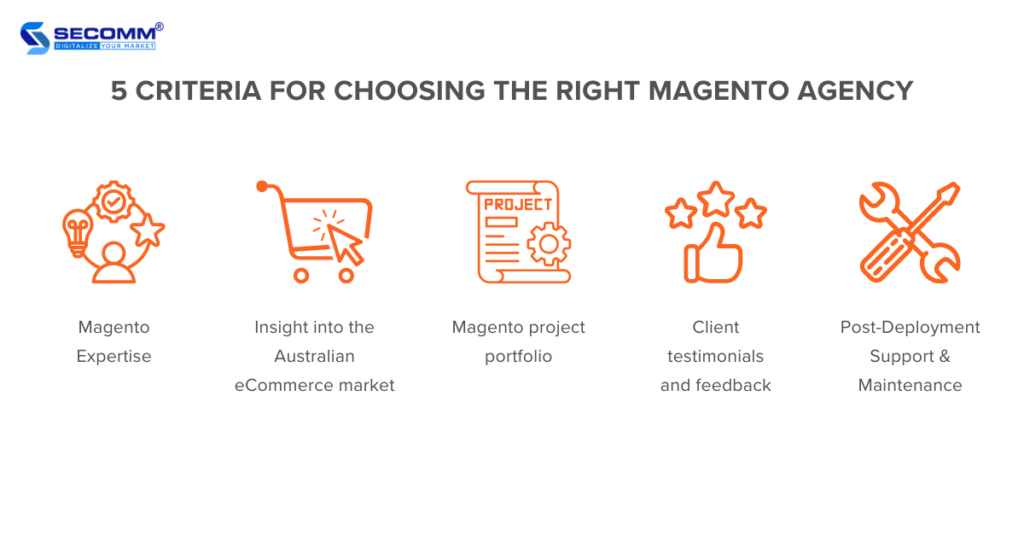
Below is a list of the top 10 Magento agencies in Australia, recognized for their experience and expertise in developing eCommerce websites on the Magento platform.
SECOMM is one of the leading Magento development partners in Australia. With over 10 years of experience, SECOMM boasts a highly experienced team with a deep understanding of the Australian eCommerce market.
The SECOMM team has successfully collaborated on and implemented a series of Magento projects with significant clients in Kangaroo, such as Laybyland, Trentham Estate, The Rod Shop, and Seconds Deals.
Leveraging Magento’s strengths, SECOMM helps its clients customize and expand various functionalities according to their specific needs and integrate with third-party tools and applications to optimize operations and deliver a unique customer experience.
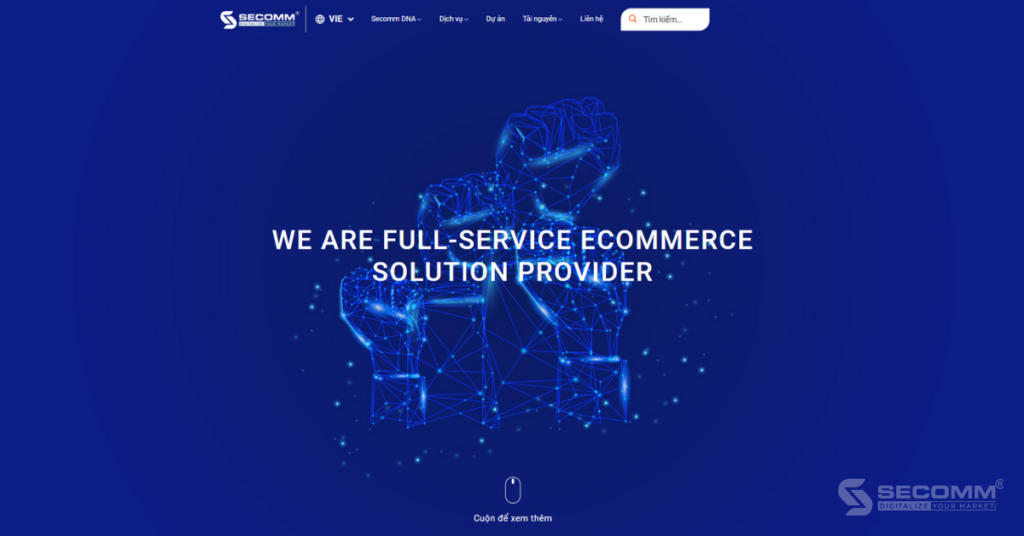
This company is renowned for its diverse eCommerce services, including solutions for building online stores on the Magento platform. WEBDESK SOLUTION is committed to providing professional technical support services during and after deployment.
Wiser Brand specializes in building and developing eCommerce websites targeting enterprises in Australia and New Zealand. The company holds prestigious certifications related to Magento and boasts a large team of experts with extensive experience.
Aron Web Solutions develops and expands rapidly into significant markets such as the UK, US, and India. Aron offers a variety of eCommerce solutions related to Magento, including Magento website design and development for mobile shopping applications.
Over the years, Webential has officially become one of the leading Magento agencies in Australia. In addition to Magento, Webential offers various flexible solutions, ensuring that all projects are implemented efficiently and professionally.
Magneto IT Solutions is a Magento agency with diverse experience across industries. They provide custom and professional solutions to meet the specific requirements.
In Australia, Acid Green is a leading eCommerce website developer in Magento and Shopify Plus. The team’s experience and expertise in open-source and SaaS platforms are sufficient to help the company maintain its position in the market.
Intuji provides eCommerce solutions for retail and B2B brands in Australia. Intuji’s strength lies in Magento and in leveraging various platforms and technologies to build custom eCommerce websites tailored to each business model.
This company provides services for eCommerce businesses in Australia, ranging from building online stores to mobile shopping applications. With its extensive experience, Enterprise Monkey can help develop customized shopping experiences using AR/VR and AI technologies.
Aussie Website has established its position as a reputable Magento agency in Melbourne and Australia in general. They are committed to providing flexible and innovative solutions to help you optimize your eCommerce operations.
The emergence of numerous Magento developers in Australia has opened up opportunities for businesses to build and develop eCommerce brand websites. By selecting partners based on certain evaluation criteria, you can ensure that projects are implemented more smoothly, professionally, and effectively.
Need more advice to make a decision? Contact SECOMM or call (+84)28 7108 9908 for a free consultation!
 5
5
 3,095
3,095
 0
0
 2
2Subscribe to get the latest eBook!
Hotline